New and Recent Publications about Handel
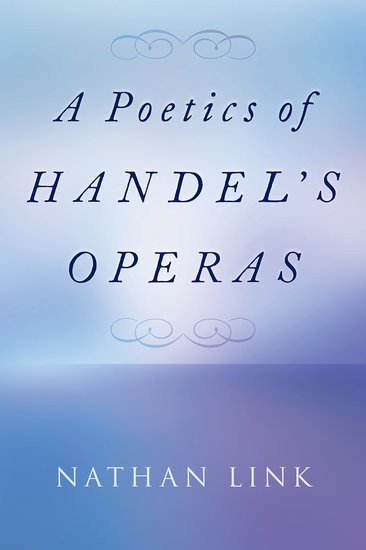 "What should we consider when thinking about the relationship between an onstage performance and the story the performance tells? A Poetics of Handel's Operas explores this question by analyzing the narratives of Handel's operas in relation to the rich representational fabric of performance used to convey them. Nathan Link notes that in most storytelling genres, the audience can naturally discern between a story and the way that story is represented: with film, for example, the viewer would recognize that a character hears neither her own voiceover nor the ambient music that accompanies it, whereas in discussions of opera, some audiences may be distracted by the seemingly artificial nature of such conventions as characters singing their dialogue. Link proposes that when engaging with opera, distinguishing between the performance we see and hear on the stage and the story represented offers a meaningful approach to engaging with and interpreting the work. "What should we consider when thinking about the relationship between an onstage performance and the story the performance tells? A Poetics of Handel's Operas explores this question by analyzing the narratives of Handel's operas in relation to the rich representational fabric of performance used to convey them. Nathan Link notes that in most storytelling genres, the audience can naturally discern between a story and the way that story is represented: with film, for example, the viewer would recognize that a character hears neither her own voiceover nor the ambient music that accompanies it, whereas in discussions of opera, some audiences may be distracted by the seemingly artificial nature of such conventions as characters singing their dialogue. Link proposes that when engaging with opera, distinguishing between the performance we see and hear on the stage and the story represented offers a meaningful approach to engaging with and interpreting the work.
Handel's operas are today the most-performed works in the Baroque opera seria tradition. This genre, with its intricate dramaturgy and esoteric conventions, stands to gain much from an investigation into the relationships between the onstage performance and the story to which that performance directs us. In his analysis, Link offers theoretical studies on opera and narratological theories of literature, drama, and film, providing rich engagement with Handel's work and what it conveys about the relationship between text, story, and performance."
David Ross Hurley: 'Handel's Transformative Compositional Practices: A Tale of Two Arias', Journal of Musicology 38/4 (2021), pp. 479-502. 10.1525/jm.2021.38.4.479
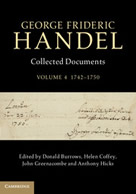 "The life and career of George Frideric Handel, one of the most frequently performed composers from the Baroque period, are copiously and intricately documented through a huge variety of contemporary sources. This multi-volume major publication is the most up-to-date and comprehensive collection of these documents. Presented chronologically in their original languages with English translations and with commentaries incorporating the results of recent research, the documents provide an essential and accessible resource for anyone interested in Handel and his music. In charting Handel's activities and the performance and reception of his music during his lifetime, the documents also offer valuable insights into broader eighteenth-century topics such as court life, theatrical history, public concerts and music publishing. Volume Four begins with the re-establishment of Handel's career in London following his return from Dublin in 1742, and covers the period to 1750 which saw the composition of a succession of his greatest English works for his oratorio seasons, including Samson, Semele, Belshazzar, Judas Maccabaeus and Solomon." "The life and career of George Frideric Handel, one of the most frequently performed composers from the Baroque period, are copiously and intricately documented through a huge variety of contemporary sources. This multi-volume major publication is the most up-to-date and comprehensive collection of these documents. Presented chronologically in their original languages with English translations and with commentaries incorporating the results of recent research, the documents provide an essential and accessible resource for anyone interested in Handel and his music. In charting Handel's activities and the performance and reception of his music during his lifetime, the documents also offer valuable insights into broader eighteenth-century topics such as court life, theatrical history, public concerts and music publishing. Volume Four begins with the re-establishment of Handel's career in London following his return from Dublin in 1742, and covers the period to 1750 which saw the composition of a succession of his greatest English works for his oratorio seasons, including Samson, Semele, Belshazzar, Judas Maccabaeus and Solomon."
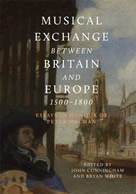 "This explores the exchange of music, musicians and musical practice between Britain and the Continent in the period c.1500—1800. Inspired by Peter Holman's research and performing activities, the essays in the volume develop the theme of exchange and dialogue through the lenses of people, practices and repertory and consider the myriad ways in which musical culture participated in the dynamic relationship between Europe and Britain. Key areas addressed are music and travel; music publishing; émigré musicians; performing practice; dissemination of music and musical practice; and instruments." "This explores the exchange of music, musicians and musical practice between Britain and the Continent in the period c.1500—1800. Inspired by Peter Holman's research and performing activities, the essays in the volume develop the theme of exchange and dialogue through the lenses of people, practices and repertory and consider the myriad ways in which musical culture participated in the dynamic relationship between Europe and Britain. Key areas addressed are music and travel; music publishing; émigré musicians; performing practice; dissemination of music and musical practice; and instruments."
Includes chapter by Donald Burrows: '"Before him stood sundry sweet Singers of this our Israel": The Chorus Singers for Handel's London Oratorio Performances', pp. 265—281
Händel-Jahrbuch 66 (Bärenreiter, 2020):
Silke Leopold: 'Von A(thalia) bis Z(enobia): Händels Galerie der starken Frauen', pp. 17—32
Elisabeth Birnbaum: '"So are they blest who fear the Lord": Händels biblische Frauengestalten', pp. 35—48
Sabine Volk-Birke: 'Geschlechterrollen in Händels Oratorien: Haben Frauen Handlungsspielräume?', pp. 49—73
Irmtraud Fischer: 'Gender "wildert in Texten": Zur Rezeption biblischer Frauenfiguren', pp. 75—86
Matthew Gardner: Female Virtue in Early English Oratorios: Handel' s Deborah', pp. 87—101
Natassa Varka: ''For Wisdom far renown' d': Jennens's Nitocris and her role in Belshazzar', pp. 103—113
Ellen T. Harris: 'Deranged, Defiant, Dutiful: Innocence in the face of death', pp. 115—136
Berta Joncus: 'Fixing her Reputation: Giulia Frasi and her Ranelagh Garden Concerts', pp. 137—180
Donald Burrows: 'Beyond Theodora. Handel' s oratorio soloists in the 1750s', pp. 181—196
Ina Knoth: 'Eine Kriegerin für die Londoner Opernbühne: Margherita Durastanti als Clelia in Muzio Scevola', pp. 197—214
John H. Roberts: Semiramide: Handel' s Unknown Queen', pp. 215—233
Reinhard Strohm: 'Weibliche Arientypen in der italienischen Oper der Händelzeit', pp. 235—252
Wendy Heller: 'Handel' s Women and the Art of Dissimulation: A Legacy from the Seicento', pp. 253—267
Ivan Ćurković: 'Pastoral disguise and identity conflict in Handel' s Atalanta', pp. 269—286
Graydon Beeks: '"Thy Hand, Dalinda": Characterization, Contrast and Maturity in Ariodante', pp. 287—294
Ruth Smith: '"Ho un gran cor": Dorinda' s great-heartedness', pp. 295—312
Florian Mehltretter: 'Il pastor fido – Decorum und Tragikomik unter Nymphen und Schäferinnen', pp. 313—324
Anke Charton: 'Amastre to Armida. Tropes of female agency in Handel' s operas', pp. 325—335
Elena Abbado: 'Rodrigo as seen by "Rodrigo": Staging and reception of Handel' s first Italian opera', pp. 339—368
Andrew V. Jones: 'A Handel footnote amplified' [new findings on copyists of Handel's continuo cantatas], pp.
369—390
Klaus-Peter Koch: 'Frühe Aufführungen von oratorischen Werken Händels in Außereuropa', pp. 391—403
(also the customary listings of performances, publications and recordings during 2019)
Göttinger Händel-Beiträge 21 (Vandenhoeck & Ruprecht, Göttingen, 2020)
- mostly the proceedings of a symposium on the topic 'Music and Melancholy in Handel's Enlightenment', held at Göttingen in 2019 -
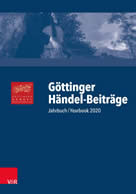 Melanie Wald-Fuhrmann: 'Musik und Melancholie:
Mit einer Anwendung auf Händels L'Allegro, il Penseroso ed il Moderato', pp. 7—32 Melanie Wald-Fuhrmann: 'Musik und Melancholie:
Mit einer Anwendung auf Händels L'Allegro, il Penseroso ed il Moderato', pp. 7—32
Andreas Waczkat: '"… and heal his wounded soul":
Die Heilung durch Musik in Händels Saul und ihr Kontext', pp. 33—40
Michael Thimann: 'Händel als neuer Orpheus:
Anmerkungen zur Musikikonographie der Frühen Neuzeit', pp. 41—56
Alexander Košenina: 'Saiten und Seelen:
Literarisch-anthropologische Harmonielehren zur Zeit Händels', pp. 57—70
Esma Cerkovnik: 'Benedetto Pamphilj und die Konversion:
Il Trionfo del Tempo e del Disinganno in neuem Licht', pp. 71—98
Wilhelm Krull: 'Das Ende vom Anfang?:
Der Erste Weltkrieg, die Wiederentdeckung Händels und das kurze 20. Jahrhundert'', pp. 99—118
Jonathan Rhodes Lee: 'Giulia Frasi: singer of sentiment',
Music & Letters (May 2020), pp. 1—35 doi:10.1093/ml/gcaa008
Donald Burrows: 'In Handel’s shadow: performances of Messiah in Dublin during the 1740s',
Musical Times, Volume 161 Issue 1 (Spring 2020), pp. 9—19
Ellen T. Harris: ''Master of the Orchester with a Sallary": Handel at the Bank of England',
Music & Letters, Volume 101 Issue 1 (February 2020), pp. 1—29 doi.org/10.1093/ml/gcz112
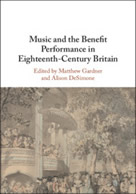 Introduction: Alison DeSimone and Matthew Gardner Introduction: Alison DeSimone and Matthew Gardner
Part I. Musical Benefits in the London Theatre: Networks and Repertories
1. Kathryn Lowerre: 'Risks and rewards: benefits and their financial impact on actors, authors, singers, and other musicians in London, c. 1690—1730'
2. Olive Baldwin and Thelma Wilson: 'With several entertainments of singing and dancing: London Theatre benefits, 1700—1725'
3. Robert G. Rawson: 'Concertos 'upon the stage' in early Hanoverian London: the instrumental counterpart to opera Seria'
4. Vanessa Rogers: 'Cobblers, country fairs, and cross-dressing: benefits and the development of ballad opera'
Part II. Beyond London: Mimicry or Originality?
5. Roz Southey: 'Benefit concerts in the North of England: more than just musical entertainment'
6. Stefanie Acquavella-Rauch: 'Amateur music-making, professional musicians, and benefit concerts in Edinburgh'
7. Amanda Eubanks Winkler: 'English music in benefit concerts: Henry Purcell and the next generation'
8. Alison DeSimone: 'Strategies of performance: benefits, professional singers, and Italian opera in the early eighteenth century'
Part IV. Charity Benefits
9. Tríona O'Hanlon: 'The Mercer's Hospital Charity Services: music charity in eighteenth-century Dublin'
10. Matthew Gardner: 'English Oratorio and charity benefits in mid-eighteenth-century London'
Part V. The Role of the Audience
11. John Irving: 'Encountering 'the most extraordinary prodigy': meeting Master Mozart in Georgian London'
12. David Hunter: 'Benefits: Cui Bono?
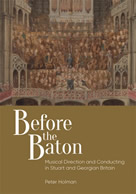 "This investigates the ways large-scale music was directed or conducted in Britain before baton conducting took hold in the 1830s. After surveying practice in Italy, Germany and France from Antiquity to the eighteenth century, the focus is on direction in two strands of music making in Stuart and Georgian Britain: choral music from Restoration cathedrals to the oratorio tradition deriving from Handel, and music in the theatre from the Jacobean masque to nineteenth-century opera, ending with an account of how modern baton conducting spread in the 1830s from the pit of the Haymarket Theatre to the Philharmonic Society and to large-scale choral music. Part social and musical history based on new research into surviving performing material, documentary sources and visual evidence, and part polemic intended to question the use of modern baton conducting in pre-nineteenth-century music, Before the Baton throws new light on many hitherto dark areas, though the heart of the book is an extended discussion of the evidence relating to Handel's operas, oratorios and choral music. Contrary to near-universal modern practice, he mostly preferred to play rather than beat time." "This investigates the ways large-scale music was directed or conducted in Britain before baton conducting took hold in the 1830s. After surveying practice in Italy, Germany and France from Antiquity to the eighteenth century, the focus is on direction in two strands of music making in Stuart and Georgian Britain: choral music from Restoration cathedrals to the oratorio tradition deriving from Handel, and music in the theatre from the Jacobean masque to nineteenth-century opera, ending with an account of how modern baton conducting spread in the 1830s from the pit of the Haymarket Theatre to the Philharmonic Society and to large-scale choral music. Part social and musical history based on new research into surviving performing material, documentary sources and visual evidence, and part polemic intended to question the use of modern baton conducting in pre-nineteenth-century music, Before the Baton throws new light on many hitherto dark areas, though the heart of the book is an extended discussion of the evidence relating to Handel's operas, oratorios and choral music. Contrary to near-universal modern practice, he mostly preferred to play rather than beat time."
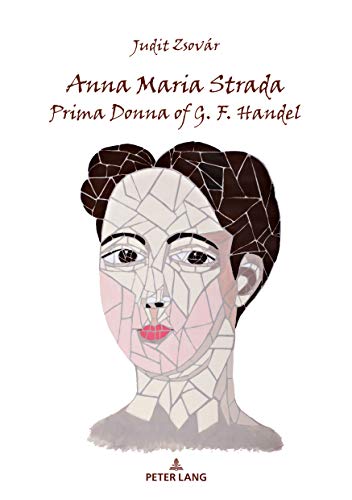 "George Frideric Handel’s longest continuous collaboration with a leading singer took place between 1729 and 1737 with Anna Maria Strada del Pò (1703–1775), a soprano who may have sung ‘entirely di petto’; that is, with a chest-like vocal production in the head range as well: powerfully and sonorously. The investigation of her peculiar vocal features and career, in connection with the music written for her by Handel and other composers, involved musicological research methods and findings of the historically informed performance practice. The conclusions rest on three main pillars: musical sources; surviving descriptions of her singing; and period treatises, completed with the author’s practical experiences as a classical singer" "George Frideric Handel’s longest continuous collaboration with a leading singer took place between 1729 and 1737 with Anna Maria Strada del Pò (1703–1775), a soprano who may have sung ‘entirely di petto’; that is, with a chest-like vocal production in the head range as well: powerfully and sonorously. The investigation of her peculiar vocal features and career, in connection with the music written for her by Handel and other composers, involved musicological research methods and findings of the historically informed performance practice. The conclusions rest on three main pillars: musical sources; surviving descriptions of her singing; and period treatises, completed with the author’s practical experiences as a classical singer"
Newsletter of the American Handel Society, Volume 35 Number 1 (Spring 2020):
Graydon Beeks: 'John Langshaw as a Handel copyist', pp. 1—3
Ellen T. Harris: 'Handel and the Bank of England',
Bank Underground, blog written by staff and guest researchers at the Bank of England (8 November 2019)
Minji Kim,'Handel’s Choruses of "Praise and Thanksgiving after Victory" and Non nobis Domine',
Early Music, Volume 47 Issue 4 (November 2019), pp. 551—568 doi.org/10.1093/em/caz070
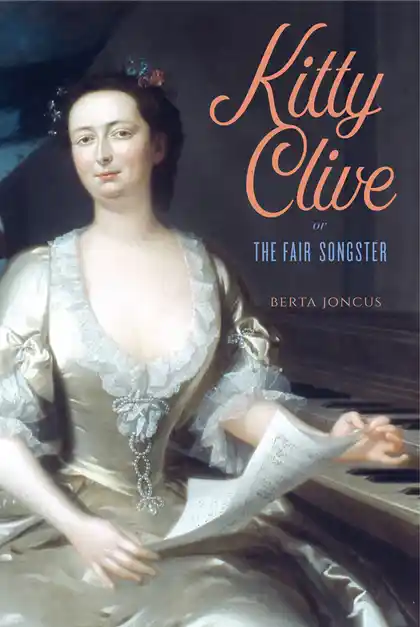 " Kitty Clive (1711–1785) was a top London stage star. Singing powered her ascent and, for twenty years, was foundational to her success as she came to dominate spoken as well as musical comedy. Her protean powers transfixed audiences, whether in low-style productions or in works by masters like Purcell, Shakespeare, and Dryden. Celebrities such as Handel and Henry Fielding wrote vehicles for her. " Kitty Clive (1711–1785) was a top London stage star. Singing powered her ascent and, for twenty years, was foundational to her success as she came to dominate spoken as well as musical comedy. Her protean powers transfixed audiences, whether in low-style productions or in works by masters like Purcell, Shakespeare, and Dryden. Celebrities such as Handel and Henry Fielding wrote vehicles for her.
Clive's career was unique. Despite a sometimes awkward biography - her father was a disgraced Irish Catholic; she defied managers; her marriage was almost certainly a social ruse and her 'husband' a homosexual - her musical voice helped her to become the champion of British song, of patriotism, and of propriety. Yet in the 1740s, critical opinion turned against Clive and the financial power she wielded. Salvaging her career with David Garrick's help, Clive gutted her legacy. She quit serious song and took to caricaturing herself on stage, winning back audiences by disparaging her earlier achievements. Altering works mid-performance, creating and re-shaping stage genres, and leveraging press coverage while seeming not to, she was above all a shrewd manager and a fascinating stage artist.
Clive's career reveals to us gorgeous song otherwise lost and perspectives previously unknown. For music historians, musicologists, theatre scholars, and anyone curious about performance history and star production in eighteenth-century Britain, her story is not to be missed.."
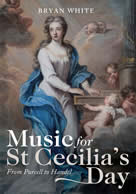 "In 1683 English court musicians and the Musical Society of London joined forces to initiate annual observations of St Cecilia's Day (22 November), celebrating the occasion with a feast and the performance of specially composed musical odes. The most prominent composers and poets of the age wrote for these occasions, including Henry Purcell, John Blow, John Dryden and William Congreve, and the best musicians of the city, primarily drawn from the court music, undertook the performances. After a decade of celebrations, a church service was added before the feast, and elaborate vocal and instrumental music was performed. At the same time, celebrations of St Cecilia's Day began to spread widely throughout the British Isles. Though the annual London celebrations came to an end after 1700, Cecilian poetry continued to inspire new musical settings in the eighteenth century, including works by Pepusch, Greene, Boyce and, most notably, Handel.
This book examines the social, cultural and religious significance of celebrations of St Cecilia's Day in the British Isles and explores the music and poetry that originated from them." "In 1683 English court musicians and the Musical Society of London joined forces to initiate annual observations of St Cecilia's Day (22 November), celebrating the occasion with a feast and the performance of specially composed musical odes. The most prominent composers and poets of the age wrote for these occasions, including Henry Purcell, John Blow, John Dryden and William Congreve, and the best musicians of the city, primarily drawn from the court music, undertook the performances. After a decade of celebrations, a church service was added before the feast, and elaborate vocal and instrumental music was performed. At the same time, celebrations of St Cecilia's Day began to spread widely throughout the British Isles. Though the annual London celebrations came to an end after 1700, Cecilian poetry continued to inspire new musical settings in the eighteenth century, including works by Pepusch, Greene, Boyce and, most notably, Handel.
This book examines the social, cultural and religious significance of celebrations of St Cecilia's Day in the British Isles and explores the music and poetry that originated from them."
Robert L. Marshall: ‘Bach, Handel, and the Harpsichord', in: The Cambridge Companion to the Harpsichord, ed. Martin Kroll (Cambridge University Press, 2019), pp.
263—298
The Handel Institute Newsletter,
Volume 30 Number 2 (Autumn 2019):
Judit Zsovár: 'Baroque prototypes of the soprano sfogato?'
Carlo Lanfossi: 'Listening to Didone abbandonata'
Michael Burden: 'But which song?: a causerie on the database The Italian Opera Aria on the London Stage 1705—1801'
Colin Timms: 'Did Handel borrow from Leclair?'
[and report by Natassa Varka on the 2019 American Handel Society conference at Indiana University]
Newsletter of the American Handel Society, Volume 34 Number 2 (Summer 2019):
Luke Howard: 'Ebeneezer Prout (1835—1909) and Messiah: an overdue assessment', pp. 1—3
Händel-Jahrbuch 65 (Bärenreiter, 2019):
Thomas Seedorf: 'Händel, der vertraute Fremde?', pp. 17—31
Reinhard Strohm: 'Türken, Inder, Indianer: Abstufungen des Zivilisationsmythos im Musiktheater der Händelzeit', pp. 35—47
Matthew Gardner: 'Italian Opera for the English Taste: Handel's Early London Operas 1711—1715', pp. 49—60
Hans Dieter Clausen: 'Cleopatra auf dem Parnass', pp. 61 pp. 17—70
Donald Burrows: 'To set the Italian performers in the most contemptible Light possible, they are invidiously represented as a Set of Beggars'. The Controversy about the London opera company in 1745', pp. 71—84
Berthold Over: 'Paradigmen musikalischer Mobilität: Händels Pasticci', pp. 85—103
Ivan Ćurković: 'The Duets of Alessandro Scarlatti and George Frideric Handel: Two individual Paths and Some Intersections', pp. 105—119
Graydon Beeks: 'Sir George Smart's Performances of Messiah', pp. 121—132
Juliane Riepe: 'Deutsche Ideologome der Musikermigration am Beispiel Georg Friedrich
Händels', pp. 133—168
John H. Roberts: 'Rosenmüller in Italy: Traces of a Shadowed Life', pp. 169—184
Margaret Scharrer: 'Zwischen Orient und Okzident: Musikerreisen abseits europäischer Wege', pp. 185—203
David Vickers: 'Giulia Frasi in English music', pp. 205—232
Livio Marcaletti: 'Alexander der Große, Bacchus und die Begegnung mit dem Orient in der venezianischen Opera vor Händel', pp. 233—244
Alison C. DeSimone: '"Lov'd at home and fear'd abroad": The War of the Spanish Succession in English Song and On the Stage', pp. 245—257
Jana Spáčilová: 'Zur Händel-Rezeption in dem böhmischen Ländern in der ersten Hälfte des 18. Jahrhunderts', pp. 261—273
Luca Della Libera: '"Stante sia opera del famosissimo sonatore": New documents on Handel in Flornece in 1707 and on the Florentine music life between 1705 and 1707', pp. 275—293
Andrew V. Jones: 'A Handel copyist identified', pp. 295—340
(also the customary listings of performances, publications and recordings during 2018)
Göttinger Händel-Beiträge 20 (Vandenhoeck & Ruprecht, Göttingen, 2019)
- mostly the proceedings of a symposium on the topic 'Metropolitan London', held at Göttingen in 2018 -
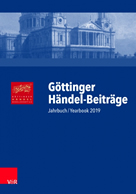 Andreas Gestrich: 'Händels London. Leben in der Musikmetropole des 18. Jahrhunderts', pp. 7—25 Andreas Gestrich: 'Händels London. Leben in der Musikmetropole des 18. Jahrhunderts', pp. 7—25
Gesa zur Nieden: '"Native" - "foreign". Zum Nexus von Sozialstruktur und Rezeptionsästhetik in der Musikmetropole London', pp. 27—44
Bernard Jahn: 'Beggar's Opera und Royal Academy of Music als Konkurrenz? Die Situation der Londoner Theaterunternehmen im europäischen Vergleich', pp. 45—59
Natasha Loges: 'Händels Musik und Programmgestaltung in Londons Kritallpalast, 1859—1874', pp. 61—76
Hanna Walsdorf: '"Come, ever-smiling liberty":
Händels Judas Maccabaeus (1747), der Krieg und der Frieden', pp. 77—93
Patrick J. Rogers: 'Handel Opera à la Mode: Samuel Arnold's Giulio Cesare Pasticcio in Performance'', pp. 95—136
Josef Johannes Schmid: 'Westminster, the King and Mr. Handel', in: Sakralisierungen des Herrschers an europäischen Höfen: Bau - Bild - Ritual - Musik (1648—1740), ed. Herbert Karner, Eva-Bettina Krems, Jens Niebaum, Werner Telesko (Schnell + Steiner, Regensburg, 2019), pp.
281—98
David Hunter: 'Handel manuscripts and the profits of slavery: the "Granville" Collection at the British Library and the first performing score of Messiah reconsidered',
Notes, Volume 76 (2019), pp. 27—37
Carlo Lanfossi: 'Ghosting Agrippina: Genealogies of Performance in Italian Baroque Opera',
Journal of Musicology 36/1 (2019), pp. 1—38
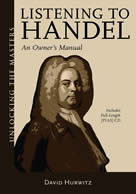 "[This] takes the curious listener through his entire output, from his earliest works in Italy, through his more than 40 operas, and including the famous English oratorios on which his reputation largely rests. Along the way it examines his orchestral music, the pieces he wrote for England's lavish royal ceremonies, and his surprisingly limited production of sacred music. Just as important, the book surveys and recommends recordings of all of the music discussed, so that listeners can acquire a music collection of whatever depth suits them best, while the included CD features top-notch recordings from the Harmonia Mundi label of a wide range of Handel's music in all of the major media in which he worked, both vocal and instrumental." "[This] takes the curious listener through his entire output, from his earliest works in Italy, through his more than 40 operas, and including the famous English oratorios on which his reputation largely rests. Along the way it examines his orchestral music, the pieces he wrote for England's lavish royal ceremonies, and his surprisingly limited production of sacred music. Just as important, the book surveys and recommends recordings of all of the music discussed, so that listeners can acquire a music collection of whatever depth suits them best, while the included CD features top-notch recordings from the Harmonia Mundi label of a wide range of Handel's music in all of the major media in which he worked, both vocal and instrumental."
Amanda Eubanks Winkler: '"Armida's Picture we from Tasso Drew"?: The Rinaldo and Armida Story in Late-Seventeenth- and Early-Eighteenth-Century English Operatic Entertainments', in: Music, Myth and Story in Medieval and Early Modern Culture, ed. Katherine Butler and Samantha Bassler (Boydell & Brewer, 2019), pp.
241—258
The Handel Institute Newsletter,
Volume 30 Number 1 (Spring 2019):
Olive Baldwin and Thelma Wilson: 'Handel beating time in Ipswich: Messrs Moore's Superb Musical Machine'
Colin Timms: 'Did Handel borrow from Leclair?'
[and report by Natassa Varka on the 2019 American Handel Society conference at Indiana University]
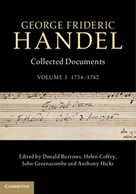 "The life and career of George Frideric Handel, one of the most frequently performed composers from the Baroque period, are copiously and intricately documented through a huge variety of contemporary sources. This multi-volume major publication is the most up-to-date and comprehensive collection of these documents. Presented chronologically in their original languages with English translations and with commentaries incorporating the results of recent research, the documents provide an essential and accessible resource for anyone interested in Handel and his music. This volume begins with Handel's move to the Covent Garden theatre, during the period of his competition with the Opera of the Nobility, and ends with his season of oratorio performances in Dublin. These years saw the composition of Italian operas including Ariodante, Alcina and Serse but also of the major English works Alexander's Feast, Saul and Messiah." "The life and career of George Frideric Handel, one of the most frequently performed composers from the Baroque period, are copiously and intricately documented through a huge variety of contemporary sources. This multi-volume major publication is the most up-to-date and comprehensive collection of these documents. Presented chronologically in their original languages with English translations and with commentaries incorporating the results of recent research, the documents provide an essential and accessible resource for anyone interested in Handel and his music. This volume begins with Handel's move to the Covent Garden theatre, during the period of his competition with the Opera of the Nobility, and ends with his season of oratorio performances in Dublin. These years saw the composition of Italian operas including Ariodante, Alcina and Serse but also of the major English works Alexander's Feast, Saul and Messiah."
Sara E. Eckerson: 'The Material of the Servant: Theology and Hermeneutics in Handel's Samson',
Yale Journal of Music and Religion, Volume 4 Number 2 (2018), pp. 1—32
Paul McMahon: 'Darkness and Light: Handel's Rhetorical Vocal Writing in the English oratorio Samson',
Journal of Music Research online, volume 8 (2018)
Emilia Pelliccia: 'Francesco Borosini (ca. 1690 – nach 1756): Leben und Karriere eines Tenors im frühen Settecento',
Musicologica Brunensia (2018), pp. 109—121
Pierre Degott: 'La construction du genre : contraltos et castrats dans la production lyrique haendélienne',
Études Épistémè, volume 34 (2018)
Kenneth Nott: 'The synthesis of biblical and operatic styles in Handel's Jephtha',
Journal of Musicological Research, Volume 37 Issue 4 (2018), pp. 300—316
Hans Joachim Marx: 'Über das Händel-Porträt aus dem Besitz von Charles Burney',
Imago Musicae, No. 30 (2018), pp. 215—219
The Handel Institute Newsletter,
Volume 29 Number 2 (Autumn 2018):
Michael Talbot: 'Thomas Newburgh and his poem on Handel's blindness'
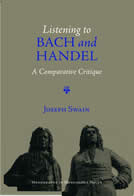 "a work of traditional music criticism ... [that] asks why these two German composers, born less than one month and 125 kilometers apart—cultural twins—could compose so differently from each other as well as their colleagues and yet both achieve universal acclaim the greatest exponents of the Baroque. Finding even partial answers to this question naturally deepens readers’ knowledge and appreciation of their art, and thereby amplifies the experience of listening to it." "a work of traditional music criticism ... [that] asks why these two German composers, born less than one month and 125 kilometers apart—cultural twins—could compose so differently from each other as well as their colleagues and yet both achieve universal acclaim the greatest exponents of the Baroque. Finding even partial answers to this question naturally deepens readers’ knowledge and appreciation of their art, and thereby amplifies the experience of listening to it."
Dennis Malfatti: 'Handel's Saul: the Apotheosis of Baroque Music-Theatre',
The Choral Journal, Vol. 58, No. 9 (April 2018), pp. 6—21
The Handel Institute Newsletter,
Volume 29 Number 1 (Spring 2018):
Donald Burrows: 'Manuscript librettos of works by Handel in the Larpent Collection'
[also reports by recipients of research grants Alison DeSimone and Natassa Varka]
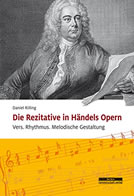 "The recitative ... plays an important role in opera of Handel's time: with its manifestations of monologue and dialogue, it serves to further develop the plot, while arias, duets and ensembles primarily express the feelings developed in the recitative.In his book, illustrated with numerous musical examples, Daniel Rilling explores the question of the function of recitative in Handel. The compositional means in the setting of the libretto available to him are considered in contrast as well as interaction with existing linguistic accentuations of the opera text. The analysis of the musical interpretation also takes place before the context of the location in the dramatic event. It becomes clear that the recitatives are by no means the "boring" prose of the opera, but an important lifeline." "The recitative ... plays an important role in opera of Handel's time: with its manifestations of monologue and dialogue, it serves to further develop the plot, while arias, duets and ensembles primarily express the feelings developed in the recitative.In his book, illustrated with numerous musical examples, Daniel Rilling explores the question of the function of recitative in Handel. The compositional means in the setting of the libretto available to him are considered in contrast as well as interaction with existing linguistic accentuations of the opera text. The analysis of the musical interpretation also takes place before the context of the location in the dramatic event. It becomes clear that the recitatives are by no means the "boring" prose of the opera, but an important lifeline."
Mariateresa Dellaborra: 'Giacomelli maestro di Händel?: Il caso di Lucio Papirio dittatore (Londra, 1732)', in: Geminiano Giacomelli dalla corte dei Farnese alla scena internazionale, ed. Mariateresa Dellaborra, Patrizia Florio and Gugliemo Pianigiani (Edizioni ETS, Pisa, 2018), pp.
41—64
Sigrid T'Hooft: ‘Barockregie heute: Eine Fallstudie anhand her Inszenierung von Händels Imeneo bei den Internationalen Händel-Festpielen Göttingen in May 2016', in: Spettacolo barocco! Performanz, Translation, Zirkulation, ed. Andrea Sommer-Mathis, Elisabeth Großegger and Katharina Wessely (Hollitzer Wissenschaftsverlag, Vienna, 2018), pp.
241—54
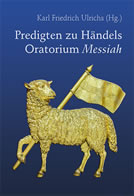 "The compilation of Old Testament and Pauline texts by Charles Jennens and Handel's touching melodies are an inspiration for sermons on central themes of faith and on various occasions of the church year. This is shown by this collection of 34 sermons on Messiah by renowned preachers from Germany, Sweden, South Africa and the USA. The different sermons are connected by the fact that they use the music not as a mere illustration for preaching statements, but as an access to the sermon text and as an expression of faith. By using almost all of the oratorio's pieces in the sermons, there is also a spiritual commentary on the Messiah. The sermons are framed by an introduction to the history of music and detailed considerations on the genre of the music sermon." "The compilation of Old Testament and Pauline texts by Charles Jennens and Handel's touching melodies are an inspiration for sermons on central themes of faith and on various occasions of the church year. This is shown by this collection of 34 sermons on Messiah by renowned preachers from Germany, Sweden, South Africa and the USA. The different sermons are connected by the fact that they use the music not as a mere illustration for preaching statements, but as an access to the sermon text and as an expression of faith. By using almost all of the oratorio's pieces in the sermons, there is also a spiritual commentary on the Messiah. The sermons are framed by an introduction to the history of music and detailed considerations on the genre of the music sermon."
Newsletter of the American Handel Society, Volume 33 Number 2 (Summer 2018):
Kenneth Nott: 'Handel's blindness and its effect on his composing'', pp. 1—3
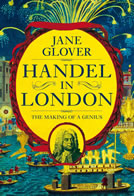 "Handel in London tells the story of a young German composer who in 1712, followed his princely master to London and would remain there for the rest of his life.
That master would become King George II and the composer was George Frideric Handel. ...
Jane Glover, who has conducted Handel’s work in opera houses and concert halls throughout the world, ... [tells] a story of music-making and musicianship, of practices and practicalities, but also of courts and cabals, of theatrical rivalries and of eighteenth-century society. It is also, of course, the story of some of the most remarkable music ever written, music that has been played and sung, and loved, in this country – and throughout the world – for three hundred years." "Handel in London tells the story of a young German composer who in 1712, followed his princely master to London and would remain there for the rest of his life.
That master would become King George II and the composer was George Frideric Handel. ...
Jane Glover, who has conducted Handel’s work in opera houses and concert halls throughout the world, ... [tells] a story of music-making and musicianship, of practices and practicalities, but also of courts and cabals, of theatrical rivalries and of eighteenth-century society. It is also, of course, the story of some of the most remarkable music ever written, music that has been played and sung, and loved, in this country – and throughout the world – for three hundred years."
Händel-Jahrbuch 64 (Bärenreiter, 2018):
Edwin Werner: 'Fragen zur Authentizität von Porträts Georg Friedrich Händels', pp. 17—42
Susanne Spiegler: 'Georg Friedrich Händel in Zeiten des Kalten Krieges. Facetten seiner Instrumentalisierung in der DDR', pp. 45—54
Annette Landgraf: 'Händels Ankläger und seine Verteidiger', pp. 55—69
Andreas Waczkat: 'Imitatio und Aemulatio: Die Brockes-Passion HWV 48 als stilprägendes Vorbild der englischen Oratorien?', pp. 71—81
Rainer Kleinertz: 'Entlehnung und Erkenntnis. Zu einem methodologischen Problem der Händelforschung', pp. 83—95
Roberto Scoccimarro: 'Zwischen Spätbarock und "stile moderno": Händels Entlehnungen aus italienischen Bühnenwerken am Beispiel der Opern Arianna in Creta und Faramondo', pp. 97—122
Panja Mücke: 'Entwickelnde Improvisation? Händels Opern zwischen Exzerpt und Entlehnung', pp. 123—133
Reinmar Emans: 'Zwischen Zitaten "a mente" und Sammlung von Exempla classica', pp. 135—147
Graydon Beeks: 'Handel's Reuse of Material from his Italian Psalms in his
Cannons Anthems, pp. 149—154
Donald Burrows: 'From St Lawrence's to St James's: the A major Te Deum (HWV 282)
and Handel's recomposition of Cannons music for the Chapel Royal', pp. 155—164
Matthew Gardner: 'Borrowing in Deborah: Convenience or Careful Selection?', pp. 165—178
Teresa Ramer-Wünsche: 'Händels Entlehnungsverfahren unter Berücksichtigung des Affektgehalts in seiner Serenata Parnasso in festa am Beispiel der Übernahmen aus Athalia', pp. 179—195
Silas Wollston: 'A continuum of creative refinement: Handel's use of pre-existing material in the Ode for St Cecilia's Day and the Twelve Grand Concertos, op. 6', pp. 197—206
Jonathan Rhodes Lee: 'From Giuseppe to Joseph: A Possible New Borrowing Source for the Music of Joseph and his Brethren', pp. 207—236
Mark Risinger: 'Types of Reuse and Adaptation in Handel's Later Works', pp. 237—263
John H. Roberts: 'Handel's Fugal Borrowing and the Concerto madrigalesco of Ercole Bernabein', pp. 265—297
Wolfram Enßlin: 'Zwei Originalgenies als Plagiatoren? Carl Philipp Emanuel Bach,
Georg Friedrich Händel und ihre Bearbeitungspraxis im Vergleich', pp. 299—319
Julia Ronge: 'Händels Lorbeerkranz. Beethoven rezipiert den "größten Componisten, der je gelebt hat"', pp. 335—366
John H. Roberts: 'Tu fedel? tu costante?: Two Versions of a Handel Cantata', pp. 207—236
Hans Dieter Clausen: 'Die Opernpartitur als "Werk"', pp. 367—385
Paul van Reijen: 'Händeliana in einem Amsterdamer Klavierbuch (1752)', pp. 387—402
Edwin Werner: '"G. F. HANDEL … By WOLFFGANG" – Eine Replik zu den Ausführungen von Hans Joachim Marx über das Händel-Porträt im
Scenkonstmuseet Stockholm', pp. 403—413
(also the customary listings of performances, publications and recordings during 2017)
Göttinger Händel-Beiträge 19 (Vandenhoeck & Ruprecht, Göttingen, 2018)
- mostly the proceedings of a symposium on the topic 'Barthold Heinrich Brockes und die Musik', held at Göttingen in 2017 -
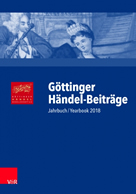 Jan Philipp Reemtsma: '"Das abgedruckte Bild von Bäumen und vom Grase" oder Allerlei Atheismus im Gotteslob. Gedanken bei der Lektüre von Brockes' Gedichten'', pp. 9—32 Jan Philipp Reemtsma: '"Das abgedruckte Bild von Bäumen und vom Grase" oder Allerlei Atheismus im Gotteslob. Gedanken bei der Lektüre von Brockes' Gedichten'', pp. 9—32
Cord-Friedrich Berghahn: '"Durch Töne binden und vermählen": Barthold Heinrich Brockes und die Musik', pp. 33—48
Claus-Dieter Osthövener: 'Aufgeklärte Passion. Barthold Heinrich Brockes als Oratoriendichter', pp. 49—63
Ute Poetzsch: '"Teure Freunde" - Georg Philipp Telemann und Barthold Heinrich Brockes', pp. 65—76
Joachim Kremer: 'Naturbetrachtung statt Wissenschaft? Händels Neun deutsche Arien HWV 202—210 und "ihre ganz andere Art"', pp. 77—92
Andreas Waczkat: 'Händels Neun deutsche Arien HWV 202—210 als "Frühlings-Cantaten"', pp. 93—102
Thomas McGeary: 'The Earl of Hertford, Handel, and the 1742—1743 and 1743—1744 opera seasons',
Early Music,
Volume 46 Number 1 (February 2018), pp. 123—130
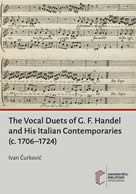 "The vocal duets of G. F. Handel are distinguished by a greater musical and dramaturgical diversity compared to the duets of his contemporaries, but this diversity has not yet been systematically examined in different contexts. This study investigates them in two genre traditions, that of the chamber duet and that of the so-called “dramatic duet”, a component of genres such as opera, cantata and serenata. It concentrates on London in the period 1706–1724 in order to explore to what extent Handel's treatment of duets differs from the contributions by his Italian contemporaries, who were either active in London at the time (e. g. G. Bononcini) or whose works were performed parallel to his." "The vocal duets of G. F. Handel are distinguished by a greater musical and dramaturgical diversity compared to the duets of his contemporaries, but this diversity has not yet been systematically examined in different contexts. This study investigates them in two genre traditions, that of the chamber duet and that of the so-called “dramatic duet”, a component of genres such as opera, cantata and serenata. It concentrates on London in the period 1706–1724 in order to explore to what extent Handel's treatment of duets differs from the contributions by his Italian contemporaries, who were either active in London at the time (e. g. G. Bononcini) or whose works were performed parallel to his."
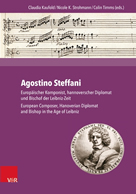 "This interdisciplinary volume considers all three facets of Steffani’s work – the musical, the political and the ecclesiastical. Its 19 essays present the latest state of knowledge on this internationally rediscovered multi-talented cosmopolitan, who has long been attracting the attention of musicologists and early modern and ecclesiastical historians and is now exciting also the interest of performers and public." "This interdisciplinary volume considers all three facets of Steffani’s work – the musical, the political and the ecclesiastical. Its 19 essays present the latest state of knowledge on this internationally rediscovered multi-talented cosmopolitan, who has long been attracting the attention of musicologists and early modern and ecclesiastical historians and is now exciting also the interest of performers and public."
Contributions include John H. Roberts, ‘Steffani’s Hanover Operas as Handel Sources’; Helen Coffey, ‘Opera for the House of Brunswick-Lüneburg: Italian Singers at the Hanover Court’; Matthew Gardner, ‘Steffani’s Italian Opera Singers in Hanover: Recruitment and Vocal Style’; and Colin Timms, ‘Steffani and his Church Music’
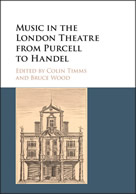 "This book is concerned with a hundred years of musical drama in England. It charts the development of the genre from the theatre works of Henry Purcell (and his contemporaries) to the dramatic oratorios of George Frideric Handel" "This book is concerned with a hundred years of musical drama in England. It charts the development of the genre from the theatre works of Henry Purcell (and his contemporaries) to the dramatic oratorios of George Frideric Handel"
Essays directly relevant to Handel include chapters on Dryden's Alexander's Feast (Andrew Pinnock and Bruce Wood), classical subjects and antiquity in the London operas (Peter Brown and Reinhard Strohm), the adaptation of Metastasio's libretto in Poro (Graham Cummings), the fusion of genres evident in Deidamia (Sarah McCleave), musical settings of seventeenth-century poets in the 1730s and 1740s (Matthew Gardner), two essays on L'Allegro, il Penseroso ed il Moderato (Ruth Smith and Matthew Badham), a study of accompanied recitatives in Handel's oratorios (Liam Gorry), and the advent of Jennens' and Handel's scriptural oratorios (John H. Roberts).
Full list of contents and PDF of front matter
Natassa Varka: '"Departed ghosts in living forms appear": Abiathar, Doeg, and Jennens’s conception of Saul',
Early Music,
Volume 45 Number 4 (December 2017), pp. 629—639
Brian Chapman: 'Carl Linnaeus, Philip Miller and the librettist of Handel's Solomon',
Musical Times, Volume 158 Number 1941 (Winter 2017), pp. 71—74
Newsletter of the American Handel Society, Volume 32 Number 3 (Winter 2017):
David Hunter: 'Peter Pasqualino, a cellist in Handel's bands', pp. 1—4
The Handel Institute Newsletter,
Volume 28 Number 2 (Autumn 2017):
Richard Chesser: 'Granville Reunited: a 'new' Handel autograph at the British Library'
Donald Burrows: 'The Novello Handel Edition: a history and a memoir'
Miranda Stanyon: 'The Changes, or Plus ça change? Newburgh Hamilton’s Early Writings and the Politics of Handel’s Librettos',
Journal of the Royal Musical Association, Volume 142 Number 2 (September 2017), pp. 221—255
Graham Cummings: 'Handel's oratorio and concerto organs 1732—1745',
Journal of the British Institute of Organ Studies, Volume 41 (2017), pp. 112—131
Thomas Seedorf (editor): Transformationen und Metamorphosen – Bericht über die Symposien der Internationalen Händel-Akademie Karlsruhe 2011 bis 2013
Internationalen Händel-Akademie Karlsruhe, vol. 11 (Laaber-Verlag, 2017):
Philipp Kreisig: 'Starsängertrias als Londoner Spezifikum: Händels Alessandro and Porpora's Il Polifemo', pp. 91—126
Dieter Martin: 'Belebte Begriffe: das LIbretto zu Il trionfo del Tempo e del Disinganno und die allegorische Dichtung der Frühen Neuzeit', pp. 161—174
Peter Stephan: '"The heav'nly image see":
Händels The Triumph of Time and Truth im Spiegel der barocken Ikonographie', pp. 175—192
Christine Martin: 'Triumph der Kunst: Remake und Revival in Händels The Triumph of Time and Truth', pp. 193—204
Bernd Feuchtner: 'Die dramatisierte Allegorie: zur szenische Realiserung von Händels The Triumph of Time and Truth bei den Internationalen Händel-Festpielen Karlsruhe 2013', pp. 205—213
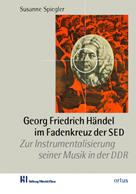 Volume 5 in the series Studien Stiftung Händel-Haus (Halle) Volume 5 in the series Studien Stiftung Händel-Haus (Halle)
Ralph P. Locke: ‘Alexander der Große und der indische Raja Puru: Zur Exotik in einem Libretto Metastasios und in darauf basierenden Opern von Hasse und Händel der’, in: Fremde Helden auf europäischen Bühnen (1600–1900), ed. Achim Aurnhammer and Barbara Korte (Baden-Baden: Ergon, 2017), pp. 127—144
Agnès Garcia Ventura and Marta Ortega Balanza: ‘The Construction of Femininity in Händels Agrippina: from History to Dramatic Opera', in:
Great Women On Stage: The Reception of Women Monarchs from Antiquity in Baroque Opera, ed. Kerstin Droß-Krüpe (Wiesbaden: Harrassowitz, 2017), pp.
27—48
Newsletter of the American Handel Society, Volume 32 Number 2 (Summer 2017):
Mark Risinger: 'Reflections on the sources and staging of Semele', pp. 1—3
Hans Joachim Marx: 'On the authenticity of Christoph Platzer's Handel portrait (c.1710)',
Early Music, Volume 45 Number 3 (August 2017), pp. 459—465
Thomas McGeary: 'Handel, not by Hogarth',
Early Music, Volume 45 Number 3 (August 2017), pp. 467—469
Donald Burrows: 'Who was Handel's tenor soloist in 1751?',
Musical Times, Volume 158 Number 2 (Summer 2017), pp. 1—11
Colin Booth: 'Handel's 'Harmonious Blacksmith': some observations concerning its first note',
The Consort, Volume 73 (Summer 2017), pp. 49—59
Händel-Jahrbuch 63 (Bärenreiter, 2017):
Sabine Volk-Birke: '"Wir sind das Volk!" Zum Verhältnis von englischer und biblischer Geschichte
in Händels geistlicher MusikHändel und einer seiner Interpreten', pp. 13—31
Donald Burrows: 'Pomegranates and oranges: James Harris' s philosophy and Handel' s music', pp. 35—47
Tim Eggington: 'Universal Harmony in Enlightenment England: Handel and the Academy
of Ancient Music', pp. 49—60
Graydon Beeks: '"These Delights If Thou Can'st Give": A preliminary survey of the performance history of L' Allegro ed il Penseroso in England from Handel's death to the end of the 18th century', pp. 61—71
David Wyn Jones: ''What noble simplicity, what strength and, certainly, melody this music has.' Handel's reputation in Beethoven's Vienna', pp. 73—86
Lars Klingberg,: 'Der Topos von Händel als Aufklärer in der DDR', pp. 87—101
Juliane Riepe: '"Für das Volk, von Völkerschicksalen handelnd, volkstümlich": eine historische Konstante der Rezeption von Händels Oratorien als Angelpunkt der Politisierung von Werk und Komponist', pp. 103—136
Dominik Höink: 'Volks- und Kriegsbezüge im Händel-Schrifttum, 1914—1918', pp. 137—156
Harald Lönnecker: '"Händel der Deutsche. Der deutsche Händel" (1931) – Chorgesang zwischen musikalischer Neubesinnung und Mittel zur Umsetzung politischer Ziele', pp. 157—188
Kailan Rubinoff: 'From Populism to Professionalization: Changing Perceptions of Handel in the Twentieth-Century Dutch Early Music Revival', pp. 189—204
Thomas Seedorf: 'Händel in Karlsruhe', pp. 205—214
Arnold Jacobshagen: 'Händel im Stadion? Zadok the Priest und die UEFA Champions League Hymne', pp. 215—226
Edwin Werner: 'Müssen wir das Händel-Bild von Christoph Platzer "abschreiben"?', pp. 229—236
Sandra Bowdler: 'Handel's Operas in Australia, a performance history', pp. 237—251
(also the customary listings of performances, publications and recordings during 2016)
The Handel Institute Newsletter,
Volume 28 Number 1 (Spring 2017):
Blaise Compton: 'Handel's Hornpipe', pp. 1—4
Robert Rawson: 'Recording Pepusch's Venus and Adonis (1715)', pp.
4—6
[also reports on the American Handel Society conference at Princeton, and on the inauguration of the Charles Jennens music block at Foremarke Hall (Repton School) in Derbyshire]
Göttinger Händel-Beiträge 18 (Vandenhoeck & Ruprecht, Göttingen, 2017)
- mostly the proceedings of a symposium on the topic 'Handel in Rome', held at Göttingen in 2016 -
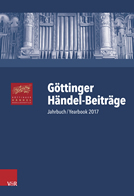 Dietrich Erben: 'Rom um 1700: Kunst, Geschichte und Händels Zeitgenossenschaft'', pp. 7—32 Dietrich Erben: 'Rom um 1700: Kunst, Geschichte und Händels Zeitgenossenschaft'', pp. 7—32
Sabine Ehrmann-Herfort: 'Römische Musikorte: Zur musikalischen Topographie Roms um 1700', pp. 33—56
Wolfgang Proß: 'Händel in Rom der 'Arcadia''', pp. 57—106
Klaus Pietschmann: 'Die Kantate Handel, non può mia Musa im Kontext der Stegreifdichtung in Rom um 1700', pp. 107—124
Alexandra Nigito: 'Händel und seine Beziehungen zu Kardinal Benedetto Pamphilij', pp. 125—136
Hans Joachim Marx: 'Die Händel-Porträts des Gothaer Hofmalers: Georg Andreas Wolffgang d.J. (1703—1745), pp. 137—158
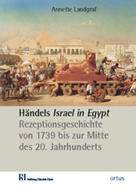
Volume 4 in the series Studien Stiftung Händel-Haus (Halle). Publication of doctoral thesis about the reception history of Israel in Egypt, written by the author of the HHA critical edition of the oratorio. List of contents.
Melania Bucciarelli: '"Farò il possibile per vincer l'animo di M.r Handel": Senesino's arrival in London and Arsace's Rhetoric of Passions', Eighteenth-century Music, Volume 14 Number 1 (March 2017), pp. 53—87
Jeffrey Hopes: 'The sounds of early eighteenth-century pastoral: Handel, Pope, Gay, and Hughes',
E-rea: Revue électronique d’études sur le monde anglophone 14.2 (2017)
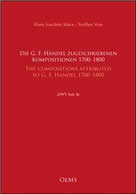
Catalogue of compositions (many of them of doubtful authenticity) attributed to Handel in eighteenth-century sources. List of contents.
Matthew Gardner: ‘Zwischen Kunst und Markt: Händel und seine Sänger in London’, in: Komponieren für Stimme von Monteverdi bis Rihm: Ein Handbuch, ed. Stephan Mösch (Bärenreiter, Kassel, 2017), pp. 55—75
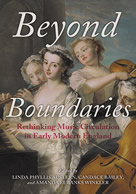 Amongst others, chapters include: Amongst others, chapters include:
Suzanne Aspden: 'Disseminating and Domesticating Handel in Mid-Eighteenth-Century Britain', pp. 207—222
Michael Burden: 'From London’s Opera House to the Salon? The Favourite (and Not So “Favourite”) Songs from the King’s Theatre', pp. 223—237
Newsletter of the American Handel Society, Volume 31 Number 3 (Winter 2016):
Stephen Nissenbaum: 'The long strange career of a Handel missattribution', pp. 1—3
Graydon Beeks: 'Another Reference to Handel in the Montagu correspondence’, pp. 1, 4
Giuseppina La Face and Lorenza Bianconi (eds.), Georg Fredrich Händel e il dramma per musica, in: Il saggiatore musicale: Rivista semestrale di musicologica, Volume 23 Number 2 (2016); proceedings of conference held at Sienna, 7—9 November 2002:
Reinhard Strohm: '"Le roi caché": Incognito in the "dramma per musica"'
Judith Milhous: 'Paying the Piper: Opera and Theatre Finances in London, 1703—1720
Manfred Hermann Schmid: 'Händels Arie "La crudele lontananza" in Scarlattis Oper Pirro e Demetrio'
John H. Roberts: 'Vinci, Porpora and the Royal Academy of Music'
Lowell Lindgren: 'Gioseffo Riva (1682—1739), a Diplomatic Arbiter of "buon gusto" in the London of George I'
A Handbook for Studies in 18th-Century English Music 20 (Gerald Coke Handel Foundation, 2016):
Donald Burrows, ‘Organs and organists at the Foundling Hospital, 1750—1800’, pp. 1—26
Matthias Range, ‘Handel, Croft and music for the Peace of Utrecht’,
pp. 27—55
David Ross Hurley: 'Handel’s Recomposed Return Arias and Romantic Attraction in Alexander Balus',
Journal of the American Musicological Society, Volume 69 Number 3 (2016), pp. 651—698
doi:10.1525/jams.2016.69.3.651
Regina Compton: 'The Tyrant’s Wife and the Continuo Player: Using Recitative to Read Handel’s Operatic Characters',
Journal of Musicological Research, Volume 35 Number 3 (July 2016), pp. 200—232
Emanuele Senici: 'Slipping out Handel, "As with rosy steps the morn" (Irene), Theodora, Act I',
Cambridge Opera Journal, Volume 28 Number 2 (July 2016), pp. 127—131
The Handel Institute Newsletter,
Volume 27 Number 2 (Autumn 2016):
Carole Taylor: 'Paying for the opera in 1730s London', pp. 1—2
[also report on the British Library's digitisation of Handel's autograph scores by curator Amelie Roper, an obituary for Andrew Porter by David Vickers, and a review of the 2016 Halle Festival by Terence Best]
Newsletter of the American Handel Society, Volume 31 Number 2 (Summer 2016):
Alison DeSimone: 'Handel’s Greatest Hits: The Composer’s Music in Eighteenth-Century Benefit Concerts', pp. 1—3
Ellen Rosand: 'Obituary for Alan Curtis (1934—2015)', p. 6
Graydon Beeks: 'Obituary for Andrew Porter (1928—2015)', p. 7
Händel-Jahrbuch 62 (Bärenreiter, 2016):
Axel Köhler: 'Händel und einer seiner Interpreten', pp. 17—29
Regina Compton: 'How to Enrage Alexander, or Towards an Understanding of Handel's Recitativo semplice and Theatrical Gesture', pp. 33—51
Juliane Riepe: 'Sänger in der Kirche. Zur Praxis in italienischen Musikzentren des frühen 18. Jahrhunderts', pp. 53—81
Margret Scharrer: 'Frankreichreisen italienischer Kastraten in der ersten Hälfte des 18. Jahrhunderts', pp. 83—97
Corinna Herr: 'Rodelinda-Darstellerinnen im 18. Jahrhundert', pp. 99—121
Marlen Hachmann: 'Zurückhören – Annäherung an die Händelinterpretation von Pauline Viardot anhand ihrer Edition École classique du chant', pp. 123—136
Michael Burden: 'Handel's Rinaldo and London's Opera House', pp. 137—156
Sarah McCleave: 'Handel and his Dance Interpreters', pp. 157—171
John H. Roberts: 'The London Pasticci of 1730—31: Singers, Composers, and Impresarios', pp. 173—192
Anke Charton: '"Some He-She-Thing Or Other": Körper, Klang und Männlichkeit: Zur Besetzungspolitik bei Händel', pp. 193—204
Thomas Seedorf: 'Der doppelte Radamisto. Zur Besetzungspraxis von Heldenpartien bei Händel', pp. 205—216
David Vickers: 'Handel's revisions to performing versions of Partenope (HWV 27) and Arianna in Creta (HWV 32), 1730—37', pp. 217—236
Matthew Gardner: 'Gioacchino Conti and Handel', pp. 237—249
Suzanne Aspden: 'Handel's Epigones in the late 18th Century', pp. 251—263
Dominik Höink: 'Gesang auf der "imaginierten" Bühne Charakterisierungen der Stimmen von Händel-Solisten in der musikalischen Presse des 19. Jahrhunderts', pp. 265—283
Arnold Jacobshagen: 'Belcanto mit Dilettanten Zur Gesangsästhetik der Händel-Aufführungen bei den Niederrheinischen Musikfesten', pp. 285—304
Martin Elste: 'Über Wagner und Neue Sachlichkeit zur Primadonnen-Ornamentation. National-regionale Interpretationsstile und ihre internationale Wirkung durch den Tonträger am Beispiel von Händel-Opern', pp. 305—320
Graydon Beeks: '"Sweet Bird": The Story of Nellie Melba's 1907 Recording", pp. 321—331
Paul van Reijen: 'Von ruhig-getragener Idyllik bis zur erwartungsvollen Aufregung: Über Interpretationen zweier Händel-Favoriten', pp. 333—340
Rebekka Sandmeier: 'Händels Messias in Südafrika', pp. 341—353
Michael Zywietz: 'Die Händel-Interpretationen Karl Richters', pp. 365—368
Donald Burrows: 'Sir Malcolm Sargent as a conductor of Handel's music', pp. 369—397
Beth L. Glixon: 'Supereminet omnes: New Light on the Life and Career of Vittoria Tarquini', pp. 401—414
Judit Zsovár: 'Successor to the 'Rival Queens': The London Engagement of Handel's Faithful Soprano, Anna Maria Strada del Pò', pp. 415—428
Stephen Nissenbaum: '"Jericho Tune": How a March from Handel's Riccardo Primo became an Early Methodist Hymn', pp. 429—448
(also the customary listings of performances, publications and recordings during 2015)
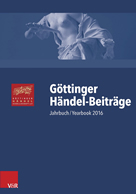 Cord-Friedrich Berghahn: 'Zauberinnen, Märtyrinnen, Verführerinnen: Barocke Heroinen und die Ästhetik des Erhabenen', pp. 7—36 Cord-Friedrich Berghahn: 'Zauberinnen, Märtyrinnen, Verführerinnen: Barocke Heroinen und die Ästhetik des Erhabenen', pp. 7—36
Berthold Over: 'Zwischen Hirtendasein und Heldentum: Frauenfiguren in der italianischen Kantate um 1700', pp. 37—56
Albert Gier: 'Zwischen Mythos und Geschichte: Dido als Herrscherin und Liebende', pp. 57—72
Panja Mücke: '(Un)entwirrbares Intrigengeflecht: Die Konkurrenz der starken Frauen in Agrippina', pp. 73—84
Klaus Pietschmann: '"Pensieri voi mi tormentate": Wahnsinn und psychische Extremsituationen in Händels Opern', pp. 85—96
Hans Joachim Marx: 'Zur Echtheit des Händel-Porträts von Christoph Platzer (um 1710)', pp. 97—110
Ton Koopman: 'Did Bach and Handel ever meet?', pp. 111—121
Donald Burrows: 'Handel, Walsh, and the Publication of Messiah',
Music & Letters,
Volume 97 Number 2 (May 2016), pp. 221—248
The Handel Institute Newsletter,
Volume 27 Number 1 (Spring 2016):
John Greenacombe: 'Where precisely was the 'Fireworks Machine' in 1749?', pp. 2—4
[also obituaries for Brian Trowell by Donald Burrows, for Alan Curtis by David Vickers, for Sir David Willcocks by Silas Wollston, and for Merlin Channon by Donald Burrows]
Newsletter of the American Handel Society, Volume 31 Number 1 (Spring 2016):
Helen Farson: 'Handel’s Use of Fugue in Alexander’s Feast', pp.1, 4—5
Andrew Shryock: 'The Early Career of Thomas Lowe, Oratorio Tenor', pp.1—3
Minji Kim: 'Handel’s Saul at Boston’s Symphony Hall', pp. 5—6
Richard G. King: 'Who Does What? On the Roles of the Violoncello and Double Bass in the Performance of Handel's Recitatives',
Early Music, Volume 44 Number 1 (2016), pp. 45—58
doi:10.1093/em/caw013
Thomas McGeary: 'Handel in Rome: the Homosexual Context Reconsidered',
Early Music, Volume 44 Number 1 (2016), pp. 59—76 doi:10.1093/em/caw018
David Kimbell: Handel on the Stage
(Cambridge University Press, 2016)
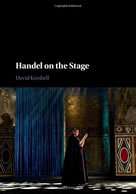 "Of all the great composers of the eighteenth century, Handel was the supreme cosmopolitan, an early and extraordinarily successful example of a freelance composer. For thirty years the opera-house was the principal focus of his creative work and he composed more than forty operas over this period. In this book, David Kimbell sets Handel's operas in their biographical and cultural contexts. He explores the circumstances in which they were composed and performed, the librettos that were prepared for Handel, and what they tell us about his and his audience's values and the music he composed for them. Remarkably no Handel operas were staged for a period of 170 years between 1754 and the 1920s. The final chapter in this book reveals the differences and similarities between how Handel's operas were performed in his time and ours." "Of all the great composers of the eighteenth century, Handel was the supreme cosmopolitan, an early and extraordinarily successful example of a freelance composer. For thirty years the opera-house was the principal focus of his creative work and he composed more than forty operas over this period. In this book, David Kimbell sets Handel's operas in their biographical and cultural contexts. He explores the circumstances in which they were composed and performed, the librettos that were prepared for Handel, and what they tell us about his and his audience's values and the music he composed for them. Remarkably no Handel operas were staged for a period of 170 years between 1754 and the 1920s. The final chapter in this book reveals the differences and similarities between how Handel's operas were performed in his time and ours."
Minji Kim: 'The Amalekite Case and the Portrayal of Saul in Handel and Jennens's Oratorio Saul (1739)',
Journal of Musicological Research, Volume 35 Number 1 (2016), pp. 45—60
Marjorie Fitzpatrick: Music and Power in Eighteenth Century Court Society: Handel’s Messiah and Protestant Ascendancy
(Edwin Mellen Press, 2016)
"Examines music and power in eighteenth-century court society. It focuses on Messiah and the Protestant Ascendancy society. Its aims are to find out if music reflects cultural changes and whether music is an indicator of power positions within court society utilizing the theoretical framework of Norbert Elias' social theory."
Graham Pont: ‘Handel's keyboard sonatas’, in: The Early Keyboard Sonata in Italy and Beyond, ed. Rohan H. Stewart-MacDonald (Brepols, Turnhout, 2016), pp. 145—190
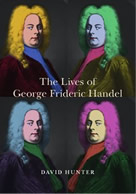 "To evaluate the familiar, even over-familiar, story of Handel's life could be seen as a quixotic endeavour. How can there be anything new to say? This book seeks to distinguish fact from fiction, not only to produce a new biography but also to explore the concepts of biography and dissemination by using Handel's life and lives as a case study. By examining the images of Handel to be found in biographies and music histories ... and by adding new factual information, David Hunter shows how events are manipulated into stories and tropes. One such trope has been employed to portray numerous persons as Handel's enemies regardless of whether Handel considered them as such. Picking apart the writing of Handel's biographers and other reporters, Hunter exposes the narrative underpinnings - the lies, confusions, presumptions, and conclusions, whether direct and inferred or assumed - to show how Handel's 'lives' in biographies and histories have moulded our understanding of the musician, the man and the icon." "To evaluate the familiar, even over-familiar, story of Handel's life could be seen as a quixotic endeavour. How can there be anything new to say? This book seeks to distinguish fact from fiction, not only to produce a new biography but also to explore the concepts of biography and dissemination by using Handel's life and lives as a case study. By examining the images of Handel to be found in biographies and music histories ... and by adding new factual information, David Hunter shows how events are manipulated into stories and tropes. One such trope has been employed to portray numerous persons as Handel's enemies regardless of whether Handel considered them as such. Picking apart the writing of Handel's biographers and other reporters, Hunter exposes the narrative underpinnings - the lies, confusions, presumptions, and conclusions, whether direct and inferred or assumed - to show how Handel's 'lives' in biographies and histories have moulded our understanding of the musician, the man and the icon."
Newsletter of the American Handel Society, Volume 30 Number 3 (Winter 2015):
Ellen T. Harris: ‘Exhibition: Handel: A Life with Friends Handel & Hendrix in London’, pp. 1, 4–5.
Matthew Gardner: ‘Handel and His Eighteenth-Century Performers: The Handel Institute Conference, London’, pp. 1–3.
Melania Bucciarelli: 'Senesino's Negotiations with the Royal Academy of Music: Further Insight into the Riva-Bernardi Correspondence and the Role of Singers in the Practice of Eighteenth-Century Opera',
Cambridge Opera Journal, Volume 27 Number 3 (November 2015), pp. 189—213
The Handel Institute Newsletter,
Volume 26 Number 2 (Autumn 2015):
[contains abstracts of the conference 'Handel and his eighteenth-century performers', a report on the 2015 American Handel Society Conference and reviews of the Göttingen and Halle festivals]
Andrew Pink: 'Solomon, Susanna and Moses: locating Handel's lost librettist',
Eighteenth-century Music, Volume 12 Number 2 (September 2015), pp. 211—222
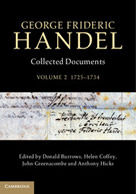 "The life and career of George Frideric Handel ... are copiously and intricately documented through a huge variety of contemporary sources. This multi-volume major publication is the most up-to-date and comprehensive collection of these documents. Presented chronologically in their original languages with English translations and with commentaries incorporating the results of recent research, the documents provide an essential and accessible resource for anyone interested in Handel and his music. In charting his activities in Germany, Italy and Britain, the documents also offer a valuable insight into broader eighteenth-century topics, such as court life, theatrical history, public concerts and competition between music publishers. This volume covers the period of Handel's London's opera career during which he achieved gradual independence from the Royal Academy opera company, but also introduced English theatre oratorios and wrote the music for the 1727 Coronation." "The life and career of George Frideric Handel ... are copiously and intricately documented through a huge variety of contemporary sources. This multi-volume major publication is the most up-to-date and comprehensive collection of these documents. Presented chronologically in their original languages with English translations and with commentaries incorporating the results of recent research, the documents provide an essential and accessible resource for anyone interested in Handel and his music. In charting his activities in Germany, Italy and Britain, the documents also offer a valuable insight into broader eighteenth-century topics, such as court life, theatrical history, public concerts and competition between music publishers. This volume covers the period of Handel's London's opera career during which he achieved gradual independence from the Royal Academy opera company, but also introduced English theatre oratorios and wrote the music for the 1727 Coronation."
Händel-Jahrbuch 61 (Bärenreiter, 2015):
Colin Timms: 'Steffani und Händel als Komponisten für Hannover und London', pp. 13—37
Heide N. Rohloff: 'Das Haus Hannover auf dem Thron des Vereinigten Königreichs: Verfassungsrechtliche Voraussetzungen, Zustandekommen und Funktionieren
der Personalunion Großbritannien–Hannover (1714—1837)', pp. 41—64
Helen Coffey: 'Music for an Elector and King: the Hanover Hofkapelle during the reigns of George I and II', pp. 135—152
Arno Paduch: 'The King shall rejoyce – Musik zur Krönung Georgs I', pp. 167—172
Matthew Gardner: 'The Preference of the Hanoverians for Handel, 1727—1821', pp. 173—185
Donald Burrows: 'The British royal family, the London opera companies and Handel's performances, 1732—1743', pp. 187—201
Philipp Kreisig: 'Hochzeitsopern zwischen Staatsakt und Konkurrenzsituation: Händels Atalanta und Porporas La festa d' Imeneo von 1736 für den Prince of Wales und Kurprinzen von Hannover', pp. 203—226
Lawrence Zazzo: 'J'aurai des maitresses: George II and Language in the 1730s Bilingual Revivals of Esther', pp. 227—240
Peter Holman: 'Handel's Lutenist, the Mandolino in England, and John Francis Weber', pp. 241—257
John H. Roberts: 'Steffani Duets as Handel Sources', pp. 259—282
Graydon Beeks: 'Non-Handelian Changes to the "Cannons" Te Deum, HWV 281', pp. 283—291
Christoph Henzel: 'Händelfilme – made in GDR (Teil 2)', pp. 295—310
Toby Thacker: 'The 'Handel Renaissance' in the German Democratic Republic:Why did the British take part?', pp. 311—324
Annette Landgraf: 'Zum Gedächtnis der Helden – Umtextierungen von Händels Funeral Anthem für Queen Caroline im Hamburger Kontext', pp. 325—340
Michael Talbot: 'A Leaving Present for Princess Louisa?: Handel, Barsanti and Bodmer Ms. 11461–7', pp. 343—381
Peter Wollny: '"Zwo Menuetten und eine halbe Arie" von Händel –
Ein wenig beachtetes Hamburger Klavierbuch des frühen 18. Jahrhundertspp', pp. 383—412
John H. Roberts: '"Blooms of Youth": A Solomonic Addendum', pp. 413—424
(also other articles not directly connected to Handel, and the customary listings of performances, publications and recordings during 2014)
Göttinger Händel-Beiträge 16 (Vandenhoeck & Ruprecht, Göttingen, 2015)
- Proceedings of the symposium 'Georg Friedrich Händel am Vorabend des Ersten Weltkriegs' (Göttingen, May 2014) -
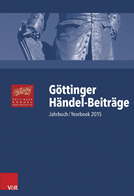 Annette Richards: 'Vereint durch den erhabenen Chor: Das ästhetisch-politische Vermächtnis von Händels Hallelujah in Zeitalter der Personalunion' in Zeitalter der Personalunion'', pp. 7—30 Annette Richards: 'Vereint durch den erhabenen Chor: Das ästhetisch-politische Vermächtnis von Händels Hallelujah in Zeitalter der Personalunion' in Zeitalter der Personalunion'', pp. 7—30
Claus-Diester Osthövener: 'Der religiöse Händel: Händel in der Theologie um 1900', pp. 31—41
Christoph Flamm: 'Zwischen Schering und Heuß. Händel in der deutschen Musikgesichtsschreibung des frühen 20. Jahrhunderts', pp. 43—54
Thomas Irvine: 'Handel at the Queen's Hall Promenade Concerts, 1895—1914', pp. 55—75
Inga Mai Groote: '"niemand sonst konnte ein Volk singen lassen wie er": Maurice Bouchors Händel und der französische Kontext', pp. 77—92
Christiane Wiesenfeldt: 'Schiller trifft Händel im "mythos Weimar": Zu einem Sonderfall der Händel-Rezeption des frühen 20. Jahrhunderts', pp. 93—106
Lars Klingberg: 'Die Göttinger Händel-Gesellschaft während der NS-Zeit', pp. 107—141
(also a bibliography of publications during 2013—4)
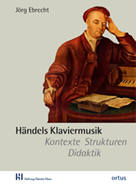 Volume 3 in the series Studien Stiftung Händel-Haus (Halle) Volume 3 in the series Studien Stiftung Händel-Haus (Halle)
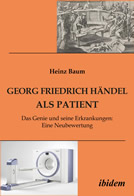 "There are a number of speculations surrounding the death and illnesses of Handel: rheumatism is said to have plagued him, and he is said to have suffered a stroke similar to that of his mother. In the last years he was blind. Finally, he is said to have succumbed to a tumor. Heinz Baum searches for clues in his present book. In doing so, he relies on contemporary sources and examines the diagnoses resulting from Handel's time on the basis of modern scientific and medical standards." "There are a number of speculations surrounding the death and illnesses of Handel: rheumatism is said to have plagued him, and he is said to have suffered a stroke similar to that of his mother. In the last years he was blind. Finally, he is said to have succumbed to a tumor. Heinz Baum searches for clues in his present book. In doing so, he relies on contemporary sources and examines the diagnoses resulting from Handel's time on the basis of modern scientific and medical standards."
Newsletter of the American Handel Society, Volume 30 Number 2 (Summer 2015):
Adam Shoaff: 'Handel in The Harmonicon', pp.1, 4—5
Regina Compton: 'Of Heroes, Lovers, and Clowns: A Review of Alessandro at the Händel-Festspiele Halle', p. 6
Jonathan Rhodes Lee: 'From Amelia to Calista and Beyond: Sentimental Heroines, 'Fallen' Women and Handel's Oratorio Revisions for Susanna Cibber',
Cambridge Opera Journal, Volume 27 Number 1 (March 2015), pp. 1—34
The Handel Institute Newsletter,
Volume 26 Number 1 (Spring 2015):
Donald Burrows: 'O Ebenezer Prout!', pp. 2—5
[also an obituary for Christopher Hogwood by Donald Burrows, announcements, and reports of festivals and conferences]
Newsletter of the American Handel Society, Volume 30 Number 1 (Spring 2015):
Graydon Beeks: 'Mirth, Melancholy, and the Future Mrs. Montagu', pp. 1, 4—5
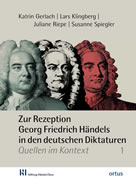 A two-volume study of the reception and ideological use of Handel's music in the era of National Socialism and the German Democratic Republic. The book aims to expand our knowledge of the relationship between music and politics in dictatorial regimes. This volume originated primarily with the intention to facilitate future research on Handel reception in the Nazi era and the GDR by publishing a selection of the available sources. A two-volume study of the reception and ideological use of Handel's music in the era of National Socialism and the German Democratic Republic. The book aims to expand our knowledge of the relationship between music and politics in dictatorial regimes. This volume originated primarily with the intention to facilitate future research on Handel reception in the Nazi era and the GDR by publishing a selection of the available sources.
Volume 2 in the series Studien Stiftung Händel-Haus (Halle)
Thomas McGeary: 'Handel in the Dunciad: Pope, Handel, Frederick, Prince of Wales, and Cultural Politics'
The Musical Quarterly,
Volume 97 Number 4 (December 2014), pp. 542—574
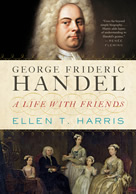 Handel's will offers us a narrow window into his personal life. In it, he remembers not only family and close colleagues but also neighborhood friends. In search of the private man behind the public figure, Ellen T. Harris has spent years tracking down the letters, diaries, personal accounts, legal cases, and other documents connected to these bequests. The result is a tightly woven tapestry of London in the first half of the eighteenth century, one that interlaces vibrant descriptions of Handel’s music with stories of loyalty, cunning, and betrayal. Layering the interconnecting stories of Handel’s friends like the subjects and countersubjects of a fugue, Harris introduces us to an ambitious, shrewd, generous, brilliant, and flawed man, hiding in full view behind his public persona. Handel's will offers us a narrow window into his personal life. In it, he remembers not only family and close colleagues but also neighborhood friends. In search of the private man behind the public figure, Ellen T. Harris has spent years tracking down the letters, diaries, personal accounts, legal cases, and other documents connected to these bequests. The result is a tightly woven tapestry of London in the first half of the eighteenth century, one that interlaces vibrant descriptions of Handel’s music with stories of loyalty, cunning, and betrayal. Layering the interconnecting stories of Handel’s friends like the subjects and countersubjects of a fugue, Harris introduces us to an ambitious, shrewd, generous, brilliant, and flawed man, hiding in full view behind his public persona.
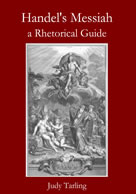 "The story of the creation of Messiah is followed by a close unpicking and rhetorical analysis of Handel's setting of the text to music, showing how devices such as word-painting, repetition, questions and exclamations portray and enhance the Christian message and add to its impact on the listener. Rhetorical ideas from Classical Roman and Greek authors are used alongside texts of the sixteenth and seventeenth centuries, which were written to help people to read and understand the Bible in the Protestant Church tradition. Judy Tarling's previous book The Weapons of Rhetoric introduced musicians and audiences to the connection between performing music of the seventeenth and eighteenth centuries and the techniques of oratory: not for nothing were many of the great works of Handel described as Oratorios. The book also includes a performer's guide to rhetorical techniques of delivering Handel's ideas." "The story of the creation of Messiah is followed by a close unpicking and rhetorical analysis of Handel's setting of the text to music, showing how devices such as word-painting, repetition, questions and exclamations portray and enhance the Christian message and add to its impact on the listener. Rhetorical ideas from Classical Roman and Greek authors are used alongside texts of the sixteenth and seventeenth centuries, which were written to help people to read and understand the Bible in the Protestant Church tradition. Judy Tarling's previous book The Weapons of Rhetoric introduced musicians and audiences to the connection between performing music of the seventeenth and eighteenth centuries and the techniques of oratory: not for nothing were many of the great works of Handel described as Oratorios. The book also includes a performer's guide to rhetorical techniques of delivering Handel's ideas."
The Handel Institute Newsletter,
Volume 25 Number 2 (Autumn 2014):
Hansjörg Drauschke: 'Vocal Chamber Music in Hamburg: Keiser, Mattheson and Handel', pp. 1—4
[also reports of festivals and conferences, and announcements]
Benedict Taylor: 'The Triumph of Time in the Eighteenth Century: Handel's Il trionfo del Tempo and Historical Conceptions of Musical Temporality', Eighteenth-century Music, Volume 11 Number 2 (September 2014), pp. 257—81
Amanda Babington & Ilias Chrissochoidis: 'Musical References in the Jennens–Holdsworth
Correspondence (1729—46)',
Royal Musical Association Research Chronicle, 2014, pp. 76—129
Händel-Jahrbuch 60 (Bärenreiter, 2014):
Terence Best: 'Winton Basil Dean (1916—2013): a personal memoir', pp. 11—14
Pamela M. Potter: 'Händel als "deutscher Staatskomponist" im 20. Jahrhundert', pp. 21—36
Albrecht Dümling: 'Musik als Mittel staatlicher Machtausübung
Anmerkungen zum Verhältnis von Musik und Politik', pp. 37—50
Dominik Höink: '"Der Vielgereiste … hielt Vaterlandsliebe und -treue allzeit
hoch in Ehren”. Der "deutsche" Händel im Kaiserreich und in der Weimarer
Republik', pp. 51—72
Gerd Rienäcker: 'Ernst Hermann Meyer über Georg Friedrich Händel – einige Notate', pp. 97—108
Christoph Henzel: 'Händelfilme – made in GDR (Teil 1)', pp. 109—120
Susanne Spiegler: 'Händel-Inszenierungen als Widerspiegelungen staatlicher Ideologie? Zur Bearbeitungspraxis von Opern und Oratorien im Kontext der Händel-Festspiele der DDR in Halle', pp. 121—136
Ursula Kramer: 'Händel und die falsche Mittelmerromantik. Julius Cäsar in Darmstadt zwischen ästhetischer Innovation und politischer Rezeption', pp. 137—151
Klaus-Peter Koch: 'Festoratorium, Der Feldherr und Das Opfer in Hermannstadt (Sibiu). Zu den Aufführungen Händel'scher oratorischer
Werke in Siebenbürgen', pp. 153—177
Lars Klingberg: 'Die Göttinger Händel-Gesellschaft während der NS-Zeit', pp. 179—215
Katrin Gerlach:'Heldengedenken mit Händel im NS-Staat.
Zum Trauermarsch aus Saul bzw. Samson u. a.', pp. 217—241
Donald Burrows: 'The Power of Music – the significance of Alexander's Feast in Handel's London career', pp. 243—252
Matthew Gardner: 'Alexander's Feast and Eighteenth-Century Perceptions of the Power of Music', pp. 253—264
Hans Dieter Clausen: 'Divine Efficacy of Music! Händels dritter Beweis: die Masque für die Königin von Saba', pp. 265—279
John H. Roberts: 'The Queen's Anthem and the Emperor's Madrigal', pp. 281—300
Stefan Gasch & Rebecca Wolf: 'Georg Friedrich Händel als "comes pacis". Die Te Deum-Vertonung von 1713 und die Frage nach dem Frieden
in der Musik', pp. 301—315
Stefan Keym: 'Herrschaftssymbolik, Gattungskontext und Personalstil: Zur französischen Ouvertüre bei Lully und Händel', pp. 317—334
Jana Kühnrich: 'Der Teilnachlass von Friedrich Chrysander in der Bibliothek der Stiftung Händel-
Haus Halle. Wissenschaftliche Erschließung und Inventarisierung', pp. 337—348
Jeremy Barlow and Todd Gilman: 'Newly discovered letters to Handel editor Samuel Arnold', pp. 349—389
John H. Roberts: 'More Music by Reinhard Keiser', pp. 391—424
(also other articles, not all of them connected to Handel, and the customary listings of performances, publications and recordings during 2013)
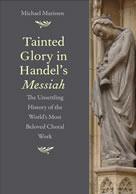 In this pioneering study, musicologist Michael Marissen examines Handel's masterwork and proposes a message of anti-Judaism within its joyous celebration of the divinity of Christ. This provocative work offers musical scholars and general readers alike an unsettling and controversial hypothesis regarding one of the world's best-loved and most widely performed works of religious music. In this pioneering study, musicologist Michael Marissen examines Handel's masterwork and proposes a message of anti-Judaism within its joyous celebration of the divinity of Christ. This provocative work offers musical scholars and general readers alike an unsettling and controversial hypothesis regarding one of the world's best-loved and most widely performed works of religious music.
Graham Pont: ‘Handel's other work for solo harp’,
Early Music Performer, Journal of the National Early Music Association, Issues 33 & 34 (May 2014), pp. 39—43
Göttinger Händel-Beiträge 15 (Vandenhoeck & Ruprecht, Göttingen, 2014)
- Proceedings of the symposium 'The Power of Musick' – Music and Politics in Georgian Britain' (London, 13—15 June 2013) -
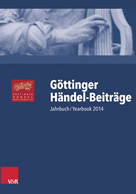 Tim Blanning: 'Nation-Building through Music? Music in English National Consciousness in the Eighteenth Century', pp. 21—38 Tim Blanning: 'Nation-Building through Music? Music in English National Consciousness in the Eighteenth Century', pp. 21—38
Werner Busch: 'The Visible Power of Music: Louis François Roubiliac's Handel Statue for Vauxhall Gardens', pp. 39—53
Andreas Gestrich: 'Music and Philanthropy in Eighteenth-Century London', pp. 54—65
Ruth Smith: 'Dedications of Opera and Oratorio Librettos to the Royal Family, 1711—46', pp. 69—86
Annette Richards: 'The 1784 Commemoration and the Charitable Handel', pp. 87—105
Donald Burrows:'Handel, the British Court and the London Public', pp. 109—118
Hans Joachim Marx: 'Die Musik am englischen Hof von Georg III. (1761—1820)', pp. 119—143
Simon McVeigh: 'Handel in Concert: Social, National and Cultural Roles in Later Eighteenth-Century Britain', pp. 161—176
Wolfgang Hirschmann: 'The Handel Commemoration in 1784 and its Impact on German Musical Life: Some General Remarks', pp. 206—216
Otto Biba: 'Die Rolle des Musikalienhandels für die Verbreitung der Werke Georg Friedrich Händels in den Habsburgischen Ländern', pp. 217—226
(also other articles not directly connected to Handel, and a bibliography of publications during 2012—3)
The Handel Institute Newsletter,
Volume 25 Number 1 (Spring 2014):
H. Diack Johnstone: 'Handel revamped', pp. 3—6
David Hunter: 'Handel at Exton, Rutland', p. 6—7
[also an obituary for Winton Dean by Terence Best]
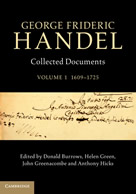 "The life and career of George Frideric Handel ... are copiously and intricately documented through a huge variety of contemporary sources. This multi-volume major publication is the most up-to-date and comprehensive collection of these documents. Presented chronologically in their original languages with English translations and with commentaries incorporating the results of recent research, the documents provide an essential and accessible resource for anyone interested in Handel and his music. As well as being an outstanding musician with a successful career as a composer of Italian operas and English oratorios, Handel was a well-known figure in his own lifetime, with an international reputation. In charting his activities in Germany, Italy and Britain, the documents also offer a valuable insight into broader eighteenth-century topics, such as court life, theatrical history, public concerts and competition between music publishers. This volume includes family documents from Halle, then covers Handel's early career in Germany and Italy, followed by the period in which he became an established composer for London's Italian opera company while also writing the Water Music and the Utrecht Te Deum for the British court." "The life and career of George Frideric Handel ... are copiously and intricately documented through a huge variety of contemporary sources. This multi-volume major publication is the most up-to-date and comprehensive collection of these documents. Presented chronologically in their original languages with English translations and with commentaries incorporating the results of recent research, the documents provide an essential and accessible resource for anyone interested in Handel and his music. As well as being an outstanding musician with a successful career as a composer of Italian operas and English oratorios, Handel was a well-known figure in his own lifetime, with an international reputation. In charting his activities in Germany, Italy and Britain, the documents also offer a valuable insight into broader eighteenth-century topics, such as court life, theatrical history, public concerts and competition between music publishers. This volume includes family documents from Halle, then covers Handel's early career in Germany and Italy, followed by the period in which he became an established composer for London's Italian opera company while also writing the Water Music and the Utrecht Te Deum for the British court."
Annette Landgraf and David Vickers (editors): The Cambridge Handel Encyclopedia
(Paperback edition, Cambridge University Press, 2013)
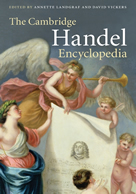 "George Frideric Handel was born and educated in Germany, flourished in Italy, and chose to become British. One of the most cosmopolitan of the great composers, much of Handel's music has remained in the popular repertory since his lifetime, and a broad variety of his music theatre works from Italian operas to English oratorios have experienced a dramatic renaissance since the late twentieth century. A large number of publications devoted to Handel's life and music have appeared from his own time to the present day, but The Cambridge Handel Encyclopedia is the first resource to gather the full range of present knowledge and leading new scholarship into a single volume for convenient and illuminating reference. Packed with 700 informative and accessible entries both long and short, this book is ideal for performers, scholars, students and music lovers who wish to explore the Handelian world." "George Frideric Handel was born and educated in Germany, flourished in Italy, and chose to become British. One of the most cosmopolitan of the great composers, much of Handel's music has remained in the popular repertory since his lifetime, and a broad variety of his music theatre works from Italian operas to English oratorios have experienced a dramatic renaissance since the late twentieth century. A large number of publications devoted to Handel's life and music have appeared from his own time to the present day, but The Cambridge Handel Encyclopedia is the first resource to gather the full range of present knowledge and leading new scholarship into a single volume for convenient and illuminating reference. Packed with 700 informative and accessible entries both long and short, this book is ideal for performers, scholars, students and music lovers who wish to explore the Handelian world."
Commended as one of the 2010 Books of the Year in the Times Literary Supplement
Minji Kim: 'The Rise and Fall of Empires': Predestination and Free Will in Jennens and Handel's Belshazzar', The Musical Times 154/1924 (2013), pp. 19–35.
The Handel Institute Newsletter,
Volume 24 Number 2 (Autumn 2013):
Michael Talbot: 'An unexpected Handel copyist: Francesco Barsanti', pp. 1—3
Olive Baldwin and Thelma Wilson: 'Another Handelian bass singer and organist', p. 3
[also reports on 2013 London Handel Festival, Göttingen Handel Festival and the Stanley Sadie Handel Recording Prize]
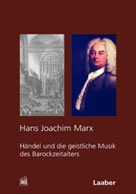 A collection of essays on Handel and other baroque music topics spanning four decades of research. A collection of essays on Handel and other baroque music topics spanning four decades of research.
Articles on Handel include discussions of Handel's Roman Catholic church music, instrumentation in his Italian works, the function of choruses in his theatre works, recitative forms in oratorios, and the use of the concerti a due cori in oratorio performances.
Pierre Degott and Pierre Dubois (editors): "Haendel après Haendel: Construction, renommée, influence de Haendel et de la figure haendélienne", Musicorum 14 (2013)
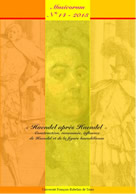 Proceedings of the conference "Handel after Handel", held at the University of Tours, 18—20 October 2012. Proceedings of the conference "Handel after Handel", held at the University of Tours, 18—20 October 2012.
Papers include:
Donald Burrows: 'Turning the Handel: how Handel and his Music Survived 250 Years', pp. 15—26
Pierre Dubois: 'The Changing Faces of Handelian Historiography', pp. 27—46
Albert Gier: 'Haendel à Karlsruhe: un festival récent et ses ancêtres', pp. 47—60
Adrian La Salvia: 'La Renaissance de Haendel au miroir des traductions', pp. 61—74
Annette Landgraf: 'The German Belletristic Literature about George Frideric Handel: Fact and Fancy', pp. 75—86
Pierre Degott: 'From Facts to Fiction: Handel's Operas between 1754 and 1920', pp. 87—98
Matthew Gardner: 'The Great Mr Handel (1942): Handel's First Biopic, its Sources and Wartime Allegory', pp. 99—108
Michael Burden: 'When Giulio Cesare was not Handel's Giulio Cesare: The Opera on the London Stage in 1787', pp. 109—122
Brian Robins: 'John Marsh and Handel', pp. 123—132
François Deconinck-Brossard: 'Sharp, Haendel, Nares et les autres', pp. 133—144
Lionel Duguet: 'La Réception du Messie en France au XIXème siècle', pp. 145—156
Denis Tchorek: 'Un exemple de transfert culturel: l'introduction des concertos
pour orgue de Haendel dans le répertoire des concerts en France au XIXème siècle', pp. 157—182
Steven Young: 'Handel Redux: Late Romantic Organ Composers and the Handelian Legacy', pp. 183—192
Gilles Couderc: '"Move over, Handel!": The English Musical Renaissance and
the Quest for New Musical Heroes', pp. 193—206
Jean-Philippe Heberlé: 'L'héritage haendélien et Michael Tippett:
Georg Friedrich Haendel, modèle et contre-modèle', pp. 207—216
Ivan Ćurković: 'Men and/or Women: Gender Ambiguity and Performance Practice in Stagings of G. F. Handel’s Operas and Oratorios', pp. 217—240
Maja Vukušić Zorica: 'Les pérégrinations du genre, ou "Bent that bends": des castrats aux contreténors, de la tradition à la "monstruosité"', pp. 241—256
Yaiza Bermúdez Cubas: 'Reflexiones de la música del Haendel en el cine: "Música clásica o música popular"', pp. 257—272
Nathalie Vincent-Arnaud: 'Les métamorphoses de Terpsichore: Haendel et la danse aujourd’hui', pp. 273—
Christian Bährens: Händels Utrechter Te Deum: Geschichte - Musik - Interpretation
(Unibuch Verlag, 2013)
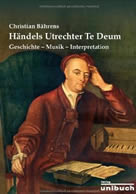 "This newly published monograph of the Utrecht Te Deum ... draws the reader into Handel's time and sheds light on a myriad of interesting aspects of the piece, its genesis, the music itself and the possible interpretations." "This newly published monograph of the Utrecht Te Deum ... draws the reader into Handel's time and sheds light on a myriad of interesting aspects of the piece, its genesis, the music itself and the possible interpretations."
[German-language PhD thesis]
Händel-Jahrbuch 59 (Bärenreiter, 2013):
Carolyn Gianturco: 'Obituary for Ursula Kirkendale (1932—2013)', pp. 11—14
John H. Roberts: 'A Confessional Curiosity: Handel's Motet Silete venti', pp. 91—123
Michael Lloyd: 'Towards An Outline of Handel' s Theology', pp. 151—166
Alexander Aichele: 'Ein protestantisches Bollwerk gegen den Deismus?:
Zeichen und Wunder in Händels englischen Oratorien', pp. 167—185
Donald Burrows: 'The English Chapel Royal as the intersection of religion and personal politics
for Handel and the British monarchy', pp. 187—193
Katie Hawks: 'Handel's Timely Triumphs', pp. 195—202
Graydon Beeks: '"O Sing unto the Lord": The Selection of Anthem Texts for Cannons', pp. 203—216
Matthew Gardner: 'Handel' s Wedding Anthems and Borrowing', pp. 217—228
David Vickers: '''The Musick to be disposed after the Manner of the Coronation Service": Handel' s use of ceremonial anthems in Esther (HWV 50b) and Deborah (HWV 51), 1732—1757', pp. 229—243
Annette Landgraf: 'Die Synthese verschiedener Gattungen der geistlichen Musik in Händels Israel in Egypt', pp. 245—261
Sabine Volk-Birke:'"Let Senesino sing, what David writ"?
Gebete in Händels Oratorienlibrettig', pp. 263—289
Stephen Nissenbaum: 'How Handel' s Messiah became a Christmas Tradition', pp. 291—302
Jan Assmann: 'Händels Oratorium Israel in Egypt – Dankgesang eines Genesenen?', pp. 377—390
John H. Roberts: 'Three Arias in Search of an Opera', pp. 393—403
Warren Kirkendale: 'On the Date of Handel's Cantata Arresta il passo, HWV 83: His Debut in Rome', pp. 405—408
Andreas Glöckner: 'Ein Erfurter "Flugblatt" zur Auff ührung von Händels Brockes-Passion im Jahre 1751', pp. 409—414
(also other articles, not all of them connected to Handel)
The Handel Institute Newsletter,
Volume 24 Number 1 (Spring 2013):
Donald Burrows: 'A New Handel Letter', pp. 1—2
Donald Burrows and Paul Tindall: 'Gustavus Waltz: A New Discovery', pp. 3—4
Annete Landgraf: 'Handel in German Belletristic Literature', pp. 5—6
[also reports on 2012 Handel Institute Conference and 2013 American Handel Society Conference]
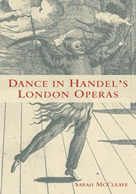 "Handel set himself apart from his contemporaries by employing choreographed instrumental music to complement and reinforce the emotional impact of his operas. Of his fifty-three operas, no fewer than fourteen--including ten written for the London stage--feature dances. Dance in Handel's London Operas explores the relationship between music, drama, and dance in these London works, dispelling the notion that dance was a largely peripheral element in Italian-language operas prior to those of Gluck. Taking a chronological approach, Sarah McCleave examines operas written throughout various periods in Handel's life, beginning with his early London operas, including his time at the Royal Music Academy and the 'Sallé' operas of the 1730s, and concluding with his unstaged dramatic opera Alceste (1750). In considering the various influences on Handel (particularly the London stage), McCleave blends analysis of information from eighteenth-century treatises with that found in more modern studies, offering an informed and imaginative understanding of the role dance played in the work of this major figure". "Handel set himself apart from his contemporaries by employing choreographed instrumental music to complement and reinforce the emotional impact of his operas. Of his fifty-three operas, no fewer than fourteen--including ten written for the London stage--feature dances. Dance in Handel's London Operas explores the relationship between music, drama, and dance in these London works, dispelling the notion that dance was a largely peripheral element in Italian-language operas prior to those of Gluck. Taking a chronological approach, Sarah McCleave examines operas written throughout various periods in Handel's life, beginning with his early London operas, including his time at the Royal Music Academy and the 'Sallé' operas of the 1730s, and concluding with his unstaged dramatic opera Alceste (1750). In considering the various influences on Handel (particularly the London stage), McCleave blends analysis of information from eighteenth-century treatises with that found in more modern studies, offering an informed and imaginative understanding of the role dance played in the work of this major figure".
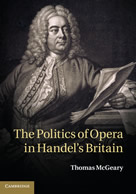 "The Politics of Opera in Handel's Britain examines the involvement of Italian opera in British partisan politics in the first half of the eighteenth century, which saw Sir Robert Walpole's rise to power and George Frideric Handel's greatest period of opera production. McGeary argues that the conventional way of applying Italian opera to contemporary political events and persons by means of allegory and allusion in individual operas is mistaken; nor did partisan politics intrude into the management of the Royal Academy of Music and the Opera of the Nobility. This book shows instead how Senesino, Faustina, Cuzzoni and events at the Haymarket Theatre were used in political allegories in satirical essays directed against the Walpole ministry. Since most operas were based on ancient historical events, the librettos – like traditional histories – could be sources of examples of vice, virtue, and political precepts and wisdom that could be applied to contemporary politics." "The Politics of Opera in Handel's Britain examines the involvement of Italian opera in British partisan politics in the first half of the eighteenth century, which saw Sir Robert Walpole's rise to power and George Frideric Handel's greatest period of opera production. McGeary argues that the conventional way of applying Italian opera to contemporary political events and persons by means of allegory and allusion in individual operas is mistaken; nor did partisan politics intrude into the management of the Royal Academy of Music and the Opera of the Nobility. This book shows instead how Senesino, Faustina, Cuzzoni and events at the Haymarket Theatre were used in political allegories in satirical essays directed against the Walpole ministry. Since most operas were based on ancient historical events, the librettos – like traditional histories – could be sources of examples of vice, virtue, and political precepts and wisdom that could be applied to contemporary politics."
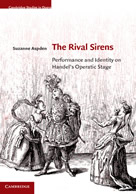 "The tale of the onstage fight between prima donnas Francesca Cuzzoni and Faustina Bordoni is notorious, appearing in music histories to this day, but it is a fiction. Starting from this misunderstanding, The Rival Sirens suggests that the rivalry fostered between the singers in 1720s London was in large part a social construction, one conditioned by local theatrical context and audience expectations, and heightened by manipulations of plot and music. This book offers readings of operas by Handel and Bononcini as performance events, inflected by the audience's perceptions of singer persona and contemporary theatrical and cultural contexts. Through examining the case of these two women, Suzanne Aspden demonstrates that the personae of star performers, as well as their voices, were of crucial importance in determining the shape of an opera during the early part of the eighteenth century." "The tale of the onstage fight between prima donnas Francesca Cuzzoni and Faustina Bordoni is notorious, appearing in music histories to this day, but it is a fiction. Starting from this misunderstanding, The Rival Sirens suggests that the rivalry fostered between the singers in 1720s London was in large part a social construction, one conditioned by local theatrical context and audience expectations, and heightened by manipulations of plot and music. This book offers readings of operas by Handel and Bononcini as performance events, inflected by the audience's perceptions of singer persona and contemporary theatrical and cultural contexts. Through examining the case of these two women, Suzanne Aspden demonstrates that the personae of star performers, as well as their voices, were of crucial importance in determining the shape of an opera during the early part of the eighteenth century."
Donald Burrows: 'Reconstructing Handel's versions of L'Allegro',
Musical Times, Volume 154 Number 1922 (Spring 2013), pp. 69—76
Olive Barlow & Thelma Wilson: ‘Handel, Eccles and the birthday celebrations for Queen Anne in 1711’,
Musical Times, Volume 154 Number 1922 (Spring 2013), pp. 77—84
David R. M. Irving: ‘Handel and the Violin’,
Early Music Performer, Journal of the National Early Music Association, Issue 32 (April 2013), pp. 4—12
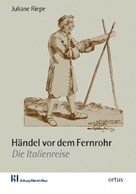 Volume 1 in the series Studien Stiftung Händel-Haus (Halle) Volume 1 in the series Studien Stiftung Händel-Haus (Halle)
Thomas Seedorf (editor): Händels Arien: Form, Affekt Kontext – Bericht über die Symposien 2008 bis 2010
Internationalen Händel-Akademie Karlsruhe, vol. 10 (Laaber-Verlag, 2013):
Wolfgang Ruf: 'Georg Friedrich Händels Arien: Vollendung einer großen Tradition', pp. 13—31
Sabine Ehrmann-Herfort: 'Experiment, Kontext, Formenvielfalt. Arien in Händels italienischen Werken', pp. 33—46
Paul van Reijen: 'Agrippina: Händels venezianisches Finale. Aspekte vergleichender Interpretationskritik', pp. 47—54
Thomas Seedorf: 'Zwischen Komposition und Aufführung. Affekt und Virtuosität in Händels frühen Arien', pp. 55—72
Sabine Ehrmann-Herfort: 'Europäische Stationen einer italienischen Oper. Georg Friedrich Händels Rinaldo in London (1711) und Neapel (1718)', pp. 75—88
Panja Mücke: 'Arietta, Arioso, Cavata oder Cavatina? Kleine Arienformen in Händels Opern', pp. 89—99
Paul van Reijen: 'Analytische Beobachtungen zu Händels Radamisto-Fassungen von 1720', pp. 101—109
Michael Zywietz: 'Zur Arientypologie in Händels späten Oratorien', pp. 113—121
Wolfgang Ruf: 'Der Ton der Klage in Händels späten Oratorien', pp. 123—133
Matthew Gardner: 'L’Allegro, Il Penseroso und Il Moderato. Text und musikalische Bildersprache in Händels Arien', pp. 135—153
Silke Leopold: 'Die dramatische Funktion des Dacapo in Händels Oratorien', pp. 155—164
Ruth Smith: Charles Jennens: The Man Behind Handel's Messiah
(Handel House Trust and Gerald Coke Handel Foundation, London, 2012)
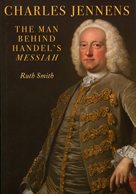 Illustrated catalogue and fascinating biography published in conjuction with special exhibition at the Handel House Museum, and available from the museum bookshop (ISBN: 978-0-9560998-2-2) Illustrated catalogue and fascinating biography published in conjuction with special exhibition at the Handel House Museum, and available from the museum bookshop (ISBN: 978-0-9560998-2-2)
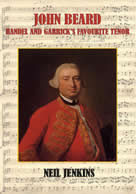 "The tenor John Beard had a fascinating life, and was the first male theatrical personality to marry into the aristocracy when he wed Lady Henrietta Herbert secretly in 1739. Beard – an Anglican who had been brought up in the Chapel Royal choir – thus found himself wed to a catholic descendant of King James II, and a close relation by marriage of Bonny Prince Charlie. At the age of 19 Handel plucked Beard from the choir and gave him starring tenor roles in his Italian operas. When Handel turned instead to the composition of oratorios, it was Beard who created the leading tenor parts in such works as Judas Maccabaeus, Samson, Belshazzar and Jephtha. At the two London patent theatres, Drury Lane and Covent Garden, he gained further fame as the foremost Macheath of his day in John Gay’s perennially popular The Beggar’s Opera; as the performer of Arne’s delightful songs in Garrick’s staging of Shakespeare plays; and as a principal singer in Ballad Operas and Pantomimes." "The tenor John Beard had a fascinating life, and was the first male theatrical personality to marry into the aristocracy when he wed Lady Henrietta Herbert secretly in 1739. Beard – an Anglican who had been brought up in the Chapel Royal choir – thus found himself wed to a catholic descendant of King James II, and a close relation by marriage of Bonny Prince Charlie. At the age of 19 Handel plucked Beard from the choir and gave him starring tenor roles in his Italian operas. When Handel turned instead to the composition of oratorios, it was Beard who created the leading tenor parts in such works as Judas Maccabaeus, Samson, Belshazzar and Jephtha. At the two London patent theatres, Drury Lane and Covent Garden, he gained further fame as the foremost Macheath of his day in John Gay’s perennially popular The Beggar’s Opera; as the performer of Arne’s delightful songs in Garrick’s staging of Shakespeare plays; and as a principal singer in Ballad Operas and Pantomimes."
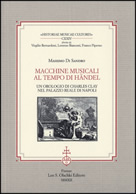 "This book adds a new episode to the story of the collaboration between Handel and the English clockmaker "This book adds a new episode to the story of the collaboration between Handel and the English clockmaker
Charles Clay (†1740): the building of an organ clock completed in 1730 and now kept in Naples. Its ten musical
pieces were transcribed directly from the musical cylinder. The volume explores Clay's work, the tradition he
started and its influence on machines for listening to 'recorded' music."
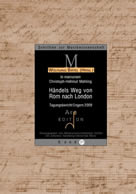 Matthias Schnettger: 'Von Halle über Hamburg und Rom nach London', pp. 5—29 Matthias Schnettger: 'Von Halle über Hamburg und Rom nach London', pp. 5—29
John H. Roberts: '"At first coming to England": Handel’s Habsburg Serenata', pp. 31—61
Donald Burrows: 'The re-composition of Handel's Italian Music for London in Rinaldo', pp. 63—83
Monika Hennemann: '"A Most Extraordinary Mania" – Händel und die englische Aufführungstradition des 19. Jahrhunderts', pp. 85—109
Jan Assmann: 'Pathosformeln in Händels Rinaldo', pp. 111—135
Olaf Brühl: 'Händel, das Theater und die Epochen', pp. 137—174
Silke Leopold: 'Händel und die Prosodien', pp. 175—186
Wolfgang Ruf: 'Praise of Harmony – Händel und Santa Cecilia', pp. 187—205
Dörte Schmidt: 'Zwischen Literatur und Theater – Händel, Metastasio und Italien in London', pp. 207—229
Matthew Gardner: 'Händel, seine englischen Zeitgenossen und die Corelli-Tradition in London – Traditionen und Kompositionsformen', pp. 231—247
Sabine Ehrmann-Herfort: 'Rinaldos Weg von London nach Italien: die Stationen London (1711), Hamburg (1715) und Neapel (1718)', pp. 249—271
Olaf Brühl: 'Nel dolce tempo – Händel a Napoli 1708', pp. 273—292
The Handel Institute Newsletter,
Volume 23 Number 2 (Autumn 2012):
Ruth Smith: 'Opera in Tempore Belli: English Traditions in Rinaldo Revisited', pp. 2—6
[also Donald Burrows on The Handel Institute's 25th anniversary; details of the 2012 'Handel at Court' conference; news items and reviews]
Donald Burrows: Handel
('Master Musicians' series, 2nd edition, Oxford University Press, 2012)
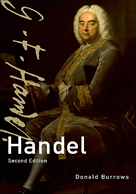 "This biography provides a comprehensive and balanced account ... drawing on the unusually rich legacy of documentary and musical sources from Handel's lifetime. This new edition of a book that has been recognized as a 'classic' biography of Handel, reliable on the factual details of the composer's life and comprehensive in the coverage of his music, incorporates a great deal of new material. The last half century has seen a great renewal of research on the circumstances of Handel's life, and a major expansion in performances and recordings of his music. The book brings together the results of this scholarly activity, and is informed by wide experience of modern performances of Handel's music, including the revival of his operas and experimentation with 'authentic' performance practices." "This biography provides a comprehensive and balanced account ... drawing on the unusually rich legacy of documentary and musical sources from Handel's lifetime. This new edition of a book that has been recognized as a 'classic' biography of Handel, reliable on the factual details of the composer's life and comprehensive in the coverage of his music, incorporates a great deal of new material. The last half century has seen a great renewal of research on the circumstances of Handel's life, and a major expansion in performances and recordings of his music. The book brings together the results of this scholarly activity, and is informed by wide experience of modern performances of Handel's music, including the revival of his operas and experimentation with 'authentic' performance practices."
Händel-Jahrbuch 58 (Bärenreiter, 2012):
Thomas Seedorf: '". . . to procure Singers for the English Stage": Händel als Agent der Royal Academy of Music', pp. 15—27
Michael Walter: 'Händel, die Londoner Oper und der europäische Sängermarkt', pp. 29—40
Philipp Kreisig: 'Londoner Opernunternehmen und Hofoper: Händels Sängerinszenierung im Vergleich', pp. 41—56
Alina Żórawska-Witkowska: 'Die Karriere von Domenico Annibali und seine Händelschen Opernrollen', pp. 57—71
Janice B. Stockigt and Jóhannes Ágústsson: 'A petition to August III from Theodor Christlieb Reinhold', pp. 73—87
Raffaele Mellace: 'German composers and 'Italian' music: Cajo Fabricio between Rome, Dresden and London', pp. 89—100
Ortrun Landmann: 'Ein Londoner Musiker aus Dresden: Johann Christian Fischer', pp. 101—129
Donald Burrows: 'A German in London: the trail of a 'European' music copyist', pp. 130—149
Ben Byram-Wigfield: 'Antonio Lotti' s time in Dresden and his influence on Handel' s music and performance', pp. 151—161
John H. Roberts: 'Nightingales Remembered: Handel' s Debt to Lotti' s Dresden Operas', pp. 163—184
Panja Mücke: 'Transferwege und Blockaden: Zu Händels Borrowings im frühneuzeitlichen Kommunikationssystem', pp. 185—203
Steffen Voss: 'Englische Musik der Barockzeit
im Repertoire der "Schrank II"-Sammlung', pp. 205—217
Undine Wagner: 'Von der Bühne in die Kirche. Geistliche Kontrafakturen aus italienischen Opern von Georg Friedrich Händel und
Johann Adolf Hasse in den böhmischen Ländern', pp. 219—251
Peter Schmitz: 'Fortunato Santini und die römische Händel-Pflege in der ersten Hälfte des 19. Jahrhunderts', pp. 253—270
Eva Zöllner: 'Zu den Anfängen der Händel-Rezeption in Skandinavien', pp. 463—471
John H. Roberts: 'The Riddle of Riccardo primo', pp. 473—494
(and several other articles not connected to Handel)
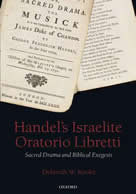 "Combining the insights of present-day biblical studies with those of Handelian studies, Deborah W. Rooke examines the libretti of ten oratorios - Esther, Deborah, Athalia, Saul, Samson, Joseph and his Brethren, Judas Macchabaeus, Solomon, Susanna and Jephtha - and evaluates the relationship between each libretto and the biblical story on which it is based. Rooke comments on each biblical text from a modern scholarly perspective, and then compares the modern interpretation with the version of the biblical narrative that appears in the relevant libretto. Where the libretto is based on a prior dramatic or literary adaptation of the biblical narrative, she also discusses the prior adaptation and how it relates to both the biblical text and the corresponding oratorio libretto. In this way the distinctive nuances of the oratorio libretti are highlighted, and each libretto is then analysed and interpreted in the light of eighteenth-century religion, scholarship, culture and politics. The result is a fascinating exploration not only of the oratorio libretti but also of how culture and context determines the nature of biblical interpretation." "Combining the insights of present-day biblical studies with those of Handelian studies, Deborah W. Rooke examines the libretti of ten oratorios - Esther, Deborah, Athalia, Saul, Samson, Joseph and his Brethren, Judas Macchabaeus, Solomon, Susanna and Jephtha - and evaluates the relationship between each libretto and the biblical story on which it is based. Rooke comments on each biblical text from a modern scholarly perspective, and then compares the modern interpretation with the version of the biblical narrative that appears in the relevant libretto. Where the libretto is based on a prior dramatic or literary adaptation of the biblical narrative, she also discusses the prior adaptation and how it relates to both the biblical text and the corresponding oratorio libretto. In this way the distinctive nuances of the oratorio libretti are highlighted, and each libretto is then analysed and interpreted in the light of eighteenth-century religion, scholarship, culture and politics. The result is a fascinating exploration not only of the oratorio libretti but also of how culture and context determines the nature of biblical interpretation."
The Handel Institute Newsletter,
Volume 23 Number 1 (Spring 2012):
Graydon Beeks: 'Notes on the Cannons Music Catalogues', pp. 1—3
Lowell Lindgren: 'Cantatas and Arias in the Collection of Griselda Baillie (1692—1759), pp. 4—5
Katie Hawks: 'Looking for Richard: why Handel wrote Riccardo primo', pp. 5—7
Göttinger Händel-Beiträge 14 (Vandenhoeck & Ruprecht, Göttingen, 2012):
Wolfgang Hirschmann: 'Zwei Kapellmeister im Dienste des Hauses Hannover: Agostino Steffani und Georg Friedrich Händel', pp. 3—21
Herbert Schneider: 'Händel und Frankreich – Frankreich und Händel', pp. 23—49
Joachim Kremer: 'Händel, Frankreich und die Rolle des "Französischen" für den vermischten
Geschmack', pp. 57—81
Arnold Jacobshagen: 'Händels Teseo und die Tradition der französischen Oper', pp. 83—93
Monika Woitas: 'Getanzte Träume – Händel, Marie Sallé und die Verzauberung der Oper', pp. 95—103
Anselm Gerhard:'"Innig mit der Auffassung der Gegenwart verschmolzen" – Meyerbeer und
Gounod als Bearbeiter von Opernarien Händels', pp. 105—112
Melanie Wald-Fuhrmann: '"Maggior d'Orfeo": Künstlerischer Erfolg als Weg in die Elite? Überlegungen zur Selbstdarstellung und Fremdwahrnehmung Händels in Italien', pp. 115—137
Eike Christian Hirsch: 'Händel unter Verdacht', pp. 139—151
Hans Joachim Marx: 'Händels lateinische Motette Silete venti (HWV 242) – Ein Auftragswerk für Paris?', pp. 153—165
Hans Joachim Marx and Steffen Voss: 'Die Händel zugeschriebenen Kompositionen IV (Orchesterwerke, HWVAnh. B 301–368)', pp. 167—213
Wilhelm Gloede: 'Schlusshemiolen und "Anfangshemiolen" bei Händel', pp. 215—228
Beverly Jerold: 'Overdotting in Handel's Overtures Reconsidered', pp. 229—252
Ilias Chrissochoidis: 'Handelian oratorio and the sublime according to John Baillie', pp. 253—263
Michael Talbot: 'From Giovanni Stefano Carbonelli to John Stephen Carbonell: A violinist turned vintner in Handel's London', pp. 265—299
Matthew Gardner: 'Handel, His Contemporaries and Early English Oratorio',
Muzikološki Zbornik / Musicological Annual Vol. 48 No. 1 (2012), pp. 37—48
John A. Rice: 'Did Haydn attend the Handel commemoration in Westminster Abbey?',
Early Music, Volume 40 Number 1 (February 2012), pp. 73—80
John Byrt: 'Inequality in Alessandro Scarlatti and Handel: a sequel',
Early Music, Volume 40 Number 1 (February 2012), pp. 91—110
Cheryll Duncan and David Mateer: 'An Innocent Abroad? Caterina Galli's Finances in New Handel Documents',
Journal of the American Musicological Society, Volume 64 Number 3 (Fall 2011), pp. 495—526
Minji Kim: 'Significance and effect of the stile antico in Handel's oratorios',
Early Music, Volume 39 Number 4 (November 2011), pp. 563—574
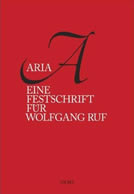 Essays discussing Handel include: Essays discussing Handel include:
Sabine Ehrmann-Herfort: 'Arie und Szene in Georg Friedrich Händels Kantate Qual ti riveggio (HWV 150)', pp. 233—252
Terence Best: '"Prima le parole, poi la musica": One text but two different settings — Handel's approach to an aria in Radamisto', pp. 253—267
Graydon Beeks: '"Hide me from Day's garish Eye": The Construction of a Handel Aria",
pp. 268—279
Donald Burrows: '"Sometimes it is impossible to guess why Handel was so scrupulous": Handel's versions of the aria "Thou art gone up on high" in Messiah',
pp. 280—307
Colin Timms: 'More Perspectives on Theodora',
pp. 308—316
Hans Dieter Clausen: 'Händel oder Smith? Neue Aspekte zur Autorschaft der neu komponierten oder bearbeiteten Arien und Chorssätze in den Oratorienaufführungen zwischen 1752 und 1759',
pp. 317—330
Konstanze Musketa: 'O salutaris hostia und Tantum ergo — zwei parodierte Opernarien von Georg Friedrich Händel in der katholischen Kirchenmusik', pp. 331—340
Annette Landgraf: 'Das "berühmte Largo". Zur Rezeptionsgeschichte der Arie "Ombra mai fu" aus Serse von Georg Friedrich Händel',
pp. 341—353
The Handel Institute Newsletter,
Volume 22 Number 2 (Autumn 2011):
Brenda Sumner: 'Charles Jennens' Piano and Music Room', pp. 1—3
Donald Burrows: 'The Balfour Handel Collection',
Understanding Bach, vol. 6 (2011), pp. 53—55
Full article
Händel-Jahrbuch 57 (Bärenreiter, 2011):
Anselm Gerhard: 'Judas Maccabaeus in der Sprache Racines. Die "Einbürgerung" Händels
nach Frankreich in den 1830er und 1840er Jahren', pp. 11—29
Gerhard Poppe: 'Die Komposition des Dixit Dominus HWV 232 und ihre Voraussetzungen', pp. 31—48
Alina Żórawska-Witkowska: 'Űber die polnischen Elemente im dramma per musica Ottone, re di Germania (London 1722/23) von Georg Friedrich Händel', pp. 49—76
Dorothea Schröder: 'Wer ist Zoroastro? Bemerkungen zur Bassrolle in Händels Oper Orlando', pp. 77—92
Steffen Voss: 'Eine frühe Händel-Quelle aus Frankfurt am Main in der Universitäts- und Landesbibliothek Halle: Das Musikbuch des Heinrich Remigius Bartels', pp. 93—105
Hartmut Krones: 'Georg Friedrich Händel und die Rhetorik', pp. 107—145
Hansjörg Drauschke: 'Händels Opern in Hamburg: Aspekte der Bearbeitung und Anverwandlung', pp. 147—173
Panja Mücke: 'Tugenden und Affekte. Zur Emotionsdarstellung in Händels Opern', pp. 175—192
John H. Roberts: 'Souvenirs de Florence: Additions to the Handel Canon', pp. 193—221
Dinko Fabris: 'The "Aria a 2 Sirene" (Rinaldo HWV 7a): A Neapolitan Emblem', pp. 223—247
Jürgen Heidrich: '"Europens übertünchte Höflichkeit": Händel und der Orient', pp. 249—258
Paul van Reijen: '"Authentische" Aufführungsmodalitäten in Händels Concerti grossi op. 6', pp. 259—270
Olaf Brühl: 'Händel maskiert und ohne Geheimnis? Ausblendungen, Projektionen und interdisziplinärer Diskurs', pp. 271—304
Albert Gier: 'Damen, Ritter, Waffen und Liebe. Ariostos Orlando Furioso auf der Opernbühne', pp. 307—332
Wulf Konold: 'Händels Oper Alceste - Zur Rekonstruktion eines Fragments' in Gluck auf dem Theater
ed. Daniel Brandenburg and Martina Hochreiter (Bärenreiter, Kassel, 2011), pp. 313—317
Ilias Chrissochoidis: 'Reforming Handel: John Brown and The Cure of Saul (1763)',
Journal of the Royal Musical Association, Volume 136 Number 2 (November 2011), pp. 207—245
Donald Burrows: 'Good for the garden: the composition of Handel's Ariodante' in The Stage's Glory: John Rich (1692—1761), ed. Berta Joncus and Jeremy Barlow (University of Delaware Press,
Newark, 2011),
pp. 149—156
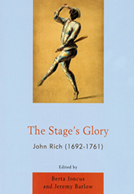 "John Rich was a profoundly influential figure of the eighteenth—century London stage. As producer, manager, and performer, he transformed the urban entertainment market, creating genres and promotional methods still with us today. This volume gives the first comprehensive overview of Rich's multifaceted career, appreciation of which has suffered from his performing identity as Lun, London's most celebrated Harlequin. Far from the lightweight buffoon that this stereotype has suggested, Rich - the first producer of The Beggar's Opera, the founder of Covent Garden, the dauntless backer of Handel, and the promoter of the principal dancers from the Parisian opera - is revealed as an agent of changes much more enduring than those of his younger contemporary, David Garrick. Contributions by leading scholars from a range of disciplines- theatre, dance, music, art, and cultural history - provide detailed analyses of Rich's productions and representations." "John Rich was a profoundly influential figure of the eighteenth—century London stage. As producer, manager, and performer, he transformed the urban entertainment market, creating genres and promotional methods still with us today. This volume gives the first comprehensive overview of Rich's multifaceted career, appreciation of which has suffered from his performing identity as Lun, London's most celebrated Harlequin. Far from the lightweight buffoon that this stereotype has suggested, Rich - the first producer of The Beggar's Opera, the founder of Covent Garden, the dauntless backer of Handel, and the promoter of the principal dancers from the Parisian opera - is revealed as an agent of changes much more enduring than those of his younger contemporary, David Garrick. Contributions by leading scholars from a range of disciplines- theatre, dance, music, art, and cultural history - provide detailed analyses of Rich's productions and representations."
(the 2008 conference on which this book is based featured several more papers discussing Handel which were not included in the publication)
Alessandra Mercantini: 'Il Trionfo del Tempo e del Disinganno: Benedetto Pamphilij e la vanitas' in Vanitas: Lotto, Caravaggio, Guercino nella Collezione Doria Pamphilj, catalogue of an exhibition at the Palazzo Doria Pamphilij curated by Alessandra Mercantini (Silvana Editorale, Milan, 2011), pp. 45—53
David Hunter: 'Handel's students, two lovers and a shipwreck',
Early Music, Volume 39 Number 2 (May 2011), pp. 157—164
Thomas McGeary: 'Joseph Harris, Birmingham organist (1744—1814), and his Messiah manuscript',
Early Music, Volume 39 Number 2 (May 2011), pp. 165—184
Thomas McGeary: 'Handel and Homosexuality: Burlington House and Cannons Revisited',
Journal of the Royal Musical Association, Volume 136 Number 1 (May 2011), pp. 33—71
Donald Burrows: 'HWV 301 and all that: the history of Handel's "oboe concertos"',
The Musical Times (Spring 2011), pp. 3—6
The Handel Institute Newsletter, Volume 22 Number 1 (Spring 2011):
Andrew V. Jones: 'Further thoughts on Borrowings in Handel's Agrippina', pp. 1—5
Colin
Timms: 'Archive Notes on Singers in Agrippina', pp. 6—9
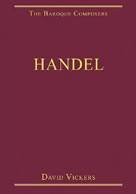 "This anthology represents scholarly literature devoted to Handel over the last few decades, and contains different kinds of studies of the composer's biography, operatic career, singers, librettists, and his relationship with the music of other composers. Case studies range from recent research that transforms our knowledge of large—scale English works to an interdisciplinary exploration of an individual opera aria. Designed to bring easy and convenient access to students, performers and music lovers, the wide—ranging articles are selected ... from diverse sources — not only familiar important journals, but also specialist yearbooks, festschrifts, not easily accessible newsletters, conference proceedings and exhibition catalogues. Many of these represent an up—to—date understanding of modern Handel studies, deal with fascinating biographical issues (such as the composer's art collection, his chronic health problems, and the nature of popular anecdotal evidence), and fill gaps in the mainstream Handelian literature." "This anthology represents scholarly literature devoted to Handel over the last few decades, and contains different kinds of studies of the composer's biography, operatic career, singers, librettists, and his relationship with the music of other composers. Case studies range from recent research that transforms our knowledge of large—scale English works to an interdisciplinary exploration of an individual opera aria. Designed to bring easy and convenient access to students, performers and music lovers, the wide—ranging articles are selected ... from diverse sources — not only familiar important journals, but also specialist yearbooks, festschrifts, not easily accessible newsletters, conference proceedings and exhibition catalogues. Many of these represent an up—to—date understanding of modern Handel studies, deal with fascinating biographical issues (such as the composer's art collection, his chronic health problems, and the nature of popular anecdotal evidence), and fill gaps in the mainstream Handelian literature."
Graydon Beeks: ' Haydn, Handel and the Concerts of Ancient Music ' in Haydn and his Contemporaries, ed. Sterling E. Murray
(Steglein, Ann Arbor, 2011), pp. 28—38
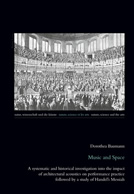 "This book explores a paradox: how can a musical work that was written specifically for a certain architectural space «survive» dramatic changes in performance conditions, as in the case of Handel's Messiah? From the chamber music hall in Dublin where it was first performed in 1742, small baroque theaters, and the chapel of London's Foundling Hospital, performances of Messiah after Handel's death moved to cathedrals, to new and large 19th-century concert halls, and finally to the immense Crystal Palace in Sydenham. Are there boundaries determining an adequate performance? How can we define the quality of room acoustics and how does this quality affect the performance as actual sonorous presentation of a musical work? In short, how do different acoustical conditions affect basic aesthetic premises?" "This book explores a paradox: how can a musical work that was written specifically for a certain architectural space «survive» dramatic changes in performance conditions, as in the case of Handel's Messiah? From the chamber music hall in Dublin where it was first performed in 1742, small baroque theaters, and the chapel of London's Foundling Hospital, performances of Messiah after Handel's death moved to cathedrals, to new and large 19th-century concert halls, and finally to the immense Crystal Palace in Sydenham. Are there boundaries determining an adequate performance? How can we define the quality of room acoustics and how does this quality affect the performance as actual sonorous presentation of a musical work? In short, how do different acoustical conditions affect basic aesthetic premises?"
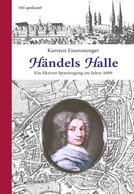
Donald Burrows: 'Lists of Musicians for Performances of Handel’s Messiah at the Foundling Hospital, 1754—1777',
Royal Musical Association Research Chronicle, vol. 43 (2010), pp. 85—109
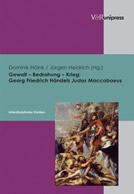 "Judas Maccabaeus is one of the most significant English oratorios of the 18th century. Taking up a topos used in England since the 16th century identifying the British with the biblical people of Israel, Handel composed a number of biblical oratorios reflecting the political situation at the time. Through its association with the Duke of Cumberland, the Jacobite Rising or the struggle for cultural identity, Judas Maccabaeus is charged with political significance and thus a perfect example of the entanglements between religion and politics as depicted in oratorios. The authors examine the work from the perspective of their respective disciplines (musicology, theology, history, English studies and Jewish studies), from its textual source and the composition of the work to its reception in the 20th century. Detailed studies examine the literary and musical adaptation of the underlying theme of violence and war including the theological and political implications and its reception." "Judas Maccabaeus is one of the most significant English oratorios of the 18th century. Taking up a topos used in England since the 16th century identifying the British with the biblical people of Israel, Handel composed a number of biblical oratorios reflecting the political situation at the time. Through its association with the Duke of Cumberland, the Jacobite Rising or the struggle for cultural identity, Judas Maccabaeus is charged with political significance and thus a perfect example of the entanglements between religion and politics as depicted in oratorios. The authors examine the work from the perspective of their respective disciplines (musicology, theology, history, English studies and Jewish studies), from its textual source and the composition of the work to its reception in the 20th century. Detailed studies examine the literary and musical adaptation of the underlying theme of violence and war including the theological and political implications and its reception."
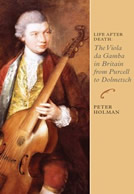 "It is normally thought that the bass viol or viola da gamba dropped out of British musical life in the 1690s, and that Henry Purcell was the last composer to write for it. Peter Holman shows how the gamba changed its role and function in the Restoration period under the influence of foreign music and musicians; how it was played and composed for by the circle of immigrant musicians around Handel; how it was part of the fashion for exotic instruments in the middle of the century; and how the presence in London of its greatest eighteenth-century exponent, Charles Frederick Abel, sparked off a revival in the 1760s and 70s. Later chapters investigate the gamba's role as an emblem of sensibility among aristocrats, artists, and intellectuals, ... and trace Abel's influence and legacy far into the nineteenth century. A concluding chapter is concerned with its role in the developing early music movement, culminating with Arnold Dolmetsch's first London concerts with old instruments in 1890." "It is normally thought that the bass viol or viola da gamba dropped out of British musical life in the 1690s, and that Henry Purcell was the last composer to write for it. Peter Holman shows how the gamba changed its role and function in the Restoration period under the influence of foreign music and musicians; how it was played and composed for by the circle of immigrant musicians around Handel; how it was part of the fashion for exotic instruments in the middle of the century; and how the presence in London of its greatest eighteenth-century exponent, Charles Frederick Abel, sparked off a revival in the 1760s and 70s. Later chapters investigate the gamba's role as an emblem of sensibility among aristocrats, artists, and intellectuals, ... and trace Abel's influence and legacy far into the nineteenth century. A concluding chapter is concerned with its role in the developing early music movement, culminating with Arnold Dolmetsch's first London concerts with old instruments in 1890."
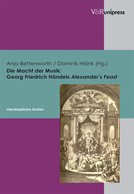 "John Dryden’s poem Alexander’s Feast or The Power of Music – an Ode in Honour of St. Cecilia’s Day (1697) was highly praised by critics and set to music by George Frideric Handel in 1736. The musical version was also a celebrated work of art. Even though the poem was written for St. Cecilia’s Day, it is set not in the Christian era but in the time of Alexander the Great after his conquest of the Persian capital Persepolis. This collection of essays explores the piece from different perspectives (English Literature, Classical Philology, Musicology, Theology) and provides new results gained from interdisciplinary studies. Special attention is paid to the relationship between language and music. The book includes a list of performances containing unpublished material as well as a discography and indices of names and objects. It is thus a useful compendium both for specialists and a broader public." "John Dryden’s poem Alexander’s Feast or The Power of Music – an Ode in Honour of St. Cecilia’s Day (1697) was highly praised by critics and set to music by George Frideric Handel in 1736. The musical version was also a celebrated work of art. Even though the poem was written for St. Cecilia’s Day, it is set not in the Christian era but in the time of Alexander the Great after his conquest of the Persian capital Persepolis. This collection of essays explores the piece from different perspectives (English Literature, Classical Philology, Musicology, Theology) and provides new results gained from interdisciplinary studies. Special attention is paid to the relationship between language and music. The book includes a list of performances containing unpublished material as well as a discography and indices of names and objects. It is thus a useful compendium both for specialists and a broader public."
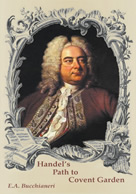 "Many Classical music lovers are familiar with George Frideric Handel's famous oratorio Messiah, but are not aware his preferred area of composition was Italian opera seria. Biographical books explore his career as an opera composer and the rise of the new pious genre when Italian opera was no longer popular in London, but rarely do we find detailed accounts or discussions on that tempestuous period in the 1730s when this shift in populaity forced Handel to leave the Haymarket theatre and join with John Rich at Covent Garden where he tried to carry on the Royal Academy opera company in competition with the new Opera of the Nobility venture founded by the Prince of Wales ... This book explores this rocky transition period and how it affected Handel's work, namely, his inclusion of French elements to his operas and other novel innovations in order to regain his chagrined public." "Many Classical music lovers are familiar with George Frideric Handel's famous oratorio Messiah, but are not aware his preferred area of composition was Italian opera seria. Biographical books explore his career as an opera composer and the rise of the new pious genre when Italian opera was no longer popular in London, but rarely do we find detailed accounts or discussions on that tempestuous period in the 1730s when this shift in populaity forced Handel to leave the Haymarket theatre and join with John Rich at Covent Garden where he tried to carry on the Royal Academy opera company in competition with the new Opera of the Nobility venture founded by the Prince of Wales ... This book explores this rocky transition period and how it affected Handel's work, namely, his inclusion of French elements to his operas and other novel innovations in order to regain his chagrined public."
Ilias Chrissochoidis: '"Hee-Haw ... Hallelujah": Handel among the Vauxhall Asses (1732)',
Eighteenth-century Music, Volume 7 Number 2 (September 2010), pp. 221—262
The Handel Institute Newsletter,
Volume 21 Number 2 (Autumn 2010):
Colin Timms: 'Archive Notes on Singers in Rodrigo', pp. 5—8
Händel-Jahrbuch 56 (Bärenreiter, 2010):
Ulrich Konrad: 'Schnittpunkte europäischer Musik. London, Wien, Berlin – Händel, Haydn, Mendelssohn', pp. 17—37
Reinhard Strohm: 'Händel und der Diskurs der Moderne', pp. 41—63
Donald Burrows: 'Bringing Europe to Britain: Handel’s First Decade in London', pp. 65—77
Hans Joachim Marx: 'Händels Religiosität im Kontext der europäischen Konfessionen', pp. 79—99
Juliane Riepe: '"der Weg zu seinem ganzen zeitlichen Glücke": Überlegungen zu Händels Italienreise vor dem Hintergrund der neueren Reiseforschung', pp. 101—138
Ruth Smith: 'Milton moderated: Il Moderato and its relation to L’Allegro and Il Penseroso', pp. 139—164
Colin Timms: 'Perspectives on Theodora', pp. 165—184
Hans Dieter Clausen: 'Elemente des Tragischen in Händels Oratorien', pp. 185—202
Raffaele Mellace: '"The King shall rejoice"? The Voice of Monarchs in Handel’s Operas', pp. 203—218
Janice B. Stockigt: 'Handel Borrowed: Handel’s operatic aria “Son confusa pastorella” refashioned as a sacred motet “Huc pastores properate” by Jan Dismas Zelenka', pp. 219—235
Christoph Henzel: 'Arminius in Braunschweig', pp. 237—253
Annette Landgraf: 'Die Rezeption der dramatischen Werke Händels unter dem Einfluss der poetischen Gerechtigkeit und der moralischen Konzeption der Figuren in den Libretti', pp. 255—271
Edwin Werner: '"O du werter Freudengeist" – fruchtbare Unterweisung durch Friedrich Wilhelm Zachow', pp. 273—288
Stefan Keym: 'Händel und die Sonatentradition Corellis', pp. 289—313
Siegbert Rampe: 'Händel und die Anfänge des Solokonzerts', pp. 315—338
Graydon Beeks: 'William Sexton’s Arrangements of Handel’s Cannons Anthems for use in the Anglican Cathedral Tradition', pp. 339—350
Kathrin Eberl-Ruf: 'Eine bisher unbekannte Quelle von Händels Judas Maccabaeus in deutscher Bearbeitung', pp. 351—373
Michaela Freemanova: 'Heinrich Wilhelm von Haugwitz: "Uibersetzer der Iphigenia in Aulis" in process of translation and arrangement of Handel’s works', pp. 375—393
Hans-Georg Hofmann: '"Bach war nur zu finster – Händel besaß die Kunst zu bergen":
Händel-Rezeption in den Universalenzyklopädien und Konversationslexika der Aufklärung', pp. 395—410
Joachim Kremer: 'Händel-Aufführungen in den Lehrerseminaren des 19. Jahrhunderts – Spurensuche in Preußen und Württemberg', pp. 411—426
Michael Talbot: 'A Shadowy Presence on the Periphery of Handel’s Circle in London: The Venetian Singer-Composer Girolamo Polani', pp. 427—444
Samantha Owens: 'Johann Sigismund Cousser (Kusser): a “European” in Early Eighteenth-century England and Ireland', pp. 445—467
Karin Zauft: 'Händels Opern im Bann innovativer Theaterkonzepte des 20. Jahrhunderts', pp. 469—483
Arnold Jacobshagen: 'Rekonstruktion und Verwandlung Zur Analyse und Interpretation zeitgenössischer Händel-Inszenierungen', pp. 485—506
Matthew Gardner: 'Handel on Screen 1942—2009', pp. 507—527
John H. Roberts: 'False Messiah',
Journal of the American Musicological Society, Volume 63 Number 1 (Spring 2010), pp. 45—97
The Handel Institute Newsletter,
Volume 21 Number 1 (Spring 2010):
Terence Best: 'Who sang in La Resurrezione?', pp. 6—7
Illias Chrissochoidis: 'Senesino's Black Boy', pp. 7—8
Colin Timms: 'A Borrowing from Vivaldi in Theodora', pp. 8—9
Annette Landgraf and David Vickers (editors): The Cambridge Handel Encyclopedia
(Cambridge University Press, 2009)
 "George Frideric Handel was born and educated in Germany, flourished in Italy, and chose to become British. One of the most cosmopolitan of the great composers, much of Handel's music has remained in the popular repertory since his lifetime, and a broad variety of his music theatre works from Italian operas to English oratorios have experienced a dramatic renaissance since the late twentieth century. A large number of publications devoted to Handel's life and music have appeared from his own time to the present day, but The Cambridge Handel Encyclopedia is the first resource to gather the full range of present knowledge and leading new scholarship into a single volume for convenient and illuminating reference. Packed with 700 informative and accessible entries both long and short, this book is ideal for performers, scholars, students and music lovers who wish to explore the Handelian world." "George Frideric Handel was born and educated in Germany, flourished in Italy, and chose to become British. One of the most cosmopolitan of the great composers, much of Handel's music has remained in the popular repertory since his lifetime, and a broad variety of his music theatre works from Italian operas to English oratorios have experienced a dramatic renaissance since the late twentieth century. A large number of publications devoted to Handel's life and music have appeared from his own time to the present day, but The Cambridge Handel Encyclopedia is the first resource to gather the full range of present knowledge and leading new scholarship into a single volume for convenient and illuminating reference. Packed with 700 informative and accessible entries both long and short, this book is ideal for performers, scholars, students and music lovers who wish to explore the Handelian world."
Commended as one of the 2010 Books of the Year in the Times Literary Supplement
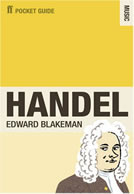 "A larger-than-life figure in his time, Handel’s reputation has been less than steady since his death in 1759. Was he (in the words of Berlioz) just ‘a great barrel of pork and beer’, or (as Handel himself claimed) truly ‘the master of us all’? Now, in this 250th anniversary year, there is more interest in Handel than ever before, with his operas experiencing fantastic renewed popularity. This lively new Pocket Guide goes in search of the composer who wrote Messiah, the Water Music - and much more. ... Edward Blakeman assesses how Handel’s works have stood the test of time and why they can still speak thrillingly to us today. With recommendations throughout for listening, further reading, and web surfing, this is the ideal guide for music lovers who want to discover the great composer for themselves." "A larger-than-life figure in his time, Handel’s reputation has been less than steady since his death in 1759. Was he (in the words of Berlioz) just ‘a great barrel of pork and beer’, or (as Handel himself claimed) truly ‘the master of us all’? Now, in this 250th anniversary year, there is more interest in Handel than ever before, with his operas experiencing fantastic renewed popularity. This lively new Pocket Guide goes in search of the composer who wrote Messiah, the Water Music - and much more. ... Edward Blakeman assesses how Handel’s works have stood the test of time and why they can still speak thrillingly to us today. With recommendations throughout for listening, further reading, and web surfing, this is the ideal guide for music lovers who want to discover the great composer for themselves."
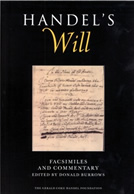 "Produced as a commemorative publication of the 250th anniversary of Handel's death by the Gerald Coke Handel Foundation and to complement the exhibition Handel the Philanthropist. This book includes high quality reproductions of Handel's will, both his personal copy that is on permanent display at the Foundling Museum as well as the executor's copy lent by the Royal College of Music to the exhibition. These facsimiles are accompanied by essays by Professor Ellen Harris and others, edited by Donald Burrows." "Produced as a commemorative publication of the 250th anniversary of Handel's death by the Gerald Coke Handel Foundation and to complement the exhibition Handel the Philanthropist. This book includes high quality reproductions of Handel's will, both his personal copy that is on permanent display at the Foundling Museum as well as the executor's copy lent by the Royal College of Music to the exhibition. These facsimiles are accompanied by essays by Professor Ellen Harris and others, edited by Donald Burrows."
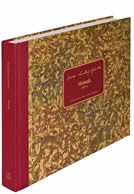 "14 April 2009 is the 250th anniversary of Handel's death. To mark this jubilee year, the British Library and Bärenreiter have joined forces to make the autograph score of Messiah available to a wider public in a meticulously reproduced, lavishly published facsimile. The renowned Handel scholar Donald Burrows introduces the characteristics of Handel's manuscript, describes the history of the work's composition and explains the differences between later versions of Messiah, as reflected in the conducting score. A two page sketch from the Fitzwilliam Museum, Cambridge, completes the publication." "14 April 2009 is the 250th anniversary of Handel's death. To mark this jubilee year, the British Library and Bärenreiter have joined forces to make the autograph score of Messiah available to a wider public in a meticulously reproduced, lavishly published facsimile. The renowned Handel scholar Donald Burrows introduces the characteristics of Handel's manuscript, describes the history of the work's composition and explains the differences between later versions of Messiah, as reflected in the conducting score. A two page sketch from the Fitzwilliam Museum, Cambridge, completes the publication."
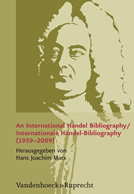 "This bibliography collects the main contributions from the international Handel research from the last 50 years. ... [It] will enable even the layman to get a quick overview of Georg Friedrich Händel's life and work. Details to each classification of music are offered: opera, oratories, vocal and instrumental chamber music, orchestra and keyboard music, reception and interpretation." "This bibliography collects the main contributions from the international Handel research from the last 50 years. ... [It] will enable even the layman to get a quick overview of Georg Friedrich Händel's life and work. Details to each classification of music are offered: opera, oratories, vocal and instrumental chamber music, orchestra and keyboard music, reception and interpretation."
Peter Overbeck: Georg Friedrich Händel
(Suhrkamp, Frankfurt am Main, 2009)
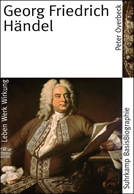
Silke Leopold: Händel. Die Opern.
(Bärenreiter, Kassel, 2009)
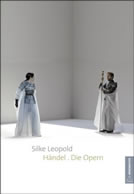 "Handel's operas are not historical moments, but living theater. Recently they "Handel's operas are not historical moments, but living theater. Recently they
have been increasingly performed in their original form rather than being
distorted by arrangements. Many of Handel's roughly forty operas have been
released on CD and DVD, and some have even managed to enter the
repertoire. Yet opera seria still has a reputation for being formulaic, rigid, and
undramatic. The purpose of this book is to explode this preconception and to
explain the lasting magnetism of Handel's stage works. In ten chapters
Silke Leopold treats Handel's music and his ability to
impart uniqueness to
his characters in their arias and ensembles. The
second part is a comprehensive
lexicon of all Handel operas."
Handel Reveal'd
(Handel House Museum exhibition catalogue, London, 2009)
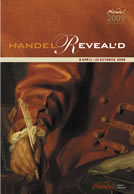 Illustrated catalogue of exhibition curated by Christopher Hogwood, which ran from April to November 2009. Short essays include: Illustrated catalogue of exhibition curated by Christopher Hogwood, which ran from April to November 2009. Short essays include:
Ellen T. Harris: 'Handel and his Investments' (pp. 2—5)
Nicholas Bell: 'Handel and his Manuscripts' (pp. 6—9)
David Hunter: 'Handel and his Health' (pp. 10—13)
Donald Burrows: 'The Royal Music Library and its Handel Collection',
The Electronic British Library Journal (article 2, 2009)
Abstract / Full article (40 pages, colour illustrations)
Thomas McGeary: 'Handel as art collector: art, connoisseurship and taste in Hanoverian Britain',
Early Music, Volume 37 Number 4 (November 2009), pp. 533—574
Ilias Chrissochoidis: 'Handel, Hogarth, Goupy: artistic intersections in early Georgian England',
Early Music, Volume 37 Number 4 (November 2009), pp. 577—596
Patrizio Barbieri: 'An assessment of musicians and instrument—makers in Rome during Handel's stay: the 1708 Grand Taxation',
Early Music, Volume 37 Number 4 (November 2009), pp. 597—619
David Hunter: 'Bridging the gap: the patrons-in-common of Purcell and Handel',
Early Music, Volume 37 Number 4 (November 2009), pp. 621—632
Ilias Chrissochoidis: 'Handel at a Crossroads: His 1737—1738 and 1738—1739 Seasons Re-Examined',
Music & Letters, Volume 90 Number 4 (November 2009), pp. 599—635
Todd Gilman: 'Arne, Handel, the Beautiful, and the Sublime',
Eighteenth-Century Studies, Volume 42 Number 4 (Summer 2009), pp. 529—555
Händel-Jahrbuch 55 (Bärenreiter, 2009):
Wolfgang Hirschmann: 'Opus-Musik oder Aufführungsereignis? Zum Werkcharakter von Händels Oratorien', pp. 11—22
Juliane Riepe: 'Jenseits des Betsaals. Oratorienaufführungen im profanen Kontext im Italien des 17. und 18. Jahrhunderts', pp. 23—64
Karl Böhmer: '"Tragedia Sacra": Alessandro Scarlattis Oratorien im Palazzo della Cancelleria und ihr Einfluss auf Händel', pp. 65—83
Werner Breig: 'La Resurrezione und die Anfänge von Händels Unisono-Arie', pp. 85—106
John H. Roberts: 'Christ of the Playhouse: Indirect Narrative in Handel’s Messiah', pp. 107—124
Matthew Gardner: 'Händel, die Kirche und „geistliche“ Musik im Theater', pp. 125—134
Donald Burrows: 'A Sacred Oratorio for the Theatre: An Experiment that nearly failed', pp. 135—144
Christine Blanken: 'Das wieder aufgefundene Passionsoratorium Der blutige und sterbende Jesus und Reinhard Keisers geistliches Spätschaffen', pp. 145—174
Joachim Kremer: 'Händels Brockespassion – Eine Passion für den Galant-Homme?', pp. 175—194
Rainer Kleinertz: 'Zum Problem der Entlehnungen bei Händel am Beispiel der Brockes-Passion und der ersten Fassung von Esther', pp. 19—–208
Graydon Beeks: 'The Cannons Anthems and the Concerts of Ancient Music', pp. 209—214
Jürgen Heidrich: '"Geistlich" und "weltlich" als musikästhetische Kategorien im Kontext der deutschen Händelrezeption um 1800', pp. 215—223
Christoph Henzel: 'Hiller – Lehmann – Zelter. Zu einigen Berliner Messias-Aufführungen', pp. 225—274
Annette Landgraf: 'Der Kristallpalast und seine Bedeutung für die Aufführung von Händels Musik', pp. 275—286
Paul van Reijen: 'Israel in einem Rotterdamer Pavillon: Händels Oratorium auf dem "Toonkunst"-Jubiläumsmusikfest 1854. Zur zeitgenössischen Berichterstattung', pp. 287—307
Klaus-Peter Koch: 'Aufführungen von oratorischen Werken Händels im östlichen Europa während des 18. und 19. Jahrhunderts', pp. 309—321
Wolfgang Sandberger: 'Geistliche Musik im profanen Raum: Händel—Oratorien im "kultisch ekstatischen Theater" der 1920er Jahre', pp. 323—351
John H. Roberts: 'The Composition of Handel’s Esther, 1718—1720', pp. 353—390
Minji Kim: 'The Messianic Portrait of Cyrus in Handel’s Belshazzar: Theological and Textual Parallels with Messiah', pp. 391—403
Konstanze Musketa: 'Händel als Organist am Dom zu Halle. Neue Quellenfunde', pp. 405—411
Berta Joncus: 'Handel at Drury Lane: Ballad Opera and the Production of Kitty Clive',
Journal of the Royal Musical Association, Volume 131 Number 2 (January 2009), pp. 179—226
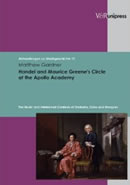 "The Apollo Academy, a musical club founded in 1731 by Maurice Greene and his friend Michael Christian Festing, was the performance location of various oratorios, odes and masques produced by composers in Greene's circle of friends, colleagues and pupils. Many of the works performed both in and outside the academy meetings are based on subjects such as Jephtha, Deborah and the Choice of Hercules which were well-known in eighteenth-century England and also attracted the attention of Handel. This long—overdue study explores these works in terms of their intellectual contexts (political, religious, social and cultural), comparing them to Handel's compositions on the same or similar subjects. Additionally, detailed source information and musical analysis of the works is included as well as a discussion of the competition between Handel and his English contemporaries in order to provide a fuller picture of the diverse musical and cultural life in London during the first half of the eighteenth century." "The Apollo Academy, a musical club founded in 1731 by Maurice Greene and his friend Michael Christian Festing, was the performance location of various oratorios, odes and masques produced by composers in Greene's circle of friends, colleagues and pupils. Many of the works performed both in and outside the academy meetings are based on subjects such as Jephtha, Deborah and the Choice of Hercules which were well-known in eighteenth-century England and also attracted the attention of Handel. This long—overdue study explores these works in terms of their intellectual contexts (political, religious, social and cultural), comparing them to Handel's compositions on the same or similar subjects. Additionally, detailed source information and musical analysis of the works is included as well as a discussion of the competition between Handel and his English contemporaries in order to provide a fuller picture of the diverse musical and cultural life in London during the first half of the eighteenth century."
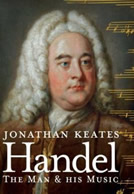 "This fully updated and expanded edition – published to commemorate the 250th anniversary of the composer’s death – charts in detail Handel’s life, from his youth in Germany, through his brilliantly successful Italian sojourn, to the opulence and squalor of Georgian London. ... Jonathan Keates writes with sympathy and penetration about this extraordinary genius, whose career abounded in reversals that would have crushed anyone with less resilience and willpower, but whose influence was to be deeply felt by Haydn, Mozart and Beethoven. Interwoven with the account of Handel’s life are commentaries on all his major works, as well as many less familiar pieces by this most inventive, expressive and captivating of composers." "This fully updated and expanded edition – published to commemorate the 250th anniversary of the composer’s death – charts in detail Handel’s life, from his youth in Germany, through his brilliantly successful Italian sojourn, to the opulence and squalor of Georgian London. ... Jonathan Keates writes with sympathy and penetration about this extraordinary genius, whose career abounded in reversals that would have crushed anyone with less resilience and willpower, but whose influence was to be deeply felt by Haydn, Mozart and Beethoven. Interwoven with the account of Handel’s life are commentaries on all his major works, as well as many less familiar pieces by this most inventive, expressive and captivating of composers."
Hans Joachim Marx (series editor): Das Händel-Handbuch
(6 bands, Laaber Verlag, 2008—2011)
— not to be confused with Bärenreiter's four-band Händel Handbuch (1978—1986) —
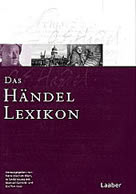 Bulky six-band series of German reference books with dictionary-style entries by many different contributors: Bulky six-band series of German reference books with dictionary-style entries by many different contributors:
1. Händel und seine Zeitgenossen. Eine biographische Enzyklopädie (2 vols., ed. H. J. Marx, 2008)
2. Händels Opern (2 vols., ed. Arnold Jacobshagen and Panja Mücke, 2009)
3. Händels Oratorien, Oden und Serenaten (ed. Michael Zywietz and Greta Haenen, 2010)
4. Händels Kirchenmusik und vokale Kammermusik (ed. H. J. Marx and Michele Calella, 2012)
5. Händels Instrumentalmusik (ed. Siegbert Rampe, 2008)
6. Das Händel-Lexikon (ed. H. J. Marx, Manuel Gervink and Steffen Voss, 2011)
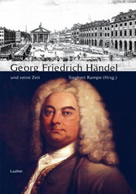
James A. Winn: 'Style and Politics in the Philips—Handel Ode for Queen Anne's Birthday, 1713'
Music & Letters,
Volume 89 Number 4 (November 2008), pp. 547—561
You can view more Handelian books, publications,
and journal articles HERE.
Return to the G. F. Handel Home Page
Unless
explicitly specified otherwise,
this page and all other pages at this site are Copyright © 2015 by David
Vickers and Matthew Gardner
GFHandel.org credits
Last updated:
April 30, 2023
· Site design: Duncan Fielden, Matthew Gardner and David Vickers
|

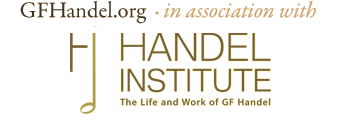
 "What should we consider when thinking about the relationship between an onstage performance and the story the performance tells? A Poetics of Handel's Operas explores this question by analyzing the narratives of Handel's operas in relation to the rich representational fabric of performance used to convey them. Nathan Link notes that in most storytelling genres, the audience can naturally discern between a story and the way that story is represented: with film, for example, the viewer would recognize that a character hears neither her own voiceover nor the ambient music that accompanies it, whereas in discussions of opera, some audiences may be distracted by the seemingly artificial nature of such conventions as characters singing their dialogue. Link proposes that when engaging with opera, distinguishing between the performance we see and hear on the stage and the story represented offers a meaningful approach to engaging with and interpreting the work.
"What should we consider when thinking about the relationship between an onstage performance and the story the performance tells? A Poetics of Handel's Operas explores this question by analyzing the narratives of Handel's operas in relation to the rich representational fabric of performance used to convey them. Nathan Link notes that in most storytelling genres, the audience can naturally discern between a story and the way that story is represented: with film, for example, the viewer would recognize that a character hears neither her own voiceover nor the ambient music that accompanies it, whereas in discussions of opera, some audiences may be distracted by the seemingly artificial nature of such conventions as characters singing their dialogue. Link proposes that when engaging with opera, distinguishing between the performance we see and hear on the stage and the story represented offers a meaningful approach to engaging with and interpreting the work.
 "The life and career of George Frideric Handel, one of the most frequently performed composers from the Baroque period, are copiously and intricately documented through a huge variety of contemporary sources. This multi-volume major publication is the most up-to-date and comprehensive collection of these documents. Presented chronologically in their original languages with English translations and with commentaries incorporating the results of recent research, the documents provide an essential and accessible resource for anyone interested in Handel and his music. In charting Handel's activities and the performance and reception of his music during his lifetime, the documents also offer valuable insights into broader eighteenth-century topics such as court life, theatrical history, public concerts and music publishing. Volume Four begins with the re-establishment of Handel's career in London following his return from Dublin in 1742, and covers the period to 1750 which saw the composition of a succession of his greatest English works for his oratorio seasons, including Samson, Semele, Belshazzar, Judas Maccabaeus and Solomon."
"The life and career of George Frideric Handel, one of the most frequently performed composers from the Baroque period, are copiously and intricately documented through a huge variety of contemporary sources. This multi-volume major publication is the most up-to-date and comprehensive collection of these documents. Presented chronologically in their original languages with English translations and with commentaries incorporating the results of recent research, the documents provide an essential and accessible resource for anyone interested in Handel and his music. In charting Handel's activities and the performance and reception of his music during his lifetime, the documents also offer valuable insights into broader eighteenth-century topics such as court life, theatrical history, public concerts and music publishing. Volume Four begins with the re-establishment of Handel's career in London following his return from Dublin in 1742, and covers the period to 1750 which saw the composition of a succession of his greatest English works for his oratorio seasons, including Samson, Semele, Belshazzar, Judas Maccabaeus and Solomon." "This explores the exchange of music, musicians and musical practice between Britain and the Continent in the period c.1500—1800. Inspired by Peter Holman's research and performing activities, the essays in the volume develop the theme of exchange and dialogue through the lenses of people, practices and repertory and consider the myriad ways in which musical culture participated in the dynamic relationship between Europe and Britain. Key areas addressed are music and travel; music publishing; émigré musicians; performing practice; dissemination of music and musical practice; and instruments."
"This explores the exchange of music, musicians and musical practice between Britain and the Continent in the period c.1500—1800. Inspired by Peter Holman's research and performing activities, the essays in the volume develop the theme of exchange and dialogue through the lenses of people, practices and repertory and consider the myriad ways in which musical culture participated in the dynamic relationship between Europe and Britain. Key areas addressed are music and travel; music publishing; émigré musicians; performing practice; dissemination of music and musical practice; and instruments." Melanie Wald-Fuhrmann: 'Musik und Melancholie:
Mit einer Anwendung auf Händels L'Allegro, il Penseroso ed il Moderato', pp. 7—32
Melanie Wald-Fuhrmann: 'Musik und Melancholie:
Mit einer Anwendung auf Händels L'Allegro, il Penseroso ed il Moderato', pp. 7—32 Introduction: Alison DeSimone and Matthew Gardner
Introduction: Alison DeSimone and Matthew Gardner  "This investigates the ways large-scale music was directed or conducted in Britain before baton conducting took hold in the 1830s. After surveying practice in Italy, Germany and France from Antiquity to the eighteenth century, the focus is on direction in two strands of music making in Stuart and Georgian Britain: choral music from Restoration cathedrals to the oratorio tradition deriving from Handel, and music in the theatre from the Jacobean masque to nineteenth-century opera, ending with an account of how modern baton conducting spread in the 1830s from the pit of the Haymarket Theatre to the Philharmonic Society and to large-scale choral music. Part social and musical history based on new research into surviving performing material, documentary sources and visual evidence, and part polemic intended to question the use of modern baton conducting in pre-nineteenth-century music, Before the Baton throws new light on many hitherto dark areas, though the heart of the book is an extended discussion of the evidence relating to Handel's operas, oratorios and choral music. Contrary to near-universal modern practice, he mostly preferred to play rather than beat time."
"This investigates the ways large-scale music was directed or conducted in Britain before baton conducting took hold in the 1830s. After surveying practice in Italy, Germany and France from Antiquity to the eighteenth century, the focus is on direction in two strands of music making in Stuart and Georgian Britain: choral music from Restoration cathedrals to the oratorio tradition deriving from Handel, and music in the theatre from the Jacobean masque to nineteenth-century opera, ending with an account of how modern baton conducting spread in the 1830s from the pit of the Haymarket Theatre to the Philharmonic Society and to large-scale choral music. Part social and musical history based on new research into surviving performing material, documentary sources and visual evidence, and part polemic intended to question the use of modern baton conducting in pre-nineteenth-century music, Before the Baton throws new light on many hitherto dark areas, though the heart of the book is an extended discussion of the evidence relating to Handel's operas, oratorios and choral music. Contrary to near-universal modern practice, he mostly preferred to play rather than beat time." "George Frideric Handel’s longest continuous collaboration with a leading singer took place between 1729 and 1737 with Anna Maria Strada del Pò (1703–1775), a soprano who may have sung ‘entirely di petto’; that is, with a chest-like vocal production in the head range as well: powerfully and sonorously. The investigation of her peculiar vocal features and career, in connection with the music written for her by Handel and other composers, involved musicological research methods and findings of the historically informed performance practice. The conclusions rest on three main pillars: musical sources; surviving descriptions of her singing; and period treatises, completed with the author’s practical experiences as a classical singer"
"George Frideric Handel’s longest continuous collaboration with a leading singer took place between 1729 and 1737 with Anna Maria Strada del Pò (1703–1775), a soprano who may have sung ‘entirely di petto’; that is, with a chest-like vocal production in the head range as well: powerfully and sonorously. The investigation of her peculiar vocal features and career, in connection with the music written for her by Handel and other composers, involved musicological research methods and findings of the historically informed performance practice. The conclusions rest on three main pillars: musical sources; surviving descriptions of her singing; and period treatises, completed with the author’s practical experiences as a classical singer" " Kitty Clive (1711–1785) was a top London stage star. Singing powered her ascent and, for twenty years, was foundational to her success as she came to dominate spoken as well as musical comedy. Her protean powers transfixed audiences, whether in low-style productions or in works by masters like Purcell, Shakespeare, and Dryden. Celebrities such as Handel and Henry Fielding wrote vehicles for her.
" Kitty Clive (1711–1785) was a top London stage star. Singing powered her ascent and, for twenty years, was foundational to her success as she came to dominate spoken as well as musical comedy. Her protean powers transfixed audiences, whether in low-style productions or in works by masters like Purcell, Shakespeare, and Dryden. Celebrities such as Handel and Henry Fielding wrote vehicles for her. "In 1683 English court musicians and the Musical Society of London joined forces to initiate annual observations of St Cecilia's Day (22 November), celebrating the occasion with a feast and the performance of specially composed musical odes. The most prominent composers and poets of the age wrote for these occasions, including Henry Purcell, John Blow, John Dryden and William Congreve, and the best musicians of the city, primarily drawn from the court music, undertook the performances. After a decade of celebrations, a church service was added before the feast, and elaborate vocal and instrumental music was performed. At the same time, celebrations of St Cecilia's Day began to spread widely throughout the British Isles. Though the annual London celebrations came to an end after 1700, Cecilian poetry continued to inspire new musical settings in the eighteenth century, including works by Pepusch, Greene, Boyce and, most notably, Handel.
This book examines the social, cultural and religious significance of celebrations of St Cecilia's Day in the British Isles and explores the music and poetry that originated from them."
"In 1683 English court musicians and the Musical Society of London joined forces to initiate annual observations of St Cecilia's Day (22 November), celebrating the occasion with a feast and the performance of specially composed musical odes. The most prominent composers and poets of the age wrote for these occasions, including Henry Purcell, John Blow, John Dryden and William Congreve, and the best musicians of the city, primarily drawn from the court music, undertook the performances. After a decade of celebrations, a church service was added before the feast, and elaborate vocal and instrumental music was performed. At the same time, celebrations of St Cecilia's Day began to spread widely throughout the British Isles. Though the annual London celebrations came to an end after 1700, Cecilian poetry continued to inspire new musical settings in the eighteenth century, including works by Pepusch, Greene, Boyce and, most notably, Handel.
This book examines the social, cultural and religious significance of celebrations of St Cecilia's Day in the British Isles and explores the music and poetry that originated from them." Andreas Gestrich: 'Händels London. Leben in der Musikmetropole des 18. Jahrhunderts', pp. 7—25
Andreas Gestrich: 'Händels London. Leben in der Musikmetropole des 18. Jahrhunderts', pp. 7—25 "[This] takes the curious listener through his entire output, from his earliest works in Italy, through his more than 40 operas, and including the famous English oratorios on which his reputation largely rests. Along the way it examines his orchestral music, the pieces he wrote for England's lavish royal ceremonies, and his surprisingly limited production of sacred music. Just as important, the book surveys and recommends recordings of all of the music discussed, so that listeners can acquire a music collection of whatever depth suits them best, while the included CD features top-notch recordings from the Harmonia Mundi label of a wide range of Handel's music in all of the major media in which he worked, both vocal and instrumental."
"[This] takes the curious listener through his entire output, from his earliest works in Italy, through his more than 40 operas, and including the famous English oratorios on which his reputation largely rests. Along the way it examines his orchestral music, the pieces he wrote for England's lavish royal ceremonies, and his surprisingly limited production of sacred music. Just as important, the book surveys and recommends recordings of all of the music discussed, so that listeners can acquire a music collection of whatever depth suits them best, while the included CD features top-notch recordings from the Harmonia Mundi label of a wide range of Handel's music in all of the major media in which he worked, both vocal and instrumental."  "The life and career of George Frideric Handel, one of the most frequently performed composers from the Baroque period, are copiously and intricately documented through a huge variety of contemporary sources. This multi-volume major publication is the most up-to-date and comprehensive collection of these documents. Presented chronologically in their original languages with English translations and with commentaries incorporating the results of recent research, the documents provide an essential and accessible resource for anyone interested in Handel and his music. This volume begins with Handel's move to the Covent Garden theatre, during the period of his competition with the Opera of the Nobility, and ends with his season of oratorio performances in Dublin. These years saw the composition of Italian operas including Ariodante, Alcina and Serse but also of the major English works Alexander's Feast, Saul and Messiah."
"The life and career of George Frideric Handel, one of the most frequently performed composers from the Baroque period, are copiously and intricately documented through a huge variety of contemporary sources. This multi-volume major publication is the most up-to-date and comprehensive collection of these documents. Presented chronologically in their original languages with English translations and with commentaries incorporating the results of recent research, the documents provide an essential and accessible resource for anyone interested in Handel and his music. This volume begins with Handel's move to the Covent Garden theatre, during the period of his competition with the Opera of the Nobility, and ends with his season of oratorio performances in Dublin. These years saw the composition of Italian operas including Ariodante, Alcina and Serse but also of the major English works Alexander's Feast, Saul and Messiah."

 "The compilation of Old Testament and Pauline texts by Charles Jennens and Handel's touching melodies are an inspiration for sermons on central themes of faith and on various occasions of the church year. This is shown by this collection of 34 sermons on Messiah by renowned preachers from Germany, Sweden, South Africa and the USA. The different sermons are connected by the fact that they use the music not as a mere illustration for preaching statements, but as an access to the sermon text and as an expression of faith. By using almost all of the oratorio's pieces in the sermons, there is also a spiritual commentary on the Messiah. The sermons are framed by an introduction to the history of music and detailed considerations on the genre of the music sermon."
"The compilation of Old Testament and Pauline texts by Charles Jennens and Handel's touching melodies are an inspiration for sermons on central themes of faith and on various occasions of the church year. This is shown by this collection of 34 sermons on Messiah by renowned preachers from Germany, Sweden, South Africa and the USA. The different sermons are connected by the fact that they use the music not as a mere illustration for preaching statements, but as an access to the sermon text and as an expression of faith. By using almost all of the oratorio's pieces in the sermons, there is also a spiritual commentary on the Messiah. The sermons are framed by an introduction to the history of music and detailed considerations on the genre of the music sermon." "Handel in London tells the story of a young German composer who in 1712, followed his princely master to London and would remain there for the rest of his life.
That master would become King George II and the composer was George Frideric Handel. ...
Jane Glover, who has conducted Handel’s work in opera houses and concert halls throughout the world, ... [tells] a story of music-making and musicianship, of practices and practicalities, but also of courts and cabals, of theatrical rivalries and of eighteenth-century society. It is also, of course, the story of some of the most remarkable music ever written, music that has been played and sung, and loved, in this country – and throughout the world – for three hundred years."
"Handel in London tells the story of a young German composer who in 1712, followed his princely master to London and would remain there for the rest of his life.
That master would become King George II and the composer was George Frideric Handel. ...
Jane Glover, who has conducted Handel’s work in opera houses and concert halls throughout the world, ... [tells] a story of music-making and musicianship, of practices and practicalities, but also of courts and cabals, of theatrical rivalries and of eighteenth-century society. It is also, of course, the story of some of the most remarkable music ever written, music that has been played and sung, and loved, in this country – and throughout the world – for three hundred years." Jan Philipp Reemtsma: '"Das abgedruckte Bild von Bäumen und vom Grase" oder Allerlei Atheismus im Gotteslob. Gedanken bei der Lektüre von Brockes' Gedichten'', pp. 9—32
Jan Philipp Reemtsma: '"Das abgedruckte Bild von Bäumen und vom Grase" oder Allerlei Atheismus im Gotteslob. Gedanken bei der Lektüre von Brockes' Gedichten'', pp. 9—32 "The vocal duets of G. F. Handel are distinguished by a greater musical and dramaturgical diversity compared to the duets of his contemporaries, but this diversity has not yet been systematically examined in different contexts. This study investigates them in two genre traditions, that of the chamber duet and that of the so-called “dramatic duet”, a component of genres such as opera, cantata and serenata. It concentrates on London in the period 1706–1724 in order to explore to what extent Handel's treatment of duets differs from the contributions by his Italian contemporaries, who were either active in London at the time (e. g. G. Bononcini) or whose works were performed parallel to his."
"The vocal duets of G. F. Handel are distinguished by a greater musical and dramaturgical diversity compared to the duets of his contemporaries, but this diversity has not yet been systematically examined in different contexts. This study investigates them in two genre traditions, that of the chamber duet and that of the so-called “dramatic duet”, a component of genres such as opera, cantata and serenata. It concentrates on London in the period 1706–1724 in order to explore to what extent Handel's treatment of duets differs from the contributions by his Italian contemporaries, who were either active in London at the time (e. g. G. Bononcini) or whose works were performed parallel to his."  "This interdisciplinary volume considers all three facets of Steffani’s work – the musical, the political and the ecclesiastical. Its 19 essays present the latest state of knowledge on this internationally rediscovered multi-talented cosmopolitan, who has long been attracting the attention of musicologists and early modern and ecclesiastical historians and is now exciting also the interest of performers and public."
"This interdisciplinary volume considers all three facets of Steffani’s work – the musical, the political and the ecclesiastical. Its 19 essays present the latest state of knowledge on this internationally rediscovered multi-talented cosmopolitan, who has long been attracting the attention of musicologists and early modern and ecclesiastical historians and is now exciting also the interest of performers and public."  "This book is concerned with a hundred years of musical drama in England. It charts the development of the genre from the theatre works of Henry Purcell (and his contemporaries) to the dramatic oratorios of George Frideric Handel"
"This book is concerned with a hundred years of musical drama in England. It charts the development of the genre from the theatre works of Henry Purcell (and his contemporaries) to the dramatic oratorios of George Frideric Handel" Volume 5 in the series
Volume 5 in the series  Dietrich Erben: 'Rom um 1700: Kunst, Geschichte und Händels Zeitgenossenschaft'', pp. 7—32
Dietrich Erben: 'Rom um 1700: Kunst, Geschichte und Händels Zeitgenossenschaft'', pp. 7—32

 Amongst others, chapters include:
Amongst others, chapters include: Cord-Friedrich Berghahn: 'Zauberinnen, Märtyrinnen, Verführerinnen: Barocke Heroinen und die Ästhetik des Erhabenen', pp. 7—36
Cord-Friedrich Berghahn: 'Zauberinnen, Märtyrinnen, Verführerinnen: Barocke Heroinen und die Ästhetik des Erhabenen', pp. 7—36 "Of all the great composers of the eighteenth century, Handel was the supreme cosmopolitan, an early and extraordinarily successful example of a freelance composer. For thirty years the opera-house was the principal focus of his creative work and he composed more than forty operas over this period. In this book, David Kimbell sets Handel's operas in their biographical and cultural contexts. He explores the circumstances in which they were composed and performed, the librettos that were prepared for Handel, and what they tell us about his and his audience's values and the music he composed for them. Remarkably no Handel operas were staged for a period of 170 years between 1754 and the 1920s. The final chapter in this book reveals the differences and similarities between how Handel's operas were performed in his time and ours."
"Of all the great composers of the eighteenth century, Handel was the supreme cosmopolitan, an early and extraordinarily successful example of a freelance composer. For thirty years the opera-house was the principal focus of his creative work and he composed more than forty operas over this period. In this book, David Kimbell sets Handel's operas in their biographical and cultural contexts. He explores the circumstances in which they were composed and performed, the librettos that were prepared for Handel, and what they tell us about his and his audience's values and the music he composed for them. Remarkably no Handel operas were staged for a period of 170 years between 1754 and the 1920s. The final chapter in this book reveals the differences and similarities between how Handel's operas were performed in his time and ours." "To evaluate the familiar, even over-familiar, story of Handel's life could be seen as a quixotic endeavour. How can there be anything new to say? This book seeks to distinguish fact from fiction, not only to produce a new biography but also to explore the concepts of biography and dissemination by using Handel's life and lives as a case study. By examining the images of Handel to be found in biographies and music histories ... and by adding new factual information, David Hunter shows how events are manipulated into stories and tropes. One such trope has been employed to portray numerous persons as Handel's enemies regardless of whether Handel considered them as such. Picking apart the writing of Handel's biographers and other reporters, Hunter exposes the narrative underpinnings - the lies, confusions, presumptions, and conclusions, whether direct and inferred or assumed - to show how Handel's 'lives' in biographies and histories have moulded our understanding of the musician, the man and the icon."
"To evaluate the familiar, even over-familiar, story of Handel's life could be seen as a quixotic endeavour. How can there be anything new to say? This book seeks to distinguish fact from fiction, not only to produce a new biography but also to explore the concepts of biography and dissemination by using Handel's life and lives as a case study. By examining the images of Handel to be found in biographies and music histories ... and by adding new factual information, David Hunter shows how events are manipulated into stories and tropes. One such trope has been employed to portray numerous persons as Handel's enemies regardless of whether Handel considered them as such. Picking apart the writing of Handel's biographers and other reporters, Hunter exposes the narrative underpinnings - the lies, confusions, presumptions, and conclusions, whether direct and inferred or assumed - to show how Handel's 'lives' in biographies and histories have moulded our understanding of the musician, the man and the icon." "The life and career of George Frideric Handel ... are copiously and intricately documented through a huge variety of contemporary sources. This multi-volume major publication is the most up-to-date and comprehensive collection of these documents. Presented chronologically in their original languages with English translations and with commentaries incorporating the results of recent research, the documents provide an essential and accessible resource for anyone interested in Handel and his music. In charting his activities in Germany, Italy and Britain, the documents also offer a valuable insight into broader eighteenth-century topics, such as court life, theatrical history, public concerts and competition between music publishers. This volume covers the period of Handel's London's opera career during which he achieved gradual independence from the Royal Academy opera company, but also introduced English theatre oratorios and wrote the music for the 1727 Coronation."
"The life and career of George Frideric Handel ... are copiously and intricately documented through a huge variety of contemporary sources. This multi-volume major publication is the most up-to-date and comprehensive collection of these documents. Presented chronologically in their original languages with English translations and with commentaries incorporating the results of recent research, the documents provide an essential and accessible resource for anyone interested in Handel and his music. In charting his activities in Germany, Italy and Britain, the documents also offer a valuable insight into broader eighteenth-century topics, such as court life, theatrical history, public concerts and competition between music publishers. This volume covers the period of Handel's London's opera career during which he achieved gradual independence from the Royal Academy opera company, but also introduced English theatre oratorios and wrote the music for the 1727 Coronation." Annette Richards: 'Vereint durch den erhabenen Chor: Das ästhetisch-politische Vermächtnis von Händels Hallelujah in Zeitalter der Personalunion' in Zeitalter der Personalunion'', pp. 7—30
Annette Richards: 'Vereint durch den erhabenen Chor: Das ästhetisch-politische Vermächtnis von Händels Hallelujah in Zeitalter der Personalunion' in Zeitalter der Personalunion'', pp. 7—30 Volume 3 in the series
Volume 3 in the series  "
" A two-volume study of the reception and ideological use of Handel's music in the era of National Socialism and the German Democratic Republic. The book aims to expand our knowledge of the relationship between music and politics in dictatorial regimes. This volume originated primarily with the intention to facilitate future research on Handel reception in the Nazi era and the GDR by publishing a selection of the available sources.
A two-volume study of the reception and ideological use of Handel's music in the era of National Socialism and the German Democratic Republic. The book aims to expand our knowledge of the relationship between music and politics in dictatorial regimes. This volume originated primarily with the intention to facilitate future research on Handel reception in the Nazi era and the GDR by publishing a selection of the available sources. Handel's will offers us a narrow window into his personal life. In it, he remembers not only family and close colleagues but also neighborhood friends. In search of the private man behind the public figure, Ellen T. Harris has spent years tracking down the letters, diaries, personal accounts, legal cases, and other documents connected to these bequests. The result is a tightly woven tapestry of London in the first half of the eighteenth century, one that interlaces vibrant descriptions of Handel’s music with stories of loyalty, cunning, and betrayal. Layering the interconnecting stories of Handel’s friends like the subjects and countersubjects of a fugue, Harris introduces us to an ambitious, shrewd, generous, brilliant, and flawed man, hiding in full view behind his public persona.
Handel's will offers us a narrow window into his personal life. In it, he remembers not only family and close colleagues but also neighborhood friends. In search of the private man behind the public figure, Ellen T. Harris has spent years tracking down the letters, diaries, personal accounts, legal cases, and other documents connected to these bequests. The result is a tightly woven tapestry of London in the first half of the eighteenth century, one that interlaces vibrant descriptions of Handel’s music with stories of loyalty, cunning, and betrayal. Layering the interconnecting stories of Handel’s friends like the subjects and countersubjects of a fugue, Harris introduces us to an ambitious, shrewd, generous, brilliant, and flawed man, hiding in full view behind his public persona. "The story of the creation of Messiah is followed by a close unpicking and rhetorical analysis of Handel's setting of the text to music, showing how devices such as word-painting, repetition, questions and exclamations portray and enhance the Christian message and add to its impact on the listener. Rhetorical ideas from Classical Roman and Greek authors are used alongside texts of the sixteenth and seventeenth centuries, which were written to help people to read and understand the Bible in the Protestant Church tradition. Judy Tarling's previous book The Weapons of Rhetoric introduced musicians and audiences to the connection between performing music of the seventeenth and eighteenth centuries and the techniques of oratory: not for nothing were many of the great works of Handel described as Oratorios. The book also includes a performer's guide to rhetorical techniques of delivering Handel's ideas."
"The story of the creation of Messiah is followed by a close unpicking and rhetorical analysis of Handel's setting of the text to music, showing how devices such as word-painting, repetition, questions and exclamations portray and enhance the Christian message and add to its impact on the listener. Rhetorical ideas from Classical Roman and Greek authors are used alongside texts of the sixteenth and seventeenth centuries, which were written to help people to read and understand the Bible in the Protestant Church tradition. Judy Tarling's previous book The Weapons of Rhetoric introduced musicians and audiences to the connection between performing music of the seventeenth and eighteenth centuries and the techniques of oratory: not for nothing were many of the great works of Handel described as Oratorios. The book also includes a performer's guide to rhetorical techniques of delivering Handel's ideas." In this pioneering study, musicologist Michael Marissen examines Handel's masterwork and proposes a message of anti-Judaism within its joyous celebration of the divinity of Christ. This provocative work offers musical scholars and general readers alike an unsettling and controversial hypothesis regarding one of the world's best-loved and most widely performed works of religious music.
In this pioneering study, musicologist Michael Marissen examines Handel's masterwork and proposes a message of anti-Judaism within its joyous celebration of the divinity of Christ. This provocative work offers musical scholars and general readers alike an unsettling and controversial hypothesis regarding one of the world's best-loved and most widely performed works of religious music. Tim Blanning: 'Nation-Building through Music? Music in English National Consciousness in the Eighteenth Century', pp. 21—38
Tim Blanning: 'Nation-Building through Music? Music in English National Consciousness in the Eighteenth Century', pp. 21—38 "The life and career of George Frideric Handel ... are copiously and intricately documented through a huge variety of contemporary sources. This multi-volume major publication is the most up-to-date and comprehensive collection of these documents. Presented chronologically in their original languages with English translations and with commentaries incorporating the results of recent research, the documents provide an essential and accessible resource for anyone interested in Handel and his music. As well as being an outstanding musician with a successful career as a composer of Italian operas and English oratorios, Handel was a well-known figure in his own lifetime, with an international reputation. In charting his activities in Germany, Italy and Britain, the documents also offer a valuable insight into broader eighteenth-century topics, such as court life, theatrical history, public concerts and competition between music publishers. This volume includes family documents from Halle, then covers Handel's early career in Germany and Italy, followed by the period in which he became an established composer for London's Italian opera company while also writing the Water Music and the Utrecht Te Deum for the British court."
"The life and career of George Frideric Handel ... are copiously and intricately documented through a huge variety of contemporary sources. This multi-volume major publication is the most up-to-date and comprehensive collection of these documents. Presented chronologically in their original languages with English translations and with commentaries incorporating the results of recent research, the documents provide an essential and accessible resource for anyone interested in Handel and his music. As well as being an outstanding musician with a successful career as a composer of Italian operas and English oratorios, Handel was a well-known figure in his own lifetime, with an international reputation. In charting his activities in Germany, Italy and Britain, the documents also offer a valuable insight into broader eighteenth-century topics, such as court life, theatrical history, public concerts and competition between music publishers. This volume includes family documents from Halle, then covers Handel's early career in Germany and Italy, followed by the period in which he became an established composer for London's Italian opera company while also writing the Water Music and the Utrecht Te Deum for the British court." "George Frideric Handel was born and educated in Germany, flourished in Italy, and chose to become British. One of the most cosmopolitan of the great composers, much of Handel's music has remained in the popular repertory since his lifetime, and a broad variety of his music theatre works from Italian operas to English oratorios have experienced a dramatic renaissance since the late twentieth century. A large number of publications devoted to Handel's life and music have appeared from his own time to the present day, but The Cambridge Handel Encyclopedia is the first resource to gather the full range of present knowledge and leading new scholarship into a single volume for convenient and illuminating reference. Packed with 700 informative and accessible entries both long and short, this book is ideal for performers, scholars, students and music lovers who wish to explore the Handelian world."
"George Frideric Handel was born and educated in Germany, flourished in Italy, and chose to become British. One of the most cosmopolitan of the great composers, much of Handel's music has remained in the popular repertory since his lifetime, and a broad variety of his music theatre works from Italian operas to English oratorios have experienced a dramatic renaissance since the late twentieth century. A large number of publications devoted to Handel's life and music have appeared from his own time to the present day, but The Cambridge Handel Encyclopedia is the first resource to gather the full range of present knowledge and leading new scholarship into a single volume for convenient and illuminating reference. Packed with 700 informative and accessible entries both long and short, this book is ideal for performers, scholars, students and music lovers who wish to explore the Handelian world." A collection of essays on Handel and other baroque music topics spanning four decades of research.
A collection of essays on Handel and other baroque music topics spanning four decades of research. Proceedings of the conference "Handel after Handel", held at the University of Tours, 18—20 October 2012.
Proceedings of the conference "Handel after Handel", held at the University of Tours, 18—20 October 2012. "This newly published monograph of the Utrecht Te Deum ... draws the reader into Handel's time and sheds light on a myriad of interesting aspects of the piece, its genesis, the music itself and the possible interpretations."
"This newly published monograph of the Utrecht Te Deum ... draws the reader into Handel's time and sheds light on a myriad of interesting aspects of the piece, its genesis, the music itself and the possible interpretations." "Handel set himself apart from his contemporaries by employing choreographed instrumental music to complement and reinforce the emotional impact of his operas. Of his fifty-three operas, no fewer than fourteen--including ten written for the London stage--feature dances. Dance in Handel's London Operas explores the relationship between music, drama, and dance in these London works, dispelling the notion that dance was a largely peripheral element in Italian-language operas prior to those of Gluck. Taking a chronological approach, Sarah McCleave examines operas written throughout various periods in Handel's life, beginning with his early London operas, including his time at the Royal Music Academy and the 'Sallé' operas of the 1730s, and concluding with his unstaged dramatic opera Alceste (1750). In considering the various influences on Handel (particularly the London stage), McCleave blends analysis of information from eighteenth-century treatises with that found in more modern studies, offering an informed and imaginative understanding of the role dance played in the work of this major figure".
"Handel set himself apart from his contemporaries by employing choreographed instrumental music to complement and reinforce the emotional impact of his operas. Of his fifty-three operas, no fewer than fourteen--including ten written for the London stage--feature dances. Dance in Handel's London Operas explores the relationship between music, drama, and dance in these London works, dispelling the notion that dance was a largely peripheral element in Italian-language operas prior to those of Gluck. Taking a chronological approach, Sarah McCleave examines operas written throughout various periods in Handel's life, beginning with his early London operas, including his time at the Royal Music Academy and the 'Sallé' operas of the 1730s, and concluding with his unstaged dramatic opera Alceste (1750). In considering the various influences on Handel (particularly the London stage), McCleave blends analysis of information from eighteenth-century treatises with that found in more modern studies, offering an informed and imaginative understanding of the role dance played in the work of this major figure". "The Politics of Opera in Handel's Britain examines the involvement of Italian opera in British partisan politics in the first half of the eighteenth century, which saw Sir Robert Walpole's rise to power and George Frideric Handel's greatest period of opera production. McGeary argues that the conventional way of applying Italian opera to contemporary political events and persons by means of allegory and allusion in individual operas is mistaken; nor did partisan politics intrude into the management of the Royal Academy of Music and the Opera of the Nobility. This book shows instead how Senesino, Faustina, Cuzzoni and events at the Haymarket Theatre were used in political allegories in satirical essays directed against the Walpole ministry. Since most operas were based on ancient historical events, the librettos – like traditional histories – could be sources of examples of vice, virtue, and political precepts and wisdom that could be applied to contemporary politics."
"The Politics of Opera in Handel's Britain examines the involvement of Italian opera in British partisan politics in the first half of the eighteenth century, which saw Sir Robert Walpole's rise to power and George Frideric Handel's greatest period of opera production. McGeary argues that the conventional way of applying Italian opera to contemporary political events and persons by means of allegory and allusion in individual operas is mistaken; nor did partisan politics intrude into the management of the Royal Academy of Music and the Opera of the Nobility. This book shows instead how Senesino, Faustina, Cuzzoni and events at the Haymarket Theatre were used in political allegories in satirical essays directed against the Walpole ministry. Since most operas were based on ancient historical events, the librettos – like traditional histories – could be sources of examples of vice, virtue, and political precepts and wisdom that could be applied to contemporary politics."  "The tale of the onstage fight between prima donnas Francesca Cuzzoni and Faustina Bordoni is notorious, appearing in music histories to this day, but it is a fiction. Starting from this misunderstanding, The Rival Sirens suggests that the rivalry fostered between the singers in 1720s London was in large part a social construction, one conditioned by local theatrical context and audience expectations, and heightened by manipulations of plot and music. This book offers readings of operas by Handel and Bononcini as performance events, inflected by the audience's perceptions of singer persona and contemporary theatrical and cultural contexts. Through examining the case of these two women, Suzanne Aspden demonstrates that the personae of star performers, as well as their voices, were of crucial importance in determining the shape of an opera during the early part of the eighteenth century."
"The tale of the onstage fight between prima donnas Francesca Cuzzoni and Faustina Bordoni is notorious, appearing in music histories to this day, but it is a fiction. Starting from this misunderstanding, The Rival Sirens suggests that the rivalry fostered between the singers in 1720s London was in large part a social construction, one conditioned by local theatrical context and audience expectations, and heightened by manipulations of plot and music. This book offers readings of operas by Handel and Bononcini as performance events, inflected by the audience's perceptions of singer persona and contemporary theatrical and cultural contexts. Through examining the case of these two women, Suzanne Aspden demonstrates that the personae of star performers, as well as their voices, were of crucial importance in determining the shape of an opera during the early part of the eighteenth century." Volume 1 in the series
Volume 1 in the series  Illustrated catalogue and fascinating biography published in conjuction with special exhibition at the
Illustrated catalogue and fascinating biography published in conjuction with special exhibition at the  "The tenor John Beard had a fascinating life, and was the first male theatrical personality to marry into the aristocracy when he wed Lady Henrietta Herbert secretly in 1739. Beard – an Anglican who had been brought up in the Chapel Royal choir – thus found himself wed to a catholic descendant of King James II, and a close relation by marriage of Bonny Prince Charlie. At the age of 19 Handel plucked Beard from the choir and gave him starring tenor roles in his Italian operas. When Handel turned instead to the composition of oratorios, it was Beard who created the leading tenor parts in such works as Judas Maccabaeus, Samson, Belshazzar and Jephtha. At the two London patent theatres, Drury Lane and Covent Garden, he gained further fame as the foremost Macheath of his day in John Gay’s perennially popular The Beggar’s Opera; as the performer of Arne’s delightful songs in Garrick’s staging of Shakespeare plays; and as a principal singer in Ballad Operas and Pantomimes."
"The tenor John Beard had a fascinating life, and was the first male theatrical personality to marry into the aristocracy when he wed Lady Henrietta Herbert secretly in 1739. Beard – an Anglican who had been brought up in the Chapel Royal choir – thus found himself wed to a catholic descendant of King James II, and a close relation by marriage of Bonny Prince Charlie. At the age of 19 Handel plucked Beard from the choir and gave him starring tenor roles in his Italian operas. When Handel turned instead to the composition of oratorios, it was Beard who created the leading tenor parts in such works as Judas Maccabaeus, Samson, Belshazzar and Jephtha. At the two London patent theatres, Drury Lane and Covent Garden, he gained further fame as the foremost Macheath of his day in John Gay’s perennially popular The Beggar’s Opera; as the performer of Arne’s delightful songs in Garrick’s staging of Shakespeare plays; and as a principal singer in Ballad Operas and Pantomimes." "This book adds a new episode to the story of the collaboration between Handel and the English clockmaker
"This book adds a new episode to the story of the collaboration between Handel and the English clockmaker Matthias Schnettger: 'Von Halle über Hamburg und Rom nach London', pp. 5—29
Matthias Schnettger: 'Von Halle über Hamburg und Rom nach London', pp. 5—29 "This biography provides a comprehensive and balanced account ... drawing on the unusually rich legacy of documentary and musical sources from Handel's lifetime. This new edition of a book that has been recognized as a 'classic' biography of Handel, reliable on the factual details of the composer's life and comprehensive in the coverage of his music, incorporates a great deal of new material. The last half century has seen a great renewal of research on the circumstances of Handel's life, and a major expansion in performances and recordings of his music. The book brings together the results of this scholarly activity, and is informed by wide experience of modern performances of Handel's music, including the revival of his operas and experimentation with 'authentic' performance practices."
"This biography provides a comprehensive and balanced account ... drawing on the unusually rich legacy of documentary and musical sources from Handel's lifetime. This new edition of a book that has been recognized as a 'classic' biography of Handel, reliable on the factual details of the composer's life and comprehensive in the coverage of his music, incorporates a great deal of new material. The last half century has seen a great renewal of research on the circumstances of Handel's life, and a major expansion in performances and recordings of his music. The book brings together the results of this scholarly activity, and is informed by wide experience of modern performances of Handel's music, including the revival of his operas and experimentation with 'authentic' performance practices." "Combining the insights of present-day biblical studies with those of Handelian studies, Deborah W. Rooke examines the libretti of ten oratorios - Esther, Deborah, Athalia, Saul, Samson, Joseph and his Brethren, Judas Macchabaeus, Solomon, Susanna and Jephtha - and evaluates the relationship between each libretto and the biblical story on which it is based. Rooke comments on each biblical text from a modern scholarly perspective, and then compares the modern interpretation with the version of the biblical narrative that appears in the relevant libretto. Where the libretto is based on a prior dramatic or literary adaptation of the biblical narrative, she also discusses the prior adaptation and how it relates to both the biblical text and the corresponding oratorio libretto. In this way the distinctive nuances of the oratorio libretti are highlighted, and each libretto is then analysed and interpreted in the light of eighteenth-century religion, scholarship, culture and politics. The result is a fascinating exploration not only of the oratorio libretti but also of how culture and context determines the nature of biblical interpretation."
"Combining the insights of present-day biblical studies with those of Handelian studies, Deborah W. Rooke examines the libretti of ten oratorios - Esther, Deborah, Athalia, Saul, Samson, Joseph and his Brethren, Judas Macchabaeus, Solomon, Susanna and Jephtha - and evaluates the relationship between each libretto and the biblical story on which it is based. Rooke comments on each biblical text from a modern scholarly perspective, and then compares the modern interpretation with the version of the biblical narrative that appears in the relevant libretto. Where the libretto is based on a prior dramatic or literary adaptation of the biblical narrative, she also discusses the prior adaptation and how it relates to both the biblical text and the corresponding oratorio libretto. In this way the distinctive nuances of the oratorio libretti are highlighted, and each libretto is then analysed and interpreted in the light of eighteenth-century religion, scholarship, culture and politics. The result is a fascinating exploration not only of the oratorio libretti but also of how culture and context determines the nature of biblical interpretation." Essays discussing Handel include:
Essays discussing Handel include: "John Rich was a profoundly influential figure of the eighteenth—century London stage. As producer, manager, and performer, he transformed the urban entertainment market, creating genres and promotional methods still with us today. This volume gives the first comprehensive overview of Rich's multifaceted career, appreciation of which has suffered from his performing identity as Lun, London's most celebrated Harlequin. Far from the lightweight buffoon that this stereotype has suggested, Rich - the first producer of The Beggar's Opera, the founder of Covent Garden, the dauntless backer of Handel, and the promoter of the principal dancers from the Parisian opera - is revealed as an agent of changes much more enduring than those of his younger contemporary, David Garrick. Contributions by leading scholars from a range of disciplines- theatre, dance, music, art, and cultural history - provide detailed analyses of Rich's productions and representations."
"John Rich was a profoundly influential figure of the eighteenth—century London stage. As producer, manager, and performer, he transformed the urban entertainment market, creating genres and promotional methods still with us today. This volume gives the first comprehensive overview of Rich's multifaceted career, appreciation of which has suffered from his performing identity as Lun, London's most celebrated Harlequin. Far from the lightweight buffoon that this stereotype has suggested, Rich - the first producer of The Beggar's Opera, the founder of Covent Garden, the dauntless backer of Handel, and the promoter of the principal dancers from the Parisian opera - is revealed as an agent of changes much more enduring than those of his younger contemporary, David Garrick. Contributions by leading scholars from a range of disciplines- theatre, dance, music, art, and cultural history - provide detailed analyses of Rich's productions and representations." "This anthology represents scholarly literature devoted to Handel over the last few decades, and contains different kinds of studies of the composer's biography, operatic career, singers, librettists, and his relationship with the music of other composers. Case studies range from recent research that transforms our knowledge of large—scale English works to an interdisciplinary exploration of an individual opera aria. Designed to bring easy and convenient access to students, performers and music lovers, the wide—ranging articles are selected ... from diverse sources — not only familiar important journals, but also specialist yearbooks, festschrifts, not easily accessible newsletters, conference proceedings and exhibition catalogues. Many of these represent an up—to—date understanding of modern Handel studies, deal with fascinating biographical issues (such as the composer's art collection, his chronic health problems, and the nature of popular anecdotal evidence), and fill gaps in the mainstream Handelian literature."
"This anthology represents scholarly literature devoted to Handel over the last few decades, and contains different kinds of studies of the composer's biography, operatic career, singers, librettists, and his relationship with the music of other composers. Case studies range from recent research that transforms our knowledge of large—scale English works to an interdisciplinary exploration of an individual opera aria. Designed to bring easy and convenient access to students, performers and music lovers, the wide—ranging articles are selected ... from diverse sources — not only familiar important journals, but also specialist yearbooks, festschrifts, not easily accessible newsletters, conference proceedings and exhibition catalogues. Many of these represent an up—to—date understanding of modern Handel studies, deal with fascinating biographical issues (such as the composer's art collection, his chronic health problems, and the nature of popular anecdotal evidence), and fill gaps in the mainstream Handelian literature." "This book explores a paradox: how can a musical work that was written specifically for a certain architectural space «survive» dramatic changes in performance conditions, as in the case of Handel's Messiah? From the chamber music hall in Dublin where it was first performed in 1742, small baroque theaters, and the chapel of London's Foundling Hospital, performances of Messiah after Handel's death moved to cathedrals, to new and large 19th-century concert halls, and finally to the immense Crystal Palace in Sydenham. Are there boundaries determining an adequate performance? How can we define the quality of room acoustics and how does this quality affect the performance as actual sonorous presentation of a musical work? In short, how do different acoustical conditions affect basic aesthetic premises?"
"This book explores a paradox: how can a musical work that was written specifically for a certain architectural space «survive» dramatic changes in performance conditions, as in the case of Handel's Messiah? From the chamber music hall in Dublin where it was first performed in 1742, small baroque theaters, and the chapel of London's Foundling Hospital, performances of Messiah after Handel's death moved to cathedrals, to new and large 19th-century concert halls, and finally to the immense Crystal Palace in Sydenham. Are there boundaries determining an adequate performance? How can we define the quality of room acoustics and how does this quality affect the performance as actual sonorous presentation of a musical work? In short, how do different acoustical conditions affect basic aesthetic premises?"
 "Judas Maccabaeus is one of the most significant English oratorios of the 18th century. Taking up a topos used in England since the 16th century identifying the British with the biblical people of Israel, Handel composed a number of biblical oratorios reflecting the political situation at the time. Through its association with the Duke of Cumberland, the Jacobite Rising or the struggle for cultural identity, Judas Maccabaeus is charged with political significance and thus a perfect example of the entanglements between religion and politics as depicted in oratorios. The authors examine the work from the perspective of their respective disciplines (musicology, theology, history, English studies and Jewish studies), from its textual source and the composition of the work to its reception in the 20th century. Detailed studies examine the literary and musical adaptation of the underlying theme of violence and war including the theological and political implications and its reception."
"Judas Maccabaeus is one of the most significant English oratorios of the 18th century. Taking up a topos used in England since the 16th century identifying the British with the biblical people of Israel, Handel composed a number of biblical oratorios reflecting the political situation at the time. Through its association with the Duke of Cumberland, the Jacobite Rising or the struggle for cultural identity, Judas Maccabaeus is charged with political significance and thus a perfect example of the entanglements between religion and politics as depicted in oratorios. The authors examine the work from the perspective of their respective disciplines (musicology, theology, history, English studies and Jewish studies), from its textual source and the composition of the work to its reception in the 20th century. Detailed studies examine the literary and musical adaptation of the underlying theme of violence and war including the theological and political implications and its reception." "It is normally thought that the bass viol or viola da gamba dropped out of British musical life in the 1690s, and that Henry Purcell was the last composer to write for it. Peter Holman shows how the gamba changed its role and function in the Restoration period under the influence of foreign music and musicians; how it was played and composed for by the circle of immigrant musicians around Handel; how it was part of the fashion for exotic instruments in the middle of the century; and how the presence in London of its greatest eighteenth-century exponent, Charles Frederick Abel, sparked off a revival in the 1760s and 70s. Later chapters investigate the gamba's role as an emblem of sensibility among aristocrats, artists, and intellectuals, ... and trace Abel's influence and legacy far into the nineteenth century. A concluding chapter is concerned with its role in the developing early music movement, culminating with Arnold Dolmetsch's first London concerts with old instruments in 1890."
"It is normally thought that the bass viol or viola da gamba dropped out of British musical life in the 1690s, and that Henry Purcell was the last composer to write for it. Peter Holman shows how the gamba changed its role and function in the Restoration period under the influence of foreign music and musicians; how it was played and composed for by the circle of immigrant musicians around Handel; how it was part of the fashion for exotic instruments in the middle of the century; and how the presence in London of its greatest eighteenth-century exponent, Charles Frederick Abel, sparked off a revival in the 1760s and 70s. Later chapters investigate the gamba's role as an emblem of sensibility among aristocrats, artists, and intellectuals, ... and trace Abel's influence and legacy far into the nineteenth century. A concluding chapter is concerned with its role in the developing early music movement, culminating with Arnold Dolmetsch's first London concerts with old instruments in 1890." "John Dryden’s poem Alexander’s Feast or The Power of Music – an Ode in Honour of St. Cecilia’s Day (1697) was highly praised by critics and set to music by George Frideric Handel in 1736. The musical version was also a celebrated work of art. Even though the poem was written for St. Cecilia’s Day, it is set not in the Christian era but in the time of Alexander the Great after his conquest of the Persian capital Persepolis. This collection of essays explores the piece from different perspectives (English Literature, Classical Philology, Musicology, Theology) and provides new results gained from interdisciplinary studies. Special attention is paid to the relationship between language and music. The book includes a list of performances containing unpublished material as well as a discography and indices of names and objects. It is thus a useful compendium both for specialists and a broader public."
"John Dryden’s poem Alexander’s Feast or The Power of Music – an Ode in Honour of St. Cecilia’s Day (1697) was highly praised by critics and set to music by George Frideric Handel in 1736. The musical version was also a celebrated work of art. Even though the poem was written for St. Cecilia’s Day, it is set not in the Christian era but in the time of Alexander the Great after his conquest of the Persian capital Persepolis. This collection of essays explores the piece from different perspectives (English Literature, Classical Philology, Musicology, Theology) and provides new results gained from interdisciplinary studies. Special attention is paid to the relationship between language and music. The book includes a list of performances containing unpublished material as well as a discography and indices of names and objects. It is thus a useful compendium both for specialists and a broader public." "Many Classical music lovers are familiar with George Frideric Handel's famous oratorio Messiah, but are not aware his preferred area of composition was Italian opera seria. Biographical books explore his career as an opera composer and the rise of the new pious genre when Italian opera was no longer popular in London, but rarely do we find detailed accounts or discussions on that tempestuous period in the 1730s when this shift in populaity forced Handel to leave the Haymarket theatre and join with John Rich at Covent Garden where he tried to carry on the Royal Academy opera company in competition with the new Opera of the Nobility venture founded by the Prince of Wales ... This book explores this rocky transition period and how it affected Handel's work, namely, his inclusion of French elements to his operas and other novel innovations in order to regain his chagrined public."
"Many Classical music lovers are familiar with George Frideric Handel's famous oratorio Messiah, but are not aware his preferred area of composition was Italian opera seria. Biographical books explore his career as an opera composer and the rise of the new pious genre when Italian opera was no longer popular in London, but rarely do we find detailed accounts or discussions on that tempestuous period in the 1730s when this shift in populaity forced Handel to leave the Haymarket theatre and join with John Rich at Covent Garden where he tried to carry on the Royal Academy opera company in competition with the new Opera of the Nobility venture founded by the Prince of Wales ... This book explores this rocky transition period and how it affected Handel's work, namely, his inclusion of French elements to his operas and other novel innovations in order to regain his chagrined public." "A larger-than-life figure in his time, Handel’s reputation has been less than steady since his death in 1759. Was he (in the words of Berlioz) just ‘a great barrel of pork and beer’, or (as Handel himself claimed) truly ‘the master of us all’? Now, in this 250th anniversary year, there is more interest in Handel than ever before, with his operas experiencing fantastic renewed popularity. This lively new Pocket Guide goes in search of the composer who wrote Messiah, the Water Music - and much more. ... Edward Blakeman assesses how Handel’s works have stood the test of time and why they can still speak thrillingly to us today. With recommendations throughout for listening, further reading, and web surfing, this is the ideal guide for music lovers who want to discover the great composer for themselves."
"A larger-than-life figure in his time, Handel’s reputation has been less than steady since his death in 1759. Was he (in the words of Berlioz) just ‘a great barrel of pork and beer’, or (as Handel himself claimed) truly ‘the master of us all’? Now, in this 250th anniversary year, there is more interest in Handel than ever before, with his operas experiencing fantastic renewed popularity. This lively new Pocket Guide goes in search of the composer who wrote Messiah, the Water Music - and much more. ... Edward Blakeman assesses how Handel’s works have stood the test of time and why they can still speak thrillingly to us today. With recommendations throughout for listening, further reading, and web surfing, this is the ideal guide for music lovers who want to discover the great composer for themselves." "Produced as a commemorative publication of the 250th anniversary of Handel's death by the Gerald Coke Handel Foundation and to complement the exhibition Handel the Philanthropist. This book includes high quality reproductions of Handel's will, both his personal copy that is on permanent display at the Foundling Museum as well as the executor's copy lent by the Royal College of Music to the exhibition. These facsimiles are accompanied by essays by Professor Ellen Harris and others, edited by Donald Burrows."
"Produced as a commemorative publication of the 250th anniversary of Handel's death by the Gerald Coke Handel Foundation and to complement the exhibition Handel the Philanthropist. This book includes high quality reproductions of Handel's will, both his personal copy that is on permanent display at the Foundling Museum as well as the executor's copy lent by the Royal College of Music to the exhibition. These facsimiles are accompanied by essays by Professor Ellen Harris and others, edited by Donald Burrows."  "14 April 2009 is the 250th anniversary of Handel's death. To mark this jubilee year, the British Library and Bärenreiter have joined forces to make the autograph score of Messiah available to a wider public in a meticulously reproduced, lavishly published facsimile. The renowned Handel scholar Donald Burrows introduces the characteristics of Handel's manuscript, describes the history of the work's composition and explains the differences between later versions of Messiah, as reflected in the conducting score. A two page sketch from the Fitzwilliam Museum, Cambridge, completes the publication."
"14 April 2009 is the 250th anniversary of Handel's death. To mark this jubilee year, the British Library and Bärenreiter have joined forces to make the autograph score of Messiah available to a wider public in a meticulously reproduced, lavishly published facsimile. The renowned Handel scholar Donald Burrows introduces the characteristics of Handel's manuscript, describes the history of the work's composition and explains the differences between later versions of Messiah, as reflected in the conducting score. A two page sketch from the Fitzwilliam Museum, Cambridge, completes the publication." "This bibliography collects the main contributions from the international Handel research from the last 50 years. ... [It] will enable even the layman to get a quick overview of Georg Friedrich Händel's life and work. Details to each classification of music are offered: opera, oratories, vocal and instrumental chamber music, orchestra and keyboard music, reception and interpretation."
"This bibliography collects the main contributions from the international Handel research from the last 50 years. ... [It] will enable even the layman to get a quick overview of Georg Friedrich Händel's life and work. Details to each classification of music are offered: opera, oratories, vocal and instrumental chamber music, orchestra and keyboard music, reception and interpretation."
 "Handel's operas are not historical moments, but living theater. Recently they
"Handel's operas are not historical moments, but living theater. Recently they  Illustrated catalogue of exhibition curated by
Illustrated catalogue of exhibition curated by  "The Apollo Academy, a musical club founded in 1731 by Maurice Greene and his friend Michael Christian Festing, was the performance location of various oratorios, odes and masques produced by composers in Greene's circle of friends, colleagues and pupils. Many of the works performed both in and outside the academy meetings are based on subjects such as Jephtha, Deborah and the Choice of Hercules which were well-known in eighteenth-century England and also attracted the attention of Handel. This long—overdue study explores these works in terms of their intellectual contexts (political, religious, social and cultural), comparing them to Handel's compositions on the same or similar subjects. Additionally, detailed source information and musical analysis of the works is included as well as a discussion of the competition between Handel and his English contemporaries in order to provide a fuller picture of the diverse musical and cultural life in London during the first half of the eighteenth century."
"The Apollo Academy, a musical club founded in 1731 by Maurice Greene and his friend Michael Christian Festing, was the performance location of various oratorios, odes and masques produced by composers in Greene's circle of friends, colleagues and pupils. Many of the works performed both in and outside the academy meetings are based on subjects such as Jephtha, Deborah and the Choice of Hercules which were well-known in eighteenth-century England and also attracted the attention of Handel. This long—overdue study explores these works in terms of their intellectual contexts (political, religious, social and cultural), comparing them to Handel's compositions on the same or similar subjects. Additionally, detailed source information and musical analysis of the works is included as well as a discussion of the competition between Handel and his English contemporaries in order to provide a fuller picture of the diverse musical and cultural life in London during the first half of the eighteenth century." "This fully updated and expanded edition – published to commemorate the 250th anniversary of the composer’s death – charts in detail Handel’s life, from his youth in Germany, through his brilliantly successful Italian sojourn, to the opulence and squalor of Georgian London. ... Jonathan Keates writes with sympathy and penetration about this extraordinary genius, whose career abounded in reversals that would have crushed anyone with less resilience and willpower, but whose influence was to be deeply felt by Haydn, Mozart and Beethoven. Interwoven with the account of Handel’s life are commentaries on all his major works, as well as many less familiar pieces by this most inventive, expressive and captivating of composers."
"This fully updated and expanded edition – published to commemorate the 250th anniversary of the composer’s death – charts in detail Handel’s life, from his youth in Germany, through his brilliantly successful Italian sojourn, to the opulence and squalor of Georgian London. ... Jonathan Keates writes with sympathy and penetration about this extraordinary genius, whose career abounded in reversals that would have crushed anyone with less resilience and willpower, but whose influence was to be deeply felt by Haydn, Mozart and Beethoven. Interwoven with the account of Handel’s life are commentaries on all his major works, as well as many less familiar pieces by this most inventive, expressive and captivating of composers." Bulky six-band series of German reference books with dictionary-style entries by many different contributors:
Bulky six-band series of German reference books with dictionary-style entries by many different contributors: